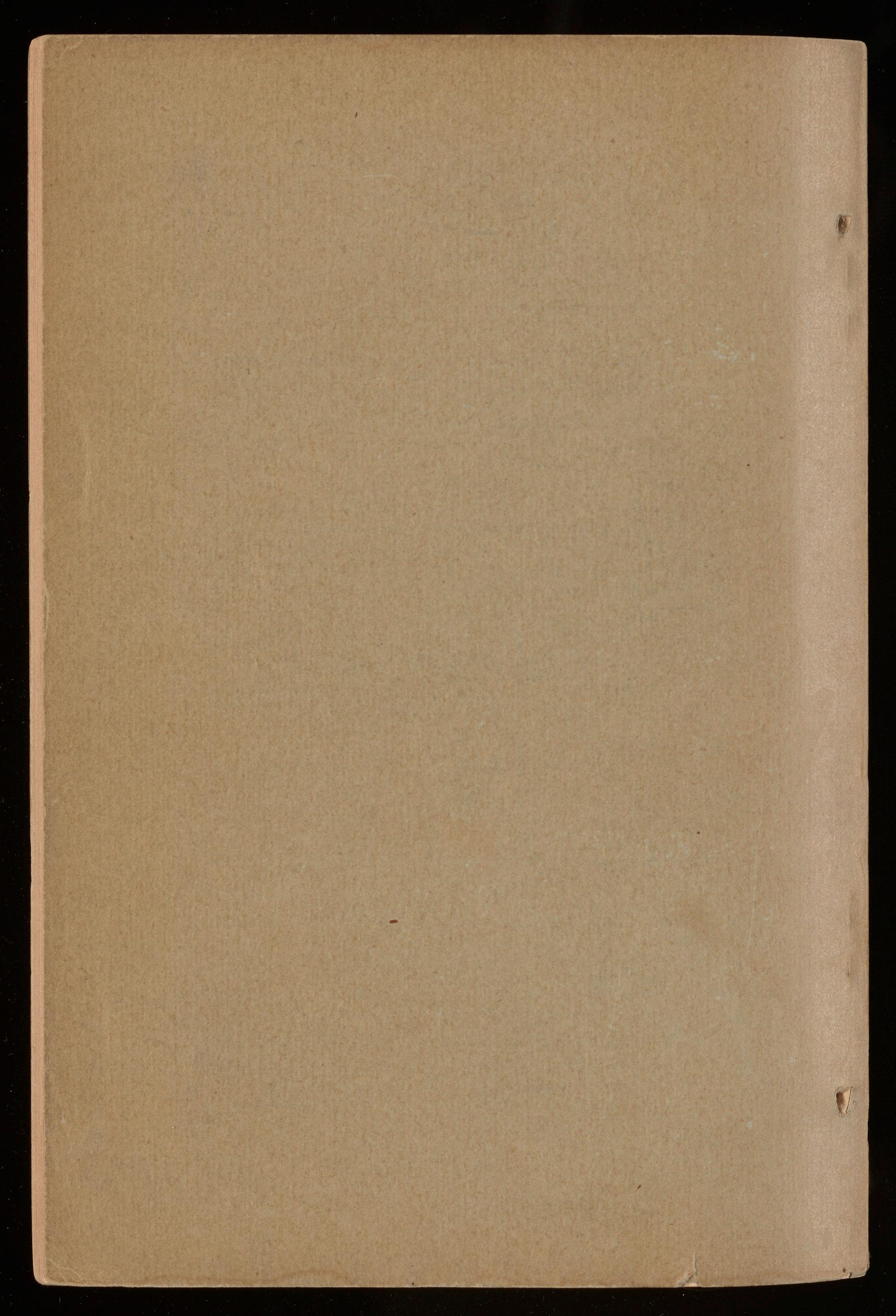








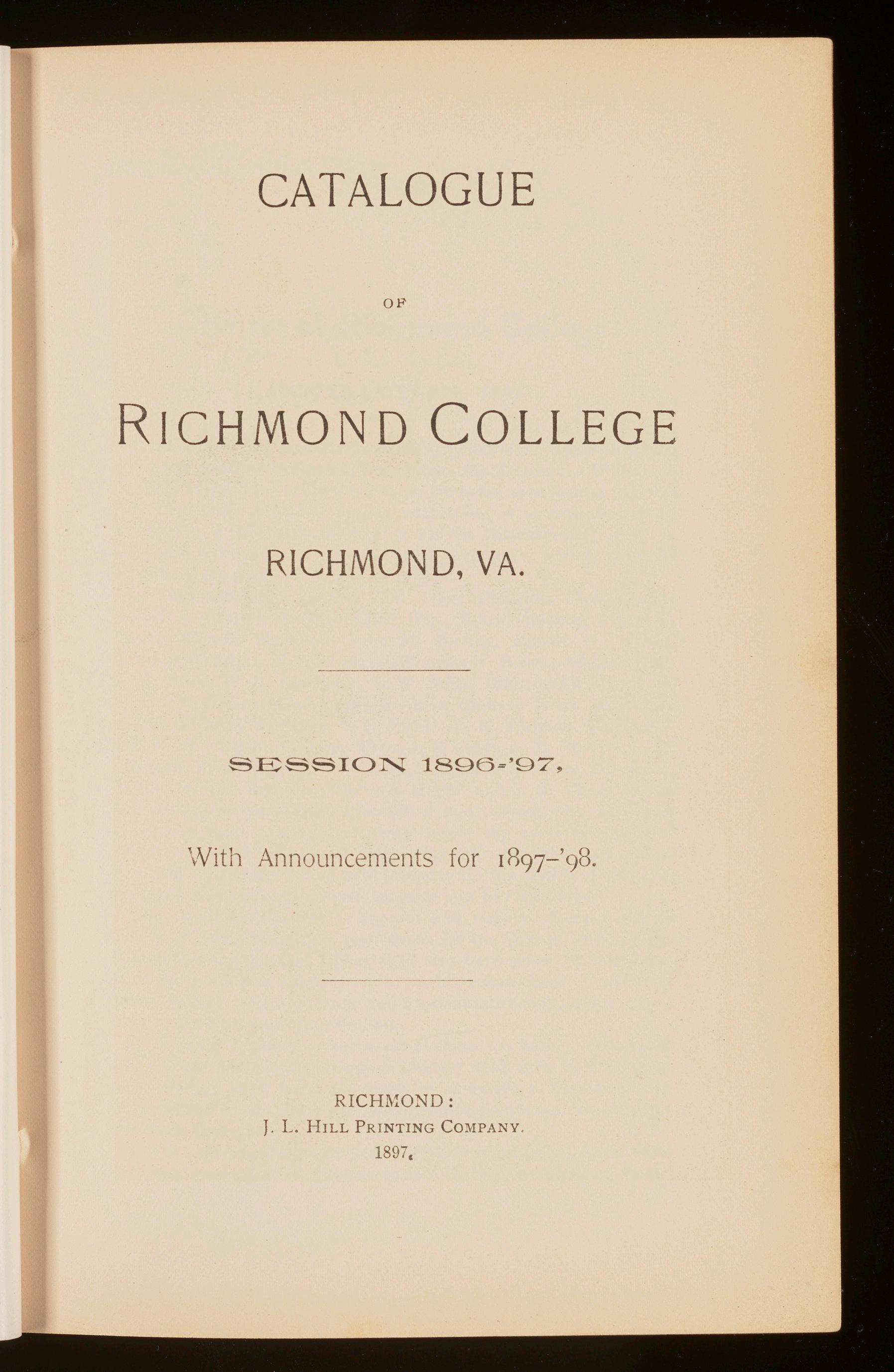
SESSION 1896='97, \Vith Announcements for 1897-'98.
RICH1\10ND: J. L. HlLL PRINTING COMPANY 1897,
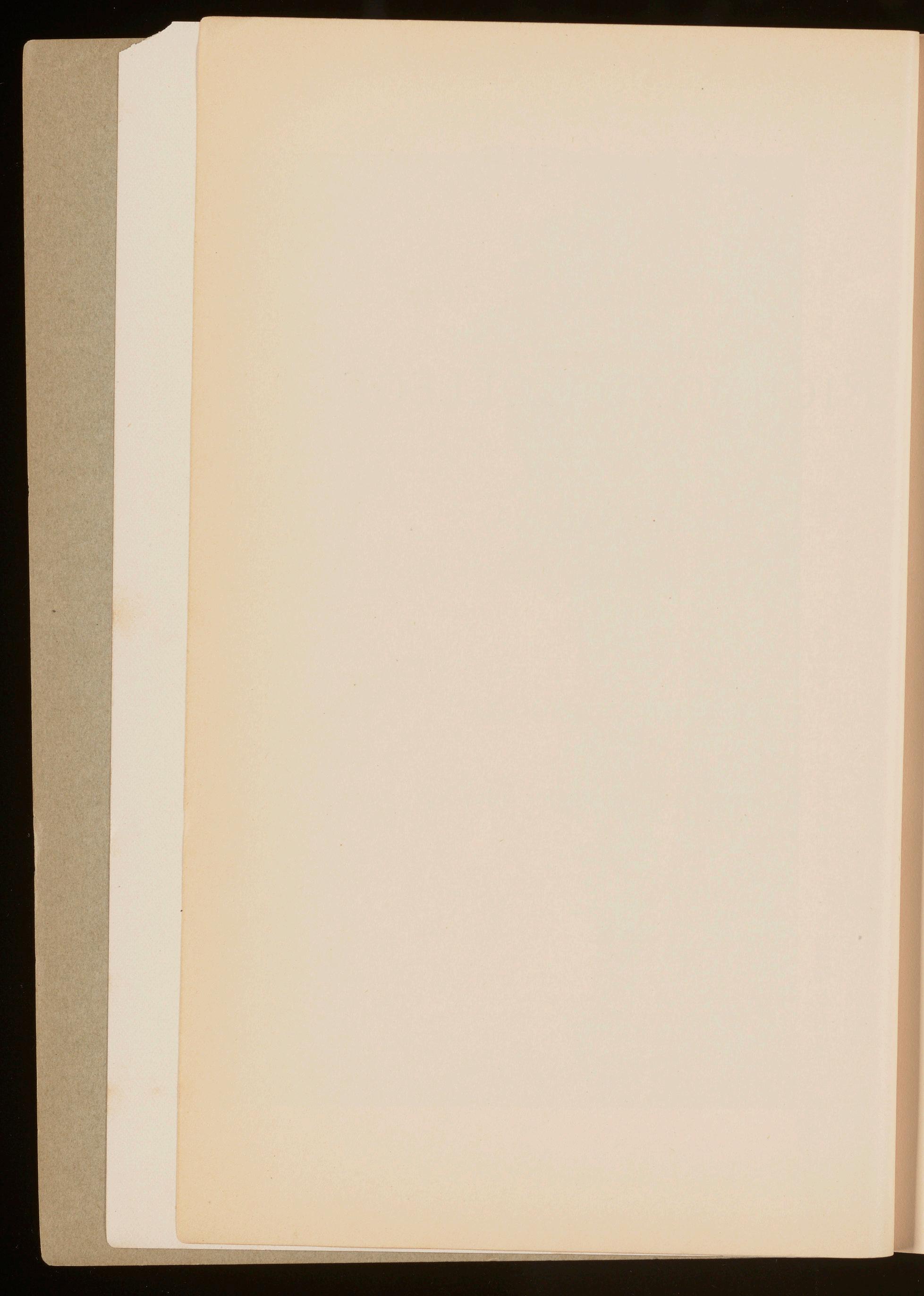
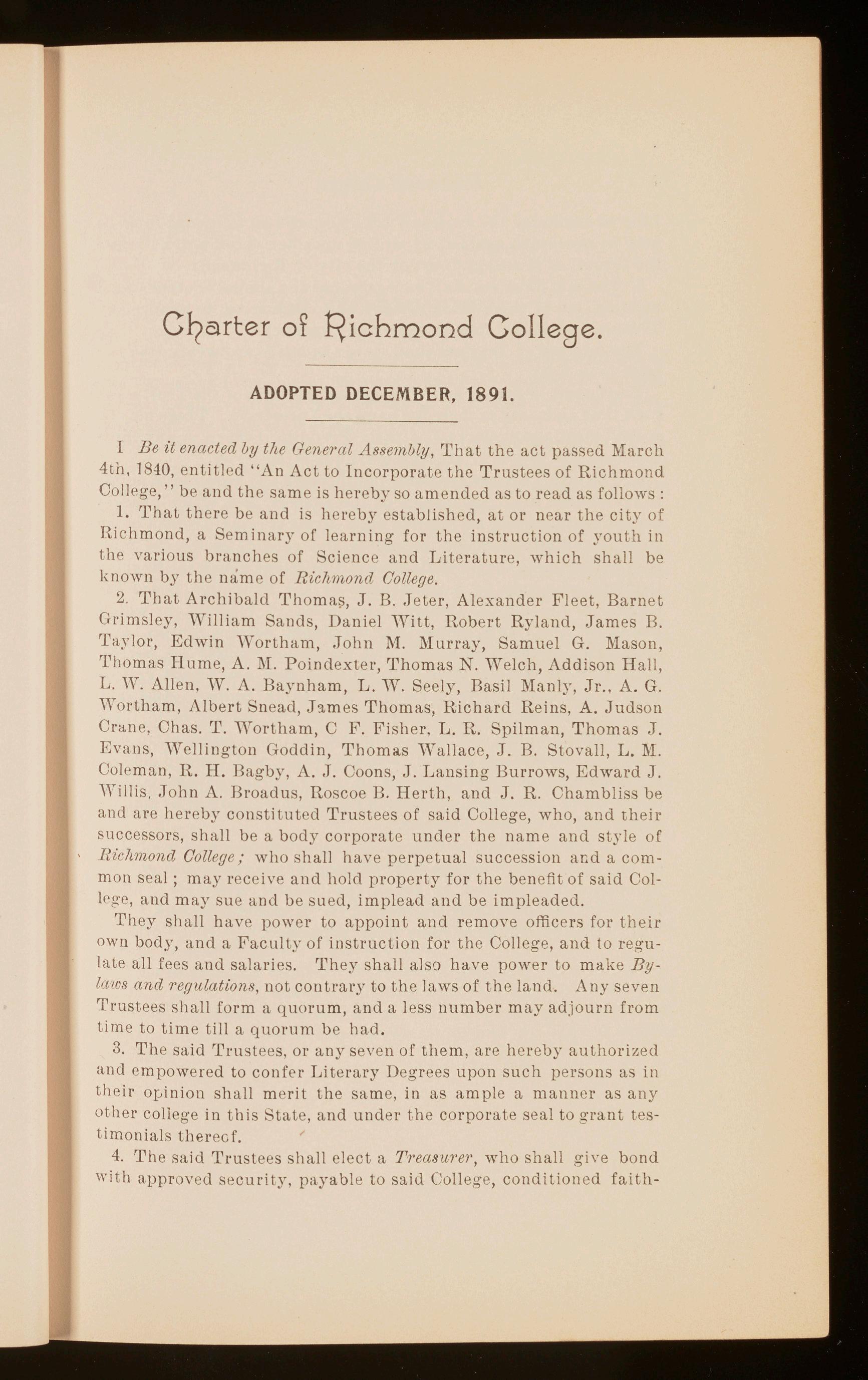
ADOPTED DECEMBER, 1891.
Be it enacted by tlte General Assembly, That the act passed March 4th, 1840, entitled "An Act to Incorporate the Trustees of Richmond College," be and the same is hereby so amended as to read as follows:
I. 'l'hat there be and is hel'eby established , at or near the city of Richmond, a Semina!'y or learning for the instruction of youth in the various branches of Sciencp and Literature, which shall be known by the name of Richmond College
2. That Archibald 'l'homa~, J. B. Jeter, Alexander Fleet, Barnet G!'imsley, \Yilliam Sands, Daniel ·Witt, Robert Ryland, James B. Taylor, Edwin 1Yortham, John M. Murray, Samuel G . Mason, 'l'homas Ilum e, A. l\I. Poindextel', Thomas N. ·welch , Addison Hall, L. W. Allen, W. A Baynham, L. W. Seely, Basil Manly, Jr., A G. 1Yortham, Albert Snead, J3.mes Thomas, Richard Reins, A. Judson Crane, Chas. T. TVortham, C F. Fisher. L. U. Spilman , Thomas J. Evans, 1Yell in gton Goddin , Thomas 1Yallace, J. B. Stovall, L. M. Coh•man, R. H. Bagby, A. J. Coons, J. Lftnsing Bu rr ows, Edward J. 1Yillis. John A. Broadus, Roscoe B. Herth, and J. R. Chambliss be and are hereby constitutrd Trustees of said College, who, and their successors, shall be a body corporate under the name and style of Rfrlimond College; who shall have perpetual succession ar.d a common seal; may receive and hold property for the benefit of said College, and may sue and be sued, implead and be impleadell.
'l'liey shall h,tv e power to appoint and remove officers for their own body, and a Faculty of in struction for the College, and to regulate all fees and salaries. 'l'hey shall also have power to make Bplrt1osrind regulrttions, not contrary to the laws of the land. Any seven Trustees shall form a c1uorum, and a less number m ay ad,iourn from time to time till a quorum l>e had.
3. The sa id 'l'mstees, or any seven of them, are hereby authorized and empowe r ed to confer Li tera ry Degrees upon s u ch persons as in the ir or,i nion s hall merit the same, in as ample a manner as any other college in this State, and under the corpornte seal to zrant testimonials therecf.
4. The sa id 'l'rustees shall elect a Treasurer, who shall giYe bond with approved security, payable to said College , conditioned faith-

4 Richmond College. fully to discllarge the duties of his otlice, and on failure so to do he may be proceeded against, by motion upon ten days' notice, before the Circuit or Hustings Court of the city of Richmond.
5. rrhe said Trustees shall have power at any annual or other stated meeting, ten of them being present :rnd concurring, to remove any Trustee, and ttt any time to supply any vacancy.
The number of Trustees shtLll never be less than twenty-four nor more than forty.
There shall be annual and othrr stated meetings of the Trustees at such time and place as their By-Laws shall prescnbe. '.l'here may be special meetings at the call of their Presiding Officer, or any three Trustees, due notice of all such meetings being given.
6. The said 'l'rustees are hereby authorized and required to admit to instruction i-n all the classes of the College, free of all charges except board, and in <Lilrespects upon terms of equality with other students, all ministers and preachers and candidates for the ministry belonging to the denomination of Christittns called the Regular Baptists, who may be recommended by the Educati~n Board belonging to the Baptist General Association of Virginia, in which Board all the rights, properties, privileges, powers, duties, and obligtLtions of the Virginia Baptist Education Society are hereby declared to be vested. And said Tn1stees may also admit gratuitously such other students as they may think proper. And said Trustees may receive donations, bequests, and devises, or in their discretion purchase and hold property, real and personal, in any county or corporation of this Common wealth, ttnd use and co11trol the same for educational purposes, in the founding and maintaining of schools or academies, under such rnles and regulations as may be prescribed by the said 'rrustees.
7. All rights, claims, privileges, and appurtenances now belonging or any wise pertaining to "the J.'rw,tees of Richmoncl College,'' as heretofore incorporated by act of the General Assembly, passed March 4, 1840, are hereby transferred to "Richmond College. '
II. Th is act shall be in force from its passage.

Attention is called to the conservative financial management of the College and the consequent safe foundation upon which it rests. Its real estate is without encumbrance. No bequests have been lost . Special trusts have been carefully p rotected
Those who are disposed to help its educational life may find in these facts encouragement to g i ve l ibe r a lly of thei r means. The College is undoubtedly in the very best condition to guarantee security and to render all trust funds immed iately effective.
Appeal is made espe0ially for the stn ·ngthe n ing of the general endowment This fund is used directly fo r the s u pport of teachers, and is not suf li c ient for the o r d in ary dema nds of the Institution. 'l'he endowment of sepa r ate schools, or u n designated gifts whi0h shall increase the ge n eral fu n d, are g r eatly des i red.
'J'he Trustees are anxious to enla r ge the sc ientific equipment, to establish a School of History , to endo w a Bible Department, to increase their Aid Funds for needy students . T he day h as come when demands are pressing for broad and generous equipment on every line of college w o r k The field of choice for g ivers is wide, and eYeryone who is blessed of God with means should seriously consider how His 0ause may be best p r omoted thro u gh Chr istian education. There is nothing more endu ri ng than the well-endowed college, and na::nes linked with it will never die.
"I give and de\ ise to Richmond College, located at Richmond, Yi rgi n ia, the following real estate, to -wit (he r e clesc1·ibethe s,iid 1·eal estnte, a .. to kind, quantity, and situation). ·
"I also give and bequeath to the said College the sum of , • , • dollars ($ . ), and the following bonds (or stocks) , to -wit there describe the bonds or stocks), all of which are to be used for the following purposes, to-wit (here desc1·ibe tlte purpose Joi· which it shall be applied)."
WILLIAM E, HATCHER , D, D ., PRESIDENT.
H on. J. TAYLOR ELLYSON , Y ICE-PRESIDENT.
CHARLES H. RYLAND , D . D.,
RKCORDING SECRETARY, FIXANCIAL SECRE'l'AHY, A:ND THEA~UHEH.
T. H. ELLETT , Esq ., At:DITOH.
JOSIAH RYLAND, Esq.. • . Richmond
MAJOR A. R. COURTNEY•
J. CHRISTIAN, LL. D . ..
W. E. HATCHER, D. D ..
A. E. DICKINSON,D. D ..
JOHN C. WILLIAMS, Esq ..
J. R. GARLICK, D. D ..
UH.RYLAND,D.D ..
COL. W E. TANNER , ,
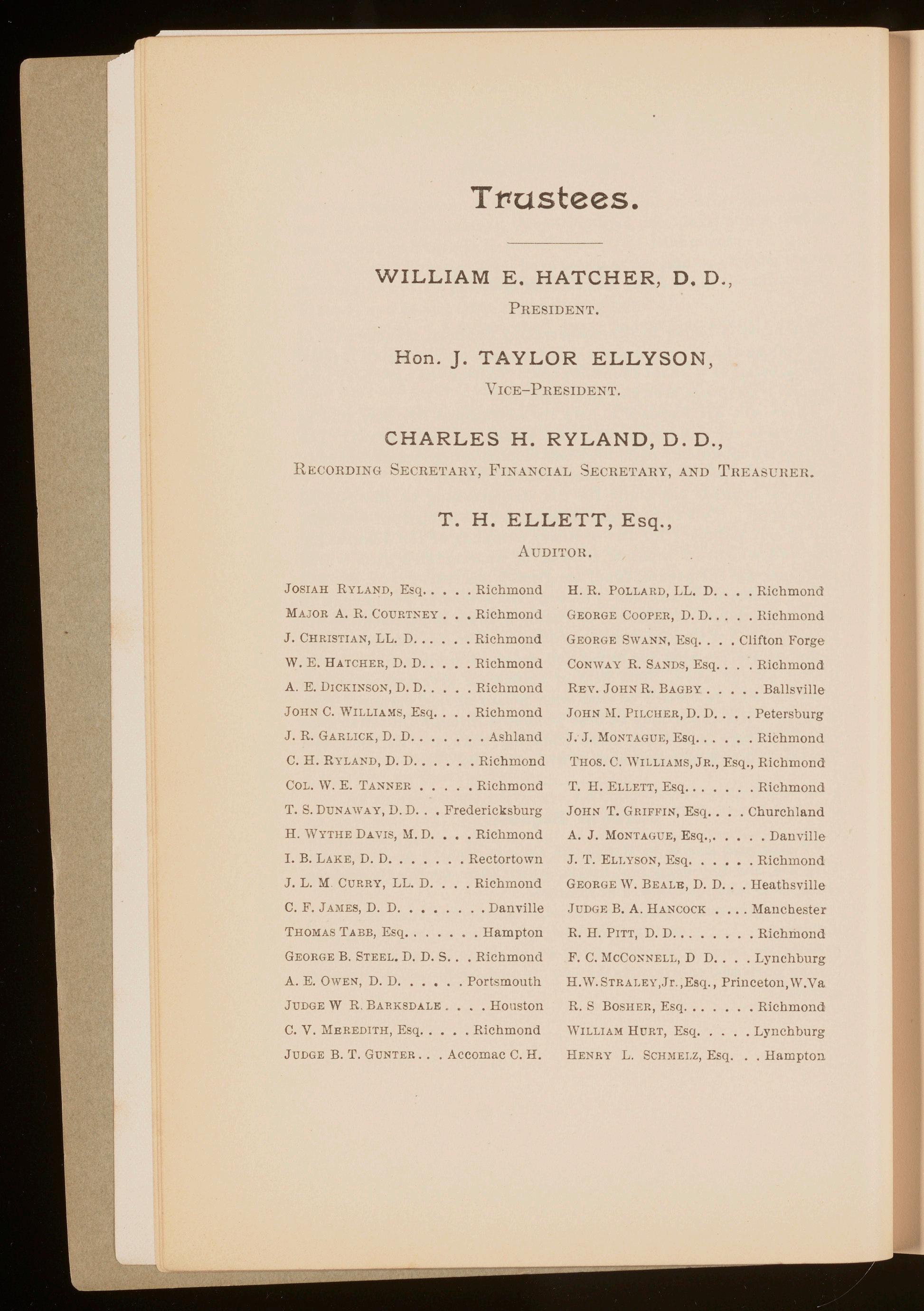
• Richmond
. Richmond
. Richmond Richmond
Richmond
•. Ashland
• Richmond
• Richmond
T. s.DUNAWAY,D. D .. • Fredericksbnrg
1-I. WYTHE DAVIS, M. D. •• • Richmond
I. B. LAKE, D. D•. . .... Rectortown
J L. M CURRY, LL. D .... Richmond
C. F. JA)IES, D. D .• •• .... Danville
THOMASTABB, Esq •. •. Hampton
GEORGEB. STEEL D. D. s... Richmond
A. E. OWEN, D. D .. .•. Portsmonth
JUDGE w R. BARKSDALE .• . 1-Ionston
c. V. MEREDITH, Esq ..• . Richmond
JUDGE B. T. GUNTER... Accomac C.H.
H. R. POLLAitD, LL. D. . Richmond
GEORGE COOPER, D. D Richmond
GEORGE SWANN, Esq ... Clifton Forge
CONWAY R. SANDS , Esq Richmond
REY. JOHN R. BAGBY •. Ballsville
JOHN :\I. PILCHER, D. D ..• Petersburg
J. J. MONTAGUE,Esq ....• Richmond
Tuos. C. " "ILLIAMS,JR , Esq., Richmond
T. 1-I. ELLETT, Esq .. Richmond
JOHN T GRIFFIN, Esq ... . Church land
A. J M ONTAGUE, Esq., .
J. T. ELLYSON, Esq .. .. Danville Richmond
GEORGE w. BEALE , D. D . . lleathsville
JCDGE B. A. HANCOCK .. Mancbester
R. H. PITT, D D. • . . . .. Richmond
F. C. McCOl>NELL, D D ... Lynchburg
1-I.W.STRALEY,.Jr.,Esq., Princeton, W Va
R. s BOSHER, Esq . Ricbmond
WILLIAM HURT, Esq ..... Lynchburg
HENRY L SCH)tEI.z, Esq .. Hampton
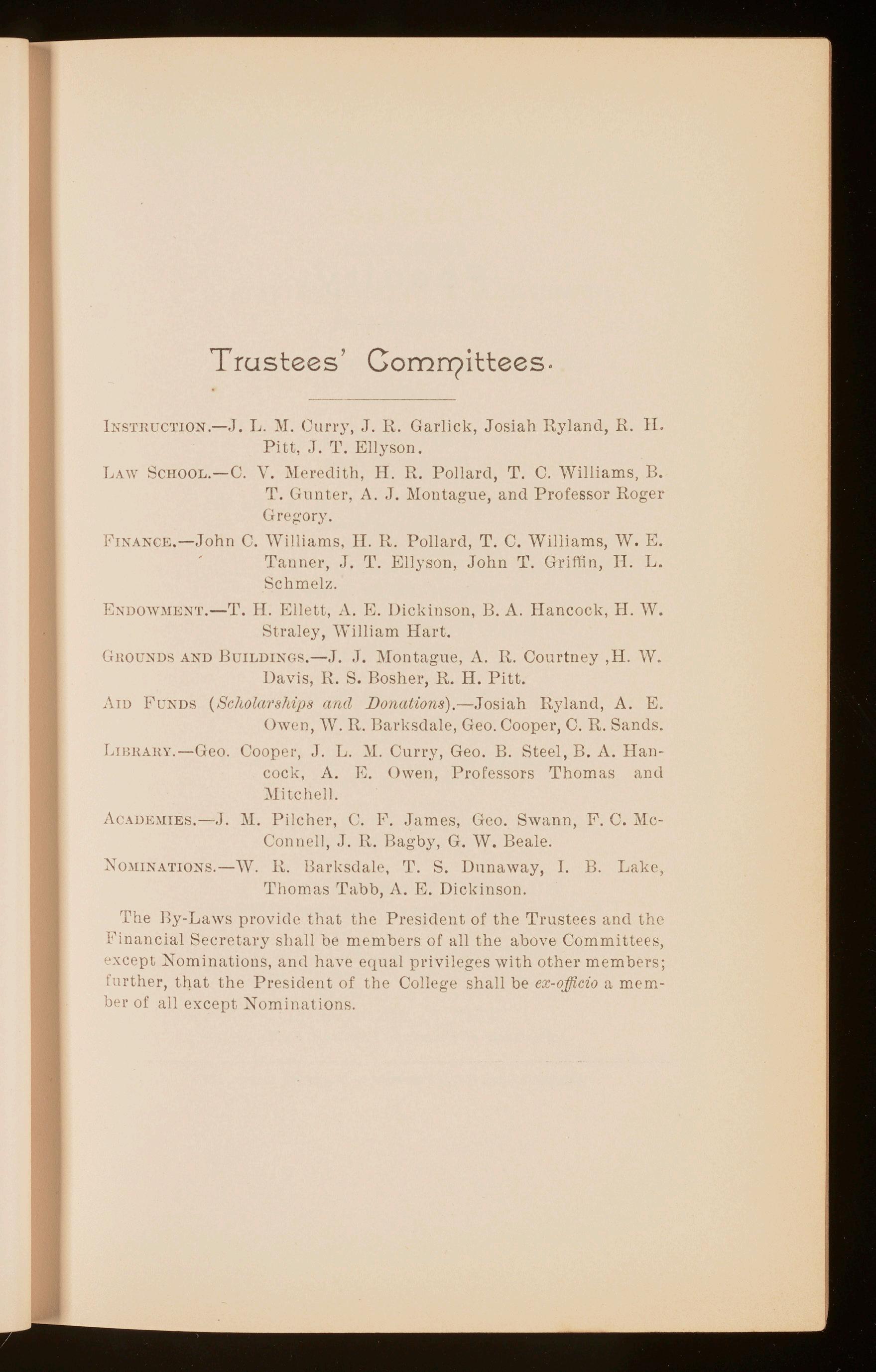
INSTHCC T ION. - J. L. :u. Cuny, J. R. Ga r lick, Josiah Ryland, R. H . Pitt, .T '1'. Ellyson
LAW ScnooL. - 0 . V . :\l ere<lith, H. R. Pollard , T. C. Williams, 13. T Uunter, A . .J Mon t ague , and Profe ssor Roger Gre;:rory.
FrxANCE.- John 0 . W illiams, II. R. Polla r d, T . 0 . Williams , W . E. Tanner, J 'l' Ellyso n , John T Griffin , H. L. Schmelz.
E:-sDOW)IENT .- 'l'. H. Ellett,.\ . E. D ickinson, B. A. Hancock, H. W. Strnley , "\Yilliam Hart .
UuouxDs ANDBur LDtNG~.-J. J :\Iontag u e, A. R. Cou rt ney ,H. "\V. Davis, H. 8 . Basher , R. H . Pitt.
Arn FUND~ (ScholarsluJJs rtncl D orwtions) -.Tosiah Ryland, A. E. OwPn, "\V. R. Barksdale, Geo . Coope r, 0 . R . Sands.
LrnHAHY. - Geo. CoopP1·, J . L. :\I. Cur r y, Geo. B . Steel , B . ,\. Hancock, A. K Owen, P r ofessors Thomas and :\Ii tc he II.
AnDE)lIE:5.-,J. :\l. Pilcher, C. F. J;imes, Geo. Sw ann, F. C. ;\JcConnell , .J R Bagby, G. W . Beale
Xo ,uNATIONs.-, V. R. Barksdale, 'l' S Dnnaway , I. B. Lakr , Thomas 'l' r,bb , A E Dickinson.
'l'he By -L;i w s provide that the President of the Trustees and thl ' Financial Secretary shall be members of all the ,tbove Committees, L·xcept )rominations, and h,ne equal privileges with other members; fn rthe r , that the P r esident of the College shall be e.r.-ojficioa memb er of all except :;-.;rominations.
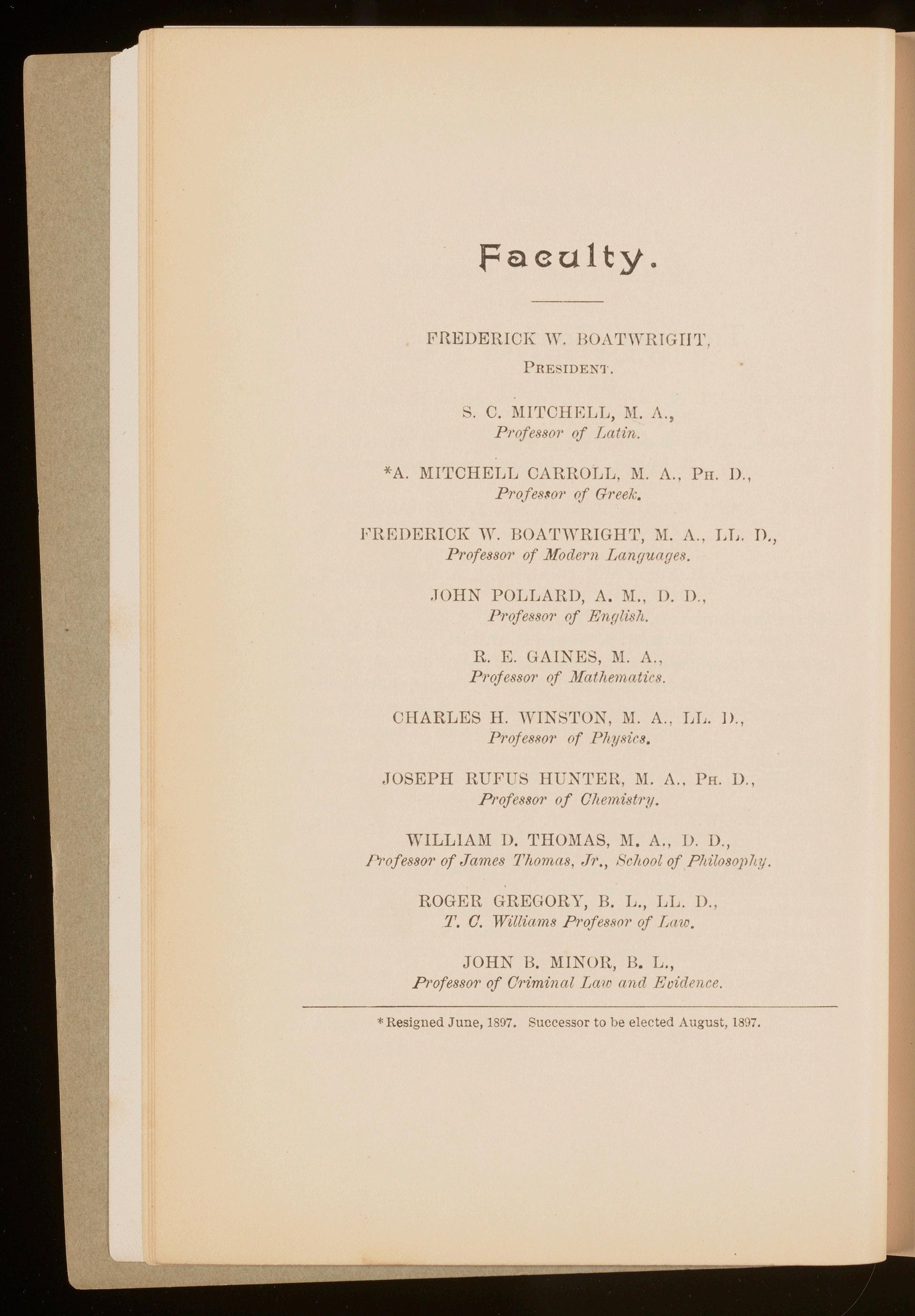
FREDERICK W. BO,\T""RIGfl'l'. PRE~TDEK1.
::->.0 . l\ll'l'CHELL, M. A., Professor of /,a/in.
*A. MITCHELL CARROLL, M. A., Pn . D ., Pl'ofe.~.•or of Greek,
FREDERICK W. BOA' L ' \\ 'RIGH'l', l\I. A., LL. n ., Professo1· of Moclern Langurrges
.JOHN POLLARD, A M., D. D., Professm· of En[!lish.
R. E. GAIKES, M A. , Projesso1· of .Matltemntics.
UHARLES H \ YINS'l'ON, M. A. , LL. l >., Projesso1· of Plt!J8ics•
.JOSEPH RUFl'S HUX'l'ER, 1\1. A .. Pn. D., P rofesso1· of Cltemist171.
\ YILLIAM D 'l'HOMAS, 1\1. A., U. D , I~·ofesso1· of James Tlwnws, ,fr., 8clwol of Pltilos oplt ,/f
ROGER GREGORY, B . L., LL. D., T . C. Williams P rofesMn· of L!lw.
JOHN B. MIN OR, B L , P l'ofess01·of Criminal Law and Bviclence.
* Resigned June, 1807. Successor to be el ected August , 1897
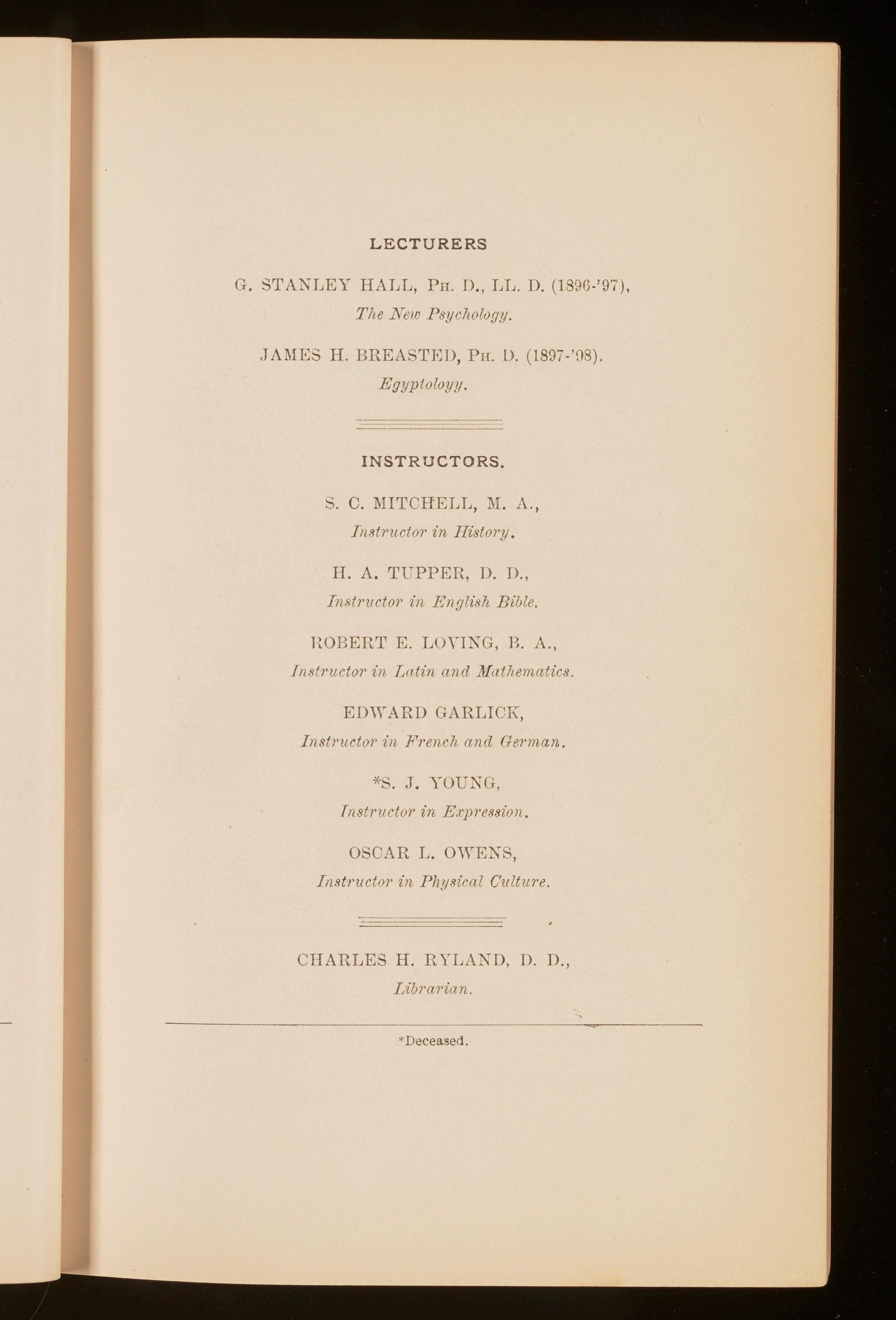
G. STAKLEY HALL, Pn. D. , LL. D. (1896-'97), The New Ps!!rltolo[J!J
.JAMES H. BREASTIW, Prr. D. (1897-'()8). Eg!Jplolo!Jlf.
INSTRUCTORS.
S. 0 :MITCHELL, )I. A., In8/nirtoi· fn J[istory.
H. A . Tl"PPER, D. D., In.~tructor in English Bible.
lWBER'r E. LO\TNG, B A., Instructor in L!ltin and Matl1ematics.
EDWARD GARLICK, Instructor in F'renclt and German.
*S. J . YOUXG, fnstruc/01· in E.t1Jression.
OSCAR L 0'\1EXS, Instructor in Ph1;sirnl Culture.
CHARLES H. RYLAND, D. D., Librarian.
'Deceased.

College Calendar . ::-;ESSIO~ 18!)7-'98.
1897- 7'/wrulay, Septeinbcr 2Jcl-Open i ng of the Session.
1898-Tuescln.11, Peln•1utr,118th-Beginning- of Second Ifalf-Sl'ssion.
Tuesda.11, Pe/J,•ua,-y Sth-Scmi-;urnual :\lee ting of the Trustee~.
Sunday, .Jane 19t1t-Commcncemcnt Sermon.
Monday, June ."Utlt - Celebration of Literary Socirties.
Tuesday, .June 21st-Annu,tl :\IeeLinir o( the 'l'rnstees.
Wednesd,cy, .June ! !cZ - ,\nnual :\Ieeting o( .\lumni.
1'/rnrsday, .June .:J1l- Closine\· E.wrcist·s
omnmxcE1rn:-:;T 1s97_ Commencement Sermon preached by 1V. 'l'. Chase, D. D. of Philadelphia.
Alumni Danr1uet, Hon. J. ,\lston C:ibl'll, of Hichmond, presiJing.
Lat.-Latin Grk.-Greek. Fr.-French. Hist.-Ilistory.
Abbitt, Benjamin B., Abrnham, John B., Arthur, Philip A.
Bacheldor , Cnyler \V., Bagby, A. Paul, B.iiley, Chiules L. Barksdale, Charles C , Bidgood, \V. Gary, Binsw<Lnger, Ralph A. B!oxton, Benjami n, Booth, ·waiter L., Boschen, Albert 0., Howden, John T., Jr ., Brown, Edward R.
ABBREVIATIONS.
Ger.-German. Eng.-English. Math. -M atbematics. Exp.-Expression,
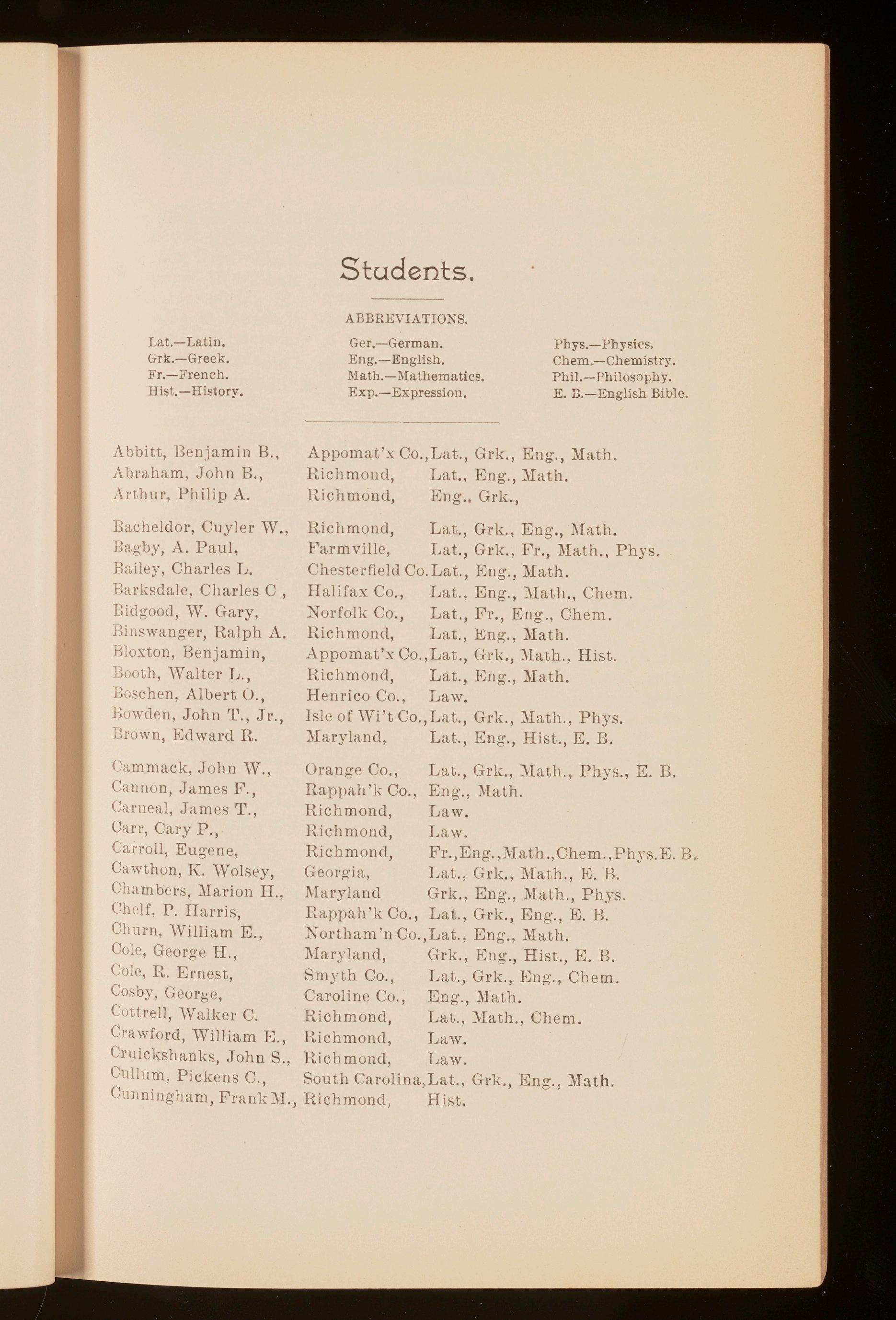
Pbys .- Pbysics. Cbem. - Cbemistry. Pbil.-Pbilosopby. E. B.-Englisb Bible.
Appomat'x Co.,Lat., Grk., Eng ., Math. Richmond, Richmond, Lat Eng., l\Iath. Eng . Grk.,
Richmond , Lat., Grk., Eng., l\Iath. F'armville, Lat., Grk., Fr., :Math., Phys. Chesterfield Co.Lat., Eng., l\Iath. Halifax Co., Lat., Eng., }Iath., Chem. Xorfolk Co., Lat ., Fr., Eng., Chem. Richmontl, Lat., 1£ng-.,l\Iath. ,\ppomat'xCo.,Lat ., Uric, l\Iath., Hist. Richmond, Lat., Eng., }fath. Henrico Co., Law.
IsleofWi'tCo.,Lat ., Grk., l\Ia,th., Phys. }Iaryland, Lat., Eng. , Hist. , E. B.
Camnrnck, John \V., Orange Co ., Lat ., Grk., }Iath., Phys., E. n. Ca1Jnon, James F . , Rappah'k Co., Eng., }Iath. Carneal, James T., Richmond, Law.
Can, Cary P., Richmond, Law.
Carroll, Eugene, Richmond, Fr.,Eng . ,}Iath.,Chem . ,Phys .E. B. Cawthon, K. \Volsey, Georgia, Lat., Grk , }Iath., E. B. Chambers , hlarion H ., l\faryland Grk., Eng., l\Iath., Phys.
Chelf, P. Harris, Rappah'k Co. , La,t., Grk ., Eng., E. B. Churn, ·Willi,im E., ~ortham'n Co. ,L at., Eng , l\Iath.
Cole, George H., Maryland, Grk ., Eng., Hist., E. B. Cole, R. Ernest, Smyth Co , Lat., Grk., Eng., Chem. Cosby, George, Caroline Co., Eng., lfath.
Cottrell , Walker C. Richmond , Lat., }Iath., Chem.
Crnwford, ·William E., Uichmoncl, Law.
Cruicksh:mks, John S., Richmond, Law.
Cullum, Pickens C. , South Carolina,Lat , Grk., Eng., l\fat h. Cunningham, Fr:wkl\L, Richmond, Hist
12 Ricltmond College.
D,wghtry, ,v. Bonnie, Isle of W't Co., Grk., Eng., Exp., Hist., E. B. Jhvis, Charles C., Caroline Co., Lat., Grk., Math., E. B. Davis, John T., Portsmouth, Lat., Grk., Math. Da.vis, "'illiam H., .Jr., Norfolk, Lat., En !!., Math. Dea.n, Claude 1\1., Petersburg, Law.
DParing, ,villiam G., Rappah'k Co., Grk., Ger. DeCamp, Stanley, Richmond, Law.
DcCamps, Christie .T.B., South Cal"Olina,Lat., Eng., Phil.
DrYault, Samuel P., Tennessee, Eng., Phys., Phil. Dill, J. Murray, Richmond, Law. Drew, Leslie H., Richmond, Law.
Driscoll, Herbert S, l\fontgom 'y Co.,Lat., Grk., Fr.
Durham, James "T·• Essex Co., Lat., Grk., Eng., l\lath., E. B.
Edmond, Marion, Edwards, Willis ,v., Egbert, Harry C., Eggleston, .fames H., Eggleston, John S., English, Edgar B., Entns, ,vallace R.,
Fisher, S. Hoffman, Fleming, Louis, Firming, Sanford, Fletcher , William G. Foster, ,v. Brownley, Frnzer, Goodwin, Frazer, John D., Freeman, Allan ,v., Fugate, Henly l\L,
Garlick. J<}dward, Garnett, Robert S., Garrett, J. Alfred,
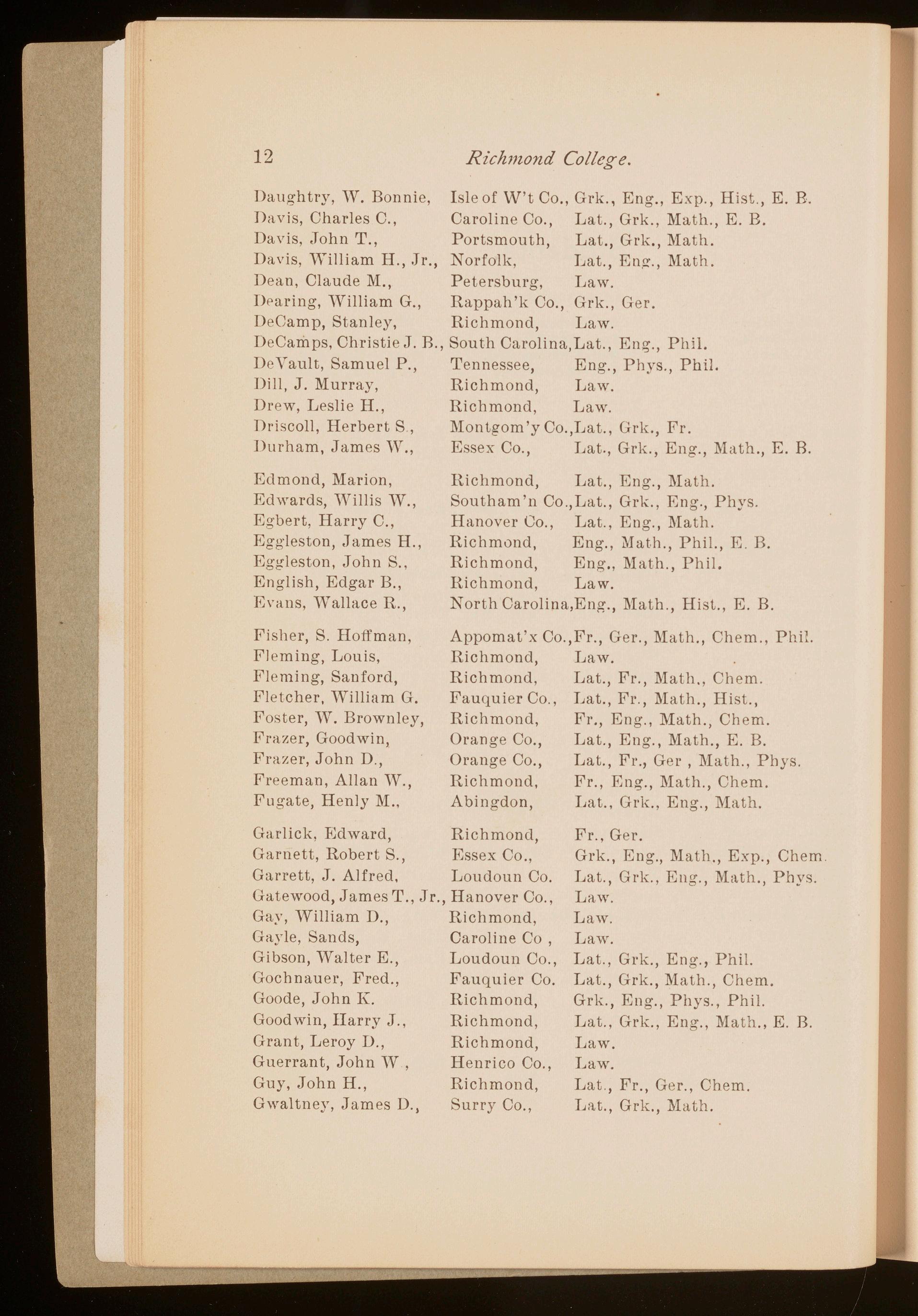
Richmond, Lat., Eng., l\Iath. Southam'n Co.,Lat., Grk., Eng., Phys. Hanover Co., Lat., Eng., Math. Richmond, Eng ., i\Jat,h., Phil., E. B. Richmond, Eng., l\lath., Phil. Richmond, Law. North Carolina,Eng., Math., Hist., E. B.
Appomat'x Co.,Fr., Ger., l\1ath., Chem., Phil. Richmond, Law. Richmond, Lat., Fr., Math., Chem. Fauquier Co., Lat., Fr., Math., Hist., Richmond, Fr., Eng., Math., Chem. Ornnge Co., Lat ., Eng., Math., E. B. Orange Co., Lat , Fr., Ger, l\Iath., Phys. Richmond, Fr., Eng., l\lath., Chem. Abingdon, Lat., Grk., Eng., Math.
Richmond, Essex Co., Loudoun Co. Fr., Ger. Gatewood, JamesT., Jr., Hanover Co., Grk., Eng., l\lath., Exp., Chem. Lat., Grk., Eng., l\Ltth., Phys. L.tw.
G,L_\',,vmiam D., Richmond, Gayle, Sands, Caroline Co, Gibson, ,valter E., Loudoun Co., Gochnauer, Fred., Fauquier Co. Goode, John K Richmond, Goodwin, Harry J., Richmond, Grant, Leroy D., Richmond, Guerrant, John ,v, Henrico Co., Guy, John H., Richmond, Gwaltney, James D., Surry Co., Law.
Law.
Lat., Grk., Eng., Phil. Lat., Grk., Math., Chem. Grk., Eng., Phys., Phil. Lat., Grk., Eng., Math., E. B. Law. Law. Lat., Fr., Ger., Chem. Lat., Grk., Math.
Hall, Arthur J., Hancock, Frank H., Harlow, Archie C., Harrison, Henry J., Hart, Joseph L , Hartley, D. Peyton, Hartman, B. Mercer, Hellstern, Simon, Hening, Kennon, Hicks, Joseph E., Holland, Emmett D., Hntchison, Ben'.i 0., Hurt, John J.,
Johnson, John E., .Johnson, John R. L., Johnston, Carter D., Jones, Allan D., Jones, Charles P., Jr., Jones, John ,v., Jordan, Fletcher, Kaufman, John B.,
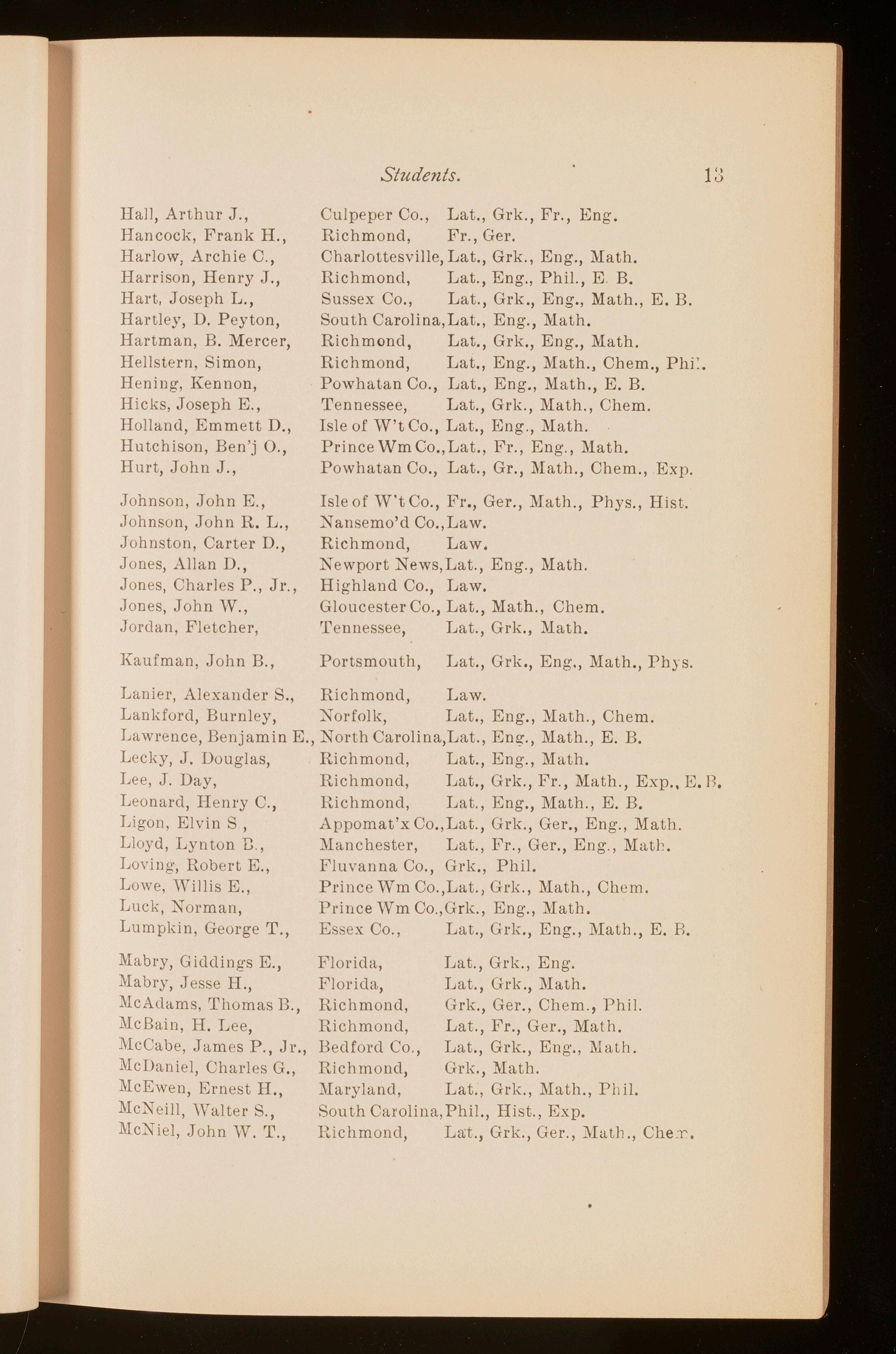
Students. 18
Culpeper Co., Lat., Grk., Fr., l<~ng. Richmond, Fr., Ger.
Charlottesville, Lat., Grk., Eng., Math. Richmond, Lat., Eng., Phil., E. B. Sussex Co., Lat., Grk., Eng., Math., E. B. South Carolina,Lat., Eng., Math. Richmond, Lat., Grk., Eng., Math.
Richmond, Lat., Eng., Math., Chem., Phi'..
Powhatan Co., Lat., Eng., Math., E. B. Tennessee, Lat., Grk., Math., Chem. Isle of W't Co., Lat., Eng., l\Iath. PrinceWmCo.,Lat., Fr., Eng., l\lath. Powhatan Co., Lat., Gr., Math., Chem., Exp.
Isle of W't Co., Fr., Ger., Math., Phys., Hist. :Nansemo'd Oo.,Law. Richmond, Law. :i'i:'ewportNews,Lat., Eng., Math. Highland Co., Law. Gloucester Co., Lat., Math., Chem. •rennessee, Lat., Grk., Math.
Portsmouth, Lat., Grk., Eng., Math., Phys.
Lanier, Alexander S., Richmond, Law.
Lankford, Burnley, Xorfolk, Lat., Eng., Math., Chem. Lawrence, Benjamin E., :North Carolina,Lat., Eni;r., Math., E. B. Lecky, J. Douglas, Richmond, Lat., Eng., Math. Lee, J. Day, Richmond, Lat., Grk., Fr., Math., Exp., E. n. Leonard, Henry C., Richmond, Lat., Eng., Math., E. B. Ligon, Elvin S, Appomat'x Co.,Litt., Grk., Ger., Eng., Math. Lloyd, Lynton D., Manchester, Lat., Fr., Ger., Eng., l\fatb. Loving, Robert E., Fluvanna Co., Ork., Phil. Lowe, ,villis E., Prince vVm Oo.,Lat., Grk., Math., Chem. Luck, Norman, Prince \Vm Co.,Grk., Eng., Math. Lumpkin, George T., Essex Co., Lat., Ork., Eng., l\lath., E. R.
Mabry, Giddings E., Mabry, Jesse H., McAdams, 'rhomas B., McBain, H. Lee, McCabe, J.tmes P., Jr., McDaniel, Charles G., McEwen, l~rnest H., l\lcNeill, "ralter S., McXiel, John W. T.,
Florid:t, Lat., Grk., Eng. Florida, Lat., Grk., l\Iath. Richmond, Uric, Ger., Chem., Phil. Richmond, Lat., Fr., Ger., Math. Bedford Co., Lat., Grk., Eng., l\lath. Richmond, Grk., Math.
l\Iaryland, Lat., Grk., Math., Phil. South Carolina,Phil., Hist., Exp. Richmond, Lat., Grk., Ger., :\luth., CheT.
14
Marlin, Henry, Martin, ::\Ielvin A., J\lason, George F., ::Uercer, J. Herbert, J\Iitchell, J. Douirlass, J\lobley, .'iYilliam A., 1\lontague, Carroll H.
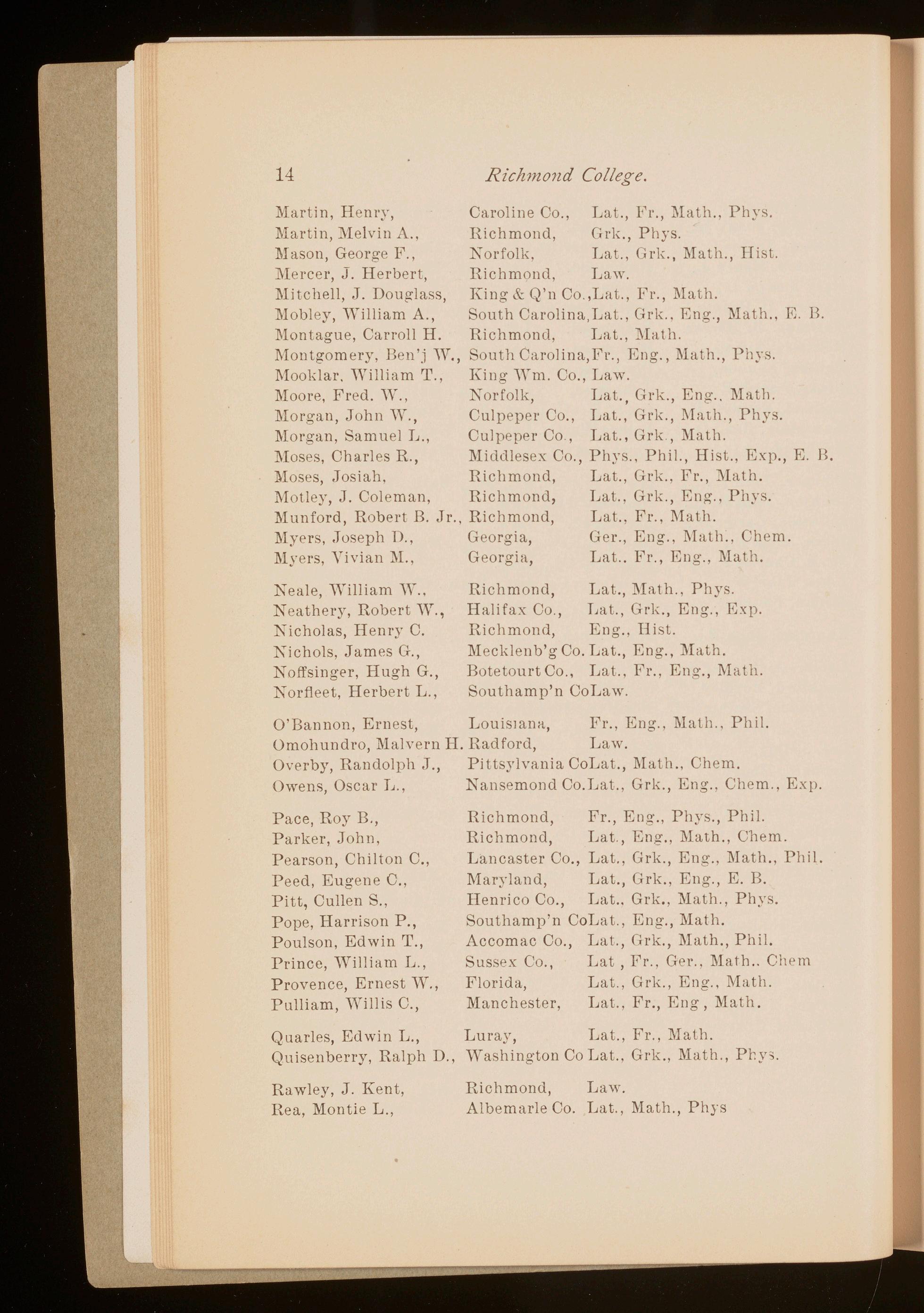
Richmoud College.
Caroline Co., Richmond, Kor folk. Lat., Fr., JI.lath., Phys . Ork., Phys. Lat., Grk., Math., Hist. Richmond, Law.
King & Q'n Co.,Lat., Fr., lllath. South Carolina.Lat., C:rk .. F:ng ., Math., Richmond, Lat., :\fath. l\1ontgomery, Ben'.i 1V., SouthC,uolina,Fr., Eng., lllath., Phys. J\fooklar. William T., King 1Ym. Co , Law.
J\Ioore, Fred. ·n-., Korfolk, Lat., Grk., Eng . . l\Iath. J\Iorgan, John"\\-., Culpeper Co., Lat., Grk., ;\lath., Phys. Morgan, Samuel L., CulpepPr Co, Lat., Grk, l\lath.
l\Ioses, Charles R., Middlesex Co., Phys., Phil., Hist., Exp., K B. l\Ioses, Josiah. Richmond, Lat., Grk., Fr., ::\fath . l\1otley, J. Coleman, Richmond, Lat., Grk., F,ng., Phys. Munford, Robert B. Jr., Richmond, Lat., Fr., l\Iath.
J\Iyrrs, Joseph n., Georgia, Ger., F:ng., J\Iath .. Chem. J\Iyers, YiYian ::'.I., Georgia, Lat .. Fr., F,ng., l\lath.
Neale, 1Yilliam 1L
Neathery, Robert 1Y., Kicholas, Helli·~· C. Nichols, James G., Noffsinger, Hugh G., Nor fleet, Herbert L., Richmond, Lat., l\fath., Phys. H:difax Co., Lat., G1·k., Eng., F:xp. Richmond, Eng .. Hist. J\Iecklenb'g Co. Lat ., Eng., Math. Botetourt Co., Lat., Fr., Ji;ng-., J\Iath. Southamp'n CoLaw.
O'l3annon, Ernest, Louisia1rn, Fr., Eng., J\Iath., Phil. Omohundro, l\lalvern H. Radford, Law.
O\·erby, Randolph .T., Pittsylvania CoLat., l\Iath., Chem. Owens, Oscar L., Pace, Roy B., Parker, John, Pearson, Chilton C., Peed, Eugene C., Pitt, Cullen S., Pope, Harrison P., Poulson, Edwin T., Prince, 1Yilliam L., Provence , Ernest 1Y., Pulliam, 1Yillis C.,
Nansemond Co.Lat., Grk., Eng .. Chem., Exp. Richmond, Fr., En!! , Phys., Phil. Richmond, Lat., Eng., l\lath., Chem. Lancaster Co., Lat., Grk., Eng- l\Iath., Phil. Maryland, Lat., Grk., Eng ., E. B. Henrico Co., Lat .. Grk., l\lath., Ph.vs. Southamp·n CoLat., Eng., l\lath. Accomac Co., Lat., Crk., J\lath., Phil. Sussex Co., Lat, Fr , Ger Mflth ChPm Florida, Lat., Grk., Eng., Math. Manchester, Lat., Fr , Eng, l\lath.
Quarles, Edwin L., Luray, Lat., Fr., Math. Quisenberry, Ralph D., 1Yashingto11 Co Lat., Grk., l\iath., Pr.y,.
Rawley, J. Kent, Rea, Montie L., Richmond, Law. Albemarle Co. Lat., Math., Phys
Students.
Reams, ".ilson K, Richmond, Lat , Eng., Math. Richardson, ,villiam L .,l<'ranklin Co , Lat , Grk., Eng., Math. Riddell, Eldridge V., Goochland Co., Grk., Eng., Math. Robertson, James C , l\Ianchester, Fr., Math., Chem. Robinson, Charles ,v., Sussex Co., Ger., Eng., Phil. Robinson, S Straughan, King '\Ym. Co., Lat ., Eng., Math. Hudd, Ash ton C., Chesterfield Co. Lat .. Fr .. Ger., l\1ath. Rudd, Wortley F., Chesterfield Co.Fr., Ger., Chem., Phil.
Sanford,' Harry B., Richmond, Lat., Math., Chem., Hist. Scrnggs, J. Pendleton, Fluvanna Co., Lat., Grk., l\Iath., KB. Seay,•"'· l\1osby, FIU\·anna Co., Lat., Grk., l\Iath., K B. Sheppard, Robert A., Richmond, Law.
Shumate, Frank T., ·west Virginia, Law.
Skipwith, George N., Richmond. Law.
Smith, Gilbert C., Korth Carolina,Lat., Grk., Eng., Math. Smith, William, Pittsylvania CoLat., Eng., Chem, Phil. Sowell, Sidney l\I., Fluvanna Co., Lat., Grk., l\fath., Phil. Spencer, Thomas n. E., King&Q'nCo.,Lat., Grk., Eng., Math. Stacy, George P., Richmond, Law
Sta,fford, .James R., Giles Co., Law.
Stainback, Berry, Richmond, Lat., Eng., l\Iath., Phys. Stone. Wilmot C., Henrico Co., Chem., Phil., Hist. Stonnell, Yester L., Richmond, Lat., Grk., l\Iath. Stuart, Chal'les E., Richmond, Eng., l\Iath., Phil., Exp. Sullivan, John A., Richmond, Grk., Eng ., Phil., Exp. Sweeny, James, Jr., Richmond, Ger., Eng., l\1ath., Phil.
Tabb, Benjamin "'·, 'l'aylor, Clarence E., Taylor, Hunter 1\1., Taylor, John M., Taylor, Jesse R, Temple, Thomas, Thomas, John B., 'l'hornhill, "'illiam A., Trader, Kortham W., Tucker, lVilliam C., Turner, Edward D., Turner, J. l\Iarshall, Yaidcn, Yollie, Yan Buren, Arthur B.,
"·alker, George D., ·wechrt, John C., Weinberg, Abraham I.,
Kewport News,Lat., Eng., :Hath. Maryland, Lat., l\1ath Phil., E. B. Richmond, Lat., Eng., l\Iuth., Hist,, Prince "'m Co.,Lat., Eng. l\Iath E. B. Alabama, Lat, Grk., l\1ath Phys. Prince Geo. Co.Law.
Russell Co , Lat., Grk., Eng., lllath. l\1anchestcr, Lat., Eng., !\lath., Chem. l\IailiewsCo., Lat,,, Eng .,~aili. R ichmond, Law.
'\Y,:,st Virginia, Lat, Eng., l\Iath. North Carolina Lat., Fr., Ger.
King ,Ym. Co., La"·· Richmond, Law.
South Carolina,Lat., Fr., Eng., Math. Henrico Co., Law. Richmond, Law.

1-5
16
Wescott, Robert D., West, Benjamin H., West, Willi,,m G., White, Roy D., Whitehead, WaJtcr JI., Williams, Robert L., · Willingham, Alfred R, Willingham, Calder T., Wills, Davis B., Wilson, Alan P., \Vilson, Clarence 0., Wingfield, William 'r., \Vinn, Arthur \V.,
Yoder, ,\don A., Richmond College.
)forth 0,u·olina Lat., Eng., Hist. Richmond, Lat., Eng., :\lath., Phil., Exp. South Carolina Lat., Eng., Math . Accomac Co., Lat., Math., Chem. Pittsylvania OoLat., Eng., Math., Chem. Smyth Co., Ger., Eng , Jiati1., Phil. Georgia, Phys., Phil., Hi~t. Richmond, Lttt., Eng., Math., Phys. Charlottesville, Eng., Math , Phys. Maryland, Grk., Eng, Math., Phil., E. B. Kentucky, Fr . , Chem., Phil. Charlottesville, Lttt., Grk., :\Iath., Phys. Richmond, Lat., Eng., ~ath.
Lynchburg, Lttt , Grk., Math., Phys., K B.
RECAPITULATION BY ST A TES.
VrnGn.IA ••.•
S0U'l'll OAHOLI:IU
MARYLAND
:N°ORTJI CAROLrnA
GEOHGIA
FLomDA
TENNE:-SEE
\VE"T \'maINIA
ALA13A:MA •
LournIAl\ A KENTUCKY.
RECAPITULATION BY SCHOOLS.

LA'l'l:',.
G1rnEK FHENCII.
UER~l.\X.
ENGL!~[[.
i\lATllE)IATICS
Pnvsrcs ...
OHE1IISTHY
PIIILOSOPTIY • Hrn·rOHY •.•
Exr1m~s10::-.
ENGLISH J3rnLE
LAW ••••••
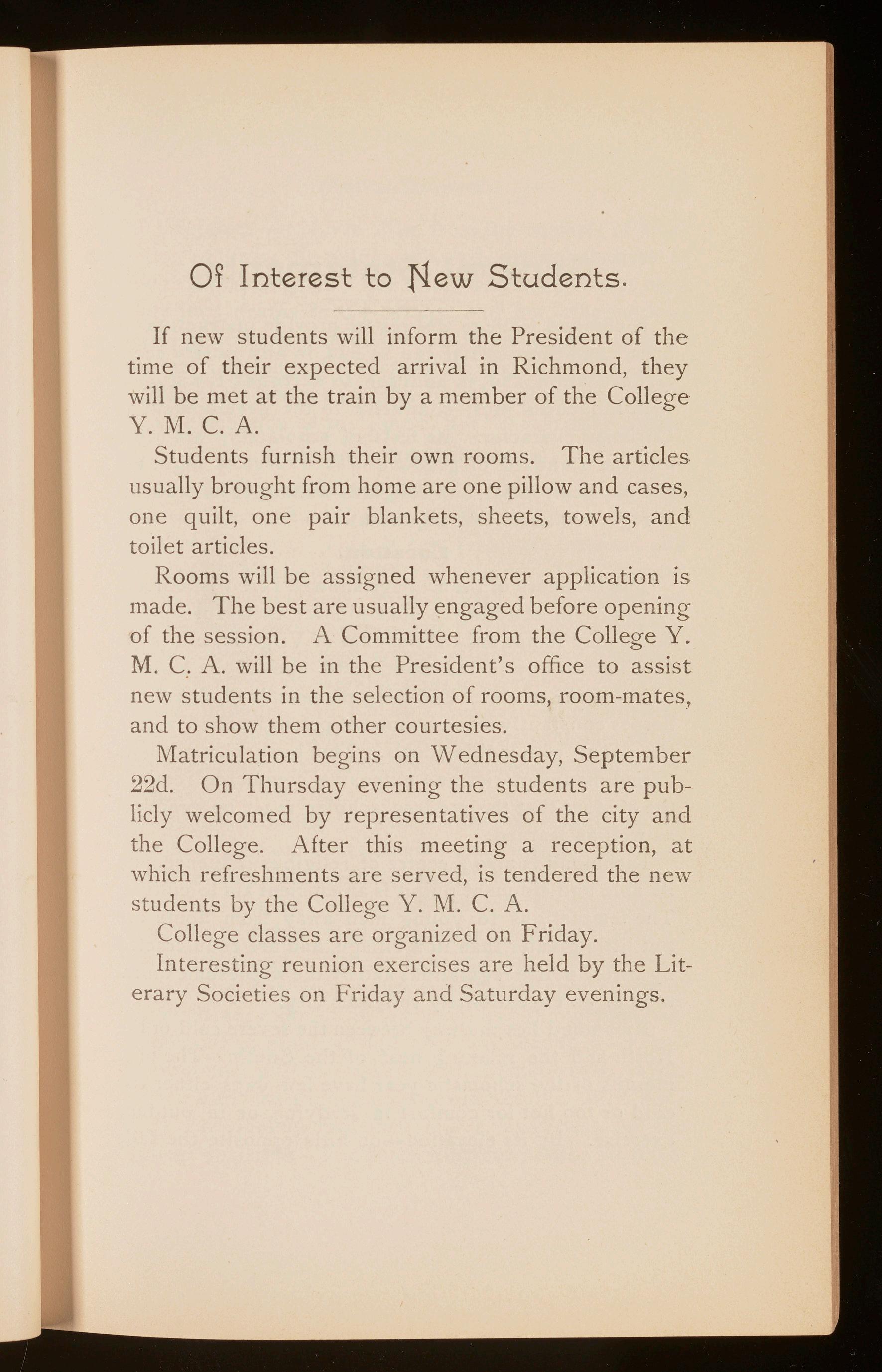
If new students will inform the President of the time of their expected arrival in Richmond, they will be met at the train by a member of the College Y. M. C. A.
Students furnish their own rooms. The articles usually brought from home are one pillow and cases, one quilt, one pair blankets, sheets, towels, and toilet articles.
Rooms will be assigned whenever application is made. The best are usually engaged before opening of the session. A Committee from the College Y. M. C. A. will be in the President's office to assist new students in the selection of rooms, room-mates ., and to show them other courtesies.
Matriculation begins on Wednesday, September 22d. On Thursday evening the students are publicly welcomed by representatives of the city and the College. After this meeting a reception, at which refreshments are served, is tendered the new students by the College Y. M. C. A. College classes are organized on Friday. Interesting reunion exercises are held by the Literary Societies on Friday and Saturday evenings.
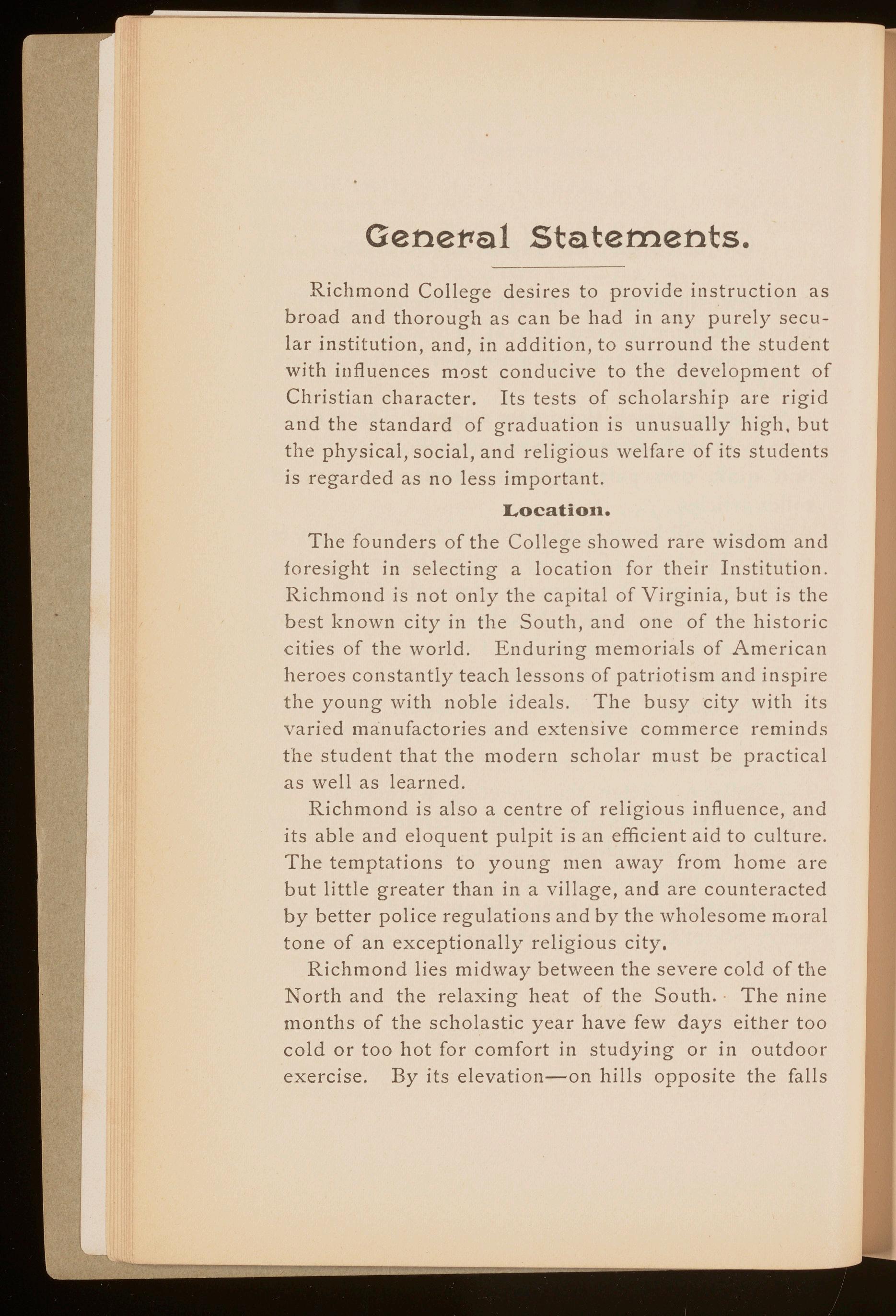
Richmond College desires to provide instruction as broad and thorough as can be had in any purely secular institution, and, in addition, to surround the student with influences m0st conducive to the development of Christian character. Its tests of scholarship are rigid and the standard of graduation is unusually high, but the physical, social, and religious welfare of its students is regarded as no less important . Location.
The founders of the College showed rare wisdom and foresight in selecting a location for their Institution. Richmond is not only the capital of Virginia, but is the best known city in the South, and one of the historic cities of the world. Enduring memorials of American heroes constantly teach lessons of patriotism and inspire the young with noble ideals. The busy city with its varied manufactories and extensive commerce reminds the student that the modern scholar must be practical as well as learned.
Richmond is also a centre of religious influence, and its able and eloquent pulpit is an efficient aid to culture. The temptations to young men away from home are but little greater than in a village, and are counteracted by better police regulations and by the wholesome moral tone of an exceptionally religious city, Richmond lies midway between the severe cold of the North and the relaxing heat of the South. The nine months of the scholastic year have few days either too cold or too hot for comfort in studying or in outdoor exercise. By its elevation-on hills opposite the falls

General Statements. 19 of the James-it is free alike from t~e malaria of tidewater and from the pulmonary and enteric diseases of the mountain region. For thirty years there have been only four deaths in the college, and few other serious cases of sickness-none that could be ascribed to local causes. During the session of I 896-'97, the good health of students and professors was unbroken. There was no occasion at any time to use the infirmary rooms.
The College buildings stand in a beautiful park of thirteen acres, situated in the western and most elevated part of the city. This is the residence section, and abounds in homes of wealth and culture. These natural advantages have been supplemented by municipal improvements, including gas and electric lights, a water supply, and a thorough system of drainage. The sanitary arrangements are first-class in every respect. Thus health, comfort, and means of recreation in open-air exercises, with sufficient seclusion to promote study, have been provided for and will receive constant attention.
The main building stands near the middle of the campus, and from it the surface slopes gently down on every side to the encompassing streets. The north wing, 46x104 feet, is devoted mainly to dormitories, 18x14 feet, high pitched, well lighted, and ventilated by open fire-places. The centre building, I rox42 feet, contains on first floor a chapel with seating capacity of six hundred, reduced for ordinary use by movable partitions to two hundred and fifty; on second floor, lecture-rooms, well furnished with blackboards, maps, charts, and other appliances; and on the third floor three handsomely furnished halls, 3ox40 feet, for the College societies. The south wing contains in the base-
20
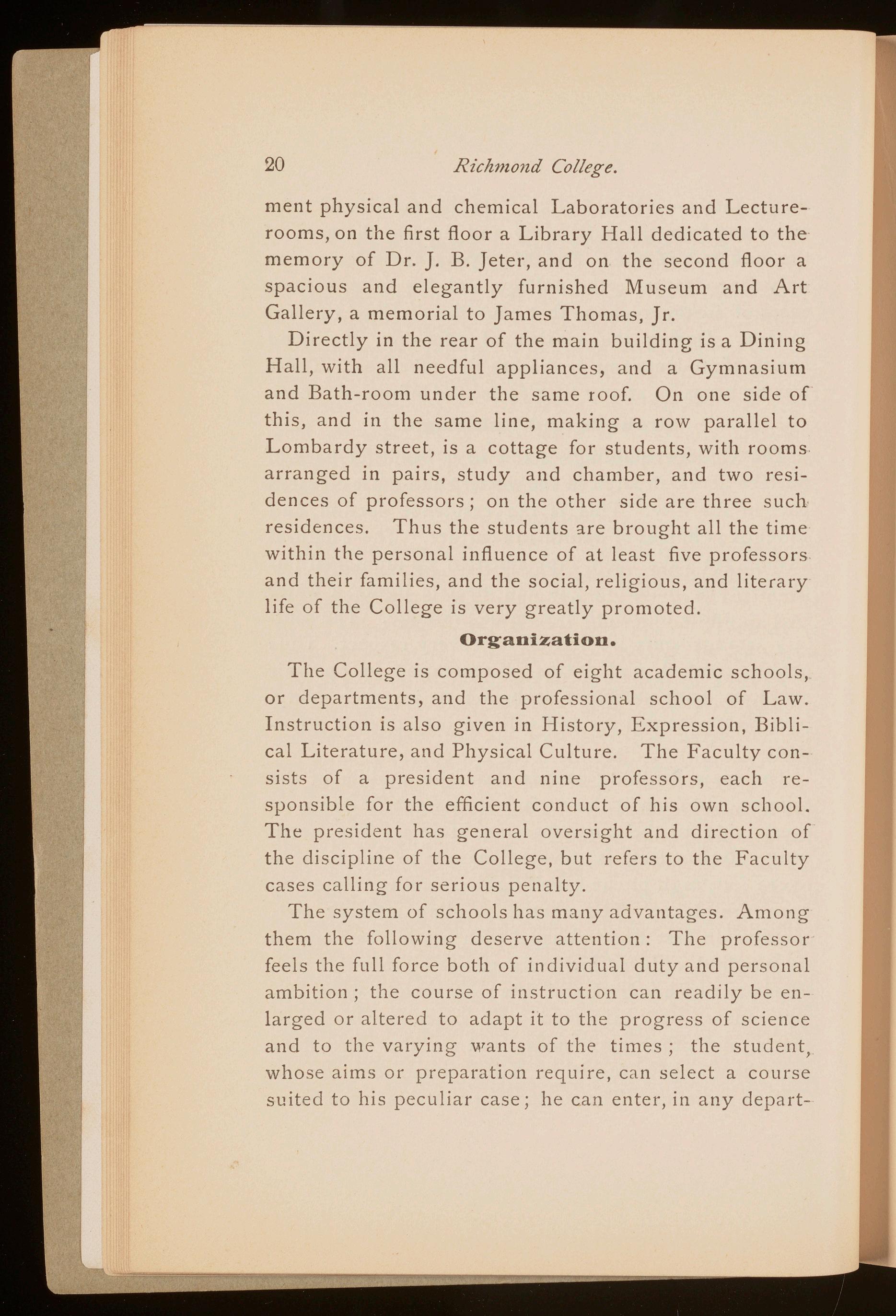
Richmond College.
ment physical and chemical Laboratories and Lecturerooms, on the first floor a Library Hall dedicated to the memory of Dr. J. B. Jeter, and on the second floor a spacious and elegantly furnished Museum and Art Gallery, a memorial to James Thomas, Jr.
Directly in the rear of the main building is a Dining Hall, with all needful appliances, and a Gymnasium and Bath-room under the same roof. On one side of this, and in the same line, making a row parallel to Lombardy street, is a cottage for students, with rooms arranged in pairs, study and chamber, and two residences of professors; on the other side are three such residences. Thus the students are brought all the time within the personal influence of at least five professors and their families, and the social, religious, and literary life of the College is very greatly promoted.
Organization.
The College is composed of eight academic schools, or departments, and the professional school of Law. Instruction is also given in History, Expression, Biblical Literature, and Physical Culture. The Faculty consists of a president and nine professors, each responsible for the efficient conduct of his own school. The president has general oversight and direction of the discipline of the College, but refers to the Faculty cases calling for serious penalty.
The system of schools has many advantages. Among them the following deserve attention: The professor feels the full force both of individual duty and personal ambition; the course of instruction can readily be enlarged or altered to adapt it to the progress of science and to the varying wants of the times; the student, whose aims or preparation require, can select a course suited to his peculiar case; he can enter, in any depart-

General Statements.
21 mcnt of study, the classes for which he is prepared, and deficiency in one branch does not retard him in another; students are not divided into fixed classes and grades, but all stand on a footing of social equality, and mingle freely with one another; the system favors the utmost thoroughness of culture, and the fixed requirements for graduation lend unity to the whole; the degrees, being awarded to fewer persons than under a curriculum, are therefore of more value; and every good student, whether he takes a degree or not, receives a testimonial to his success in the shape of Certificates or School Diplomas.
The deportment of a Christian gentleman is the standard to which every student is expected to conform. All appropriate means are used to develop and confirm a sense of personal honor and sacred regard for truth, as upon these rests the best reliance for good conduct. A few plain and reasonable rules are prescribed, and a copy furnished to each matriculate. Any who wantonly viol.ate these regulations, habitually neglect their duties, or are not regular and punctual in attendance on lectures and recitations, will be required to withdraw from College.
Students have easy access to all the advantages afforded by the various city churches, with their Bible ,classes and Sunday-schools. Thosf! who are professors of religion may bring with them letters of commendation, and without severing their ecclesiastical connections at home, attach themselves while here to some church, so as to have a church home, with the sympathy and care of a pastor. The daily duties of the College

22 Richmond College.
are opened with brief devotional exercises, conducted by the president and attended by professors. Prayermeetings, conducted by the students themselves, are held twice or oftener every week. Attendance on religious exercises is entirely voluntary, as experience has shown that such a course is best in its results.
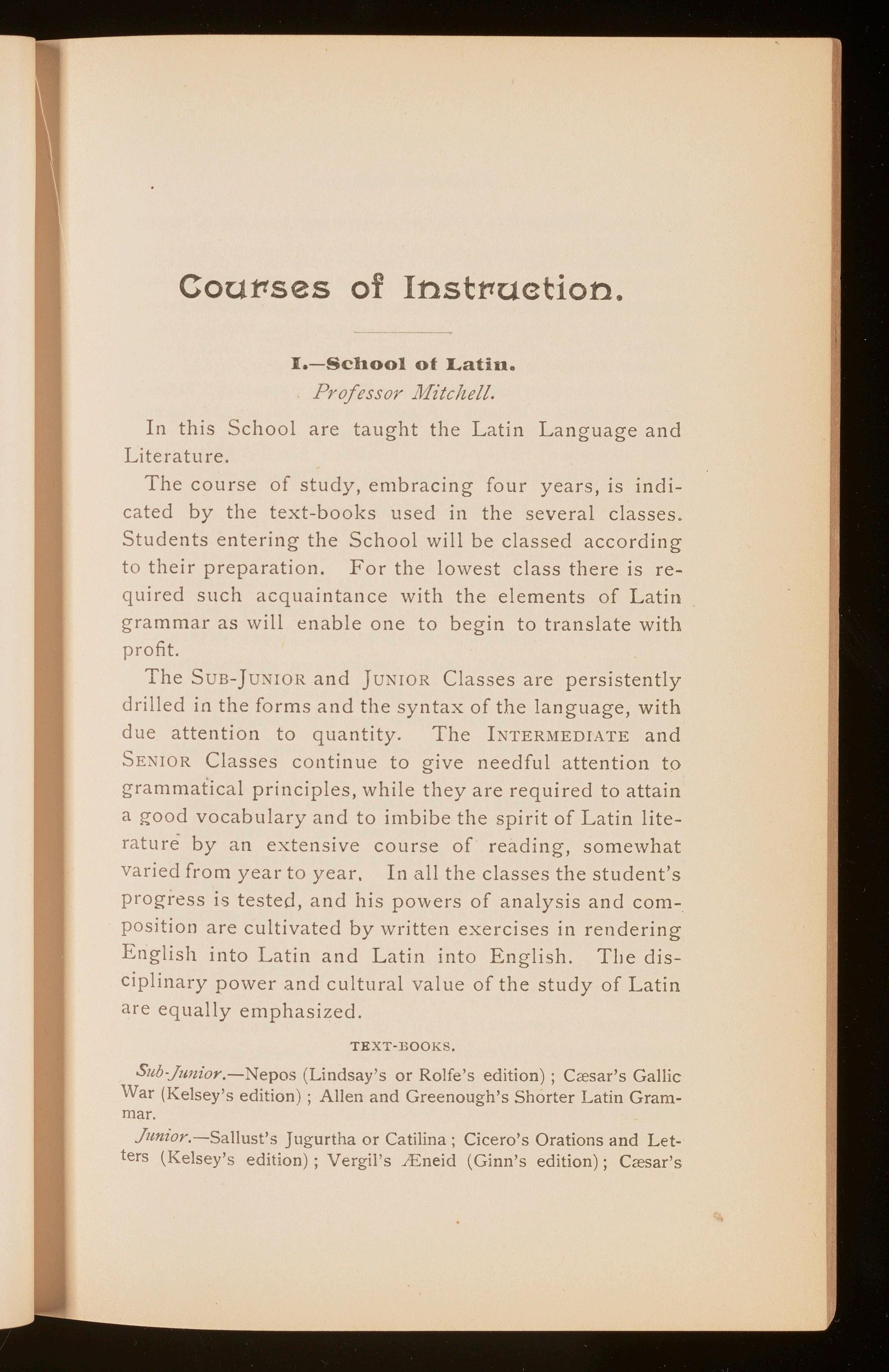
Professor Mitcliell.
In this School are taught the Latin Language and Literature.
The course of study, embracing four years, is indicated by the text-books used in the several classes . Students entering the School will be classed according to their preparation. For the lowest class there is required such acquaintance with the elements of Latin grammar as will enable one to begin to translate with profit.
The SuB-Ju;-.iIOR and JUNIOR Classes are persistently drilled in the forms and the syntax of the language, with due attention to quantity. The INTERMEDIATE and SENIOR Classes continue to give needful attention to grammatical principles, while they are required to attain a good vocabulary and to imbibe the spirit of Latin liter a ture by an extensive course of reading, somewhat v aried from year to year. In all the classes the student's progress is tested, and his powers of analysis and composition are cultivated by written exercises in rendering English into Latin and Latin into English. Tbe disciplinary power and cultural value of the study of Latin are equally emphasized.
THXT·llOOKS,
Sztb-fimior.-Nepos (Lindsay's or Rolfe's edition) ; Cresar's Gallic War (Kelsey's edition ) ; Allen and Greenough's Shorter Latin Grammar.
Junior.-Sallust's Jugurtha or Catilina; Cicero's Orations and Letters (Kelsey's edition); Vergil's .!Eneid (Ginn's edition); Cresar's
24
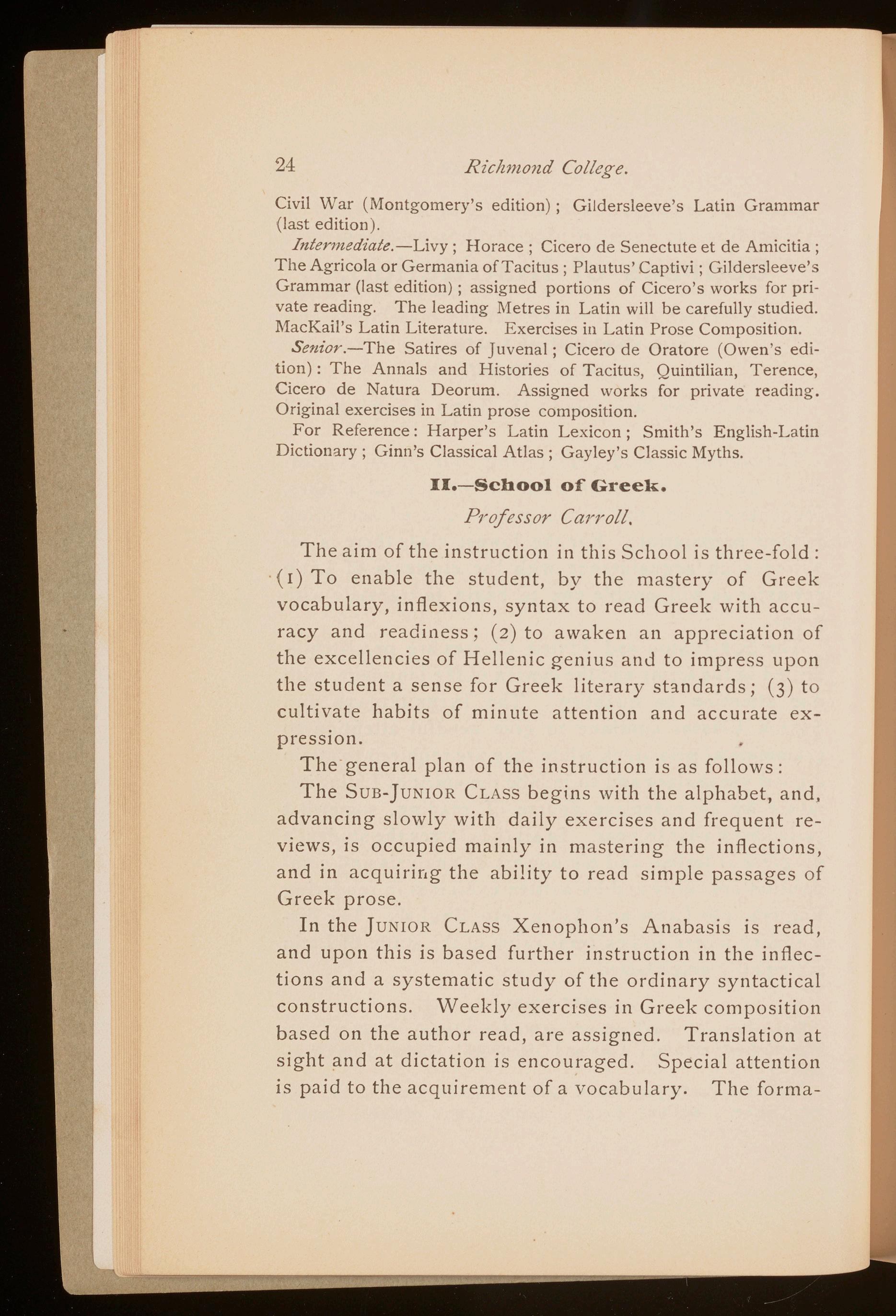
Richmond College.
Civil War (Montgomery's edition); Gildersleeve's Latin Grammar (last edition).
Interinediate.-Livy; Horace; Cicero de Senectute et de Amicitia; The Agricola or Germania of Tacitus; Plautus' Captivi; Gildersleeve's Grammar (last edition) ; assigned portions of Cicero's works for private reading. The leading Metres in Latin will be carefully studied. MacKail's Latin Literature. Exercises in Latin Prose Composition.
Senior.-The Satires of Juvenal; Cicero de Oratore (Owen's edition): The Annals and Histories of Tacitus, Quintilian, Terence, Cicero de Natura Deorum. Assigned works for private reading. Original exercises in Latin prose composition.
For Reference: Harper's Latin Lexicon; Smith's English-Latin Dictiom.ry; Ginn's Classical Atlas; Gayley's Classic Myths.
11.-School of' Greek.
Professor Carroll,
The aim of the instruction in this School is three-fold: (I) To enable the student, by the mastery of Greek vocabulary, inflexions, syntax to read Greek with accuracy and readiness; (2) to awaken an appreciation of the excellencies of Hellenic genius and to impress upon the student a sense for Greek litc:rary st:1.ndards; (3) to cultivate habits of minute attention and accurate expression.
The general plan of the instruction is as follows:
The SUB-JUNIOR CLASS begins with the alphabet, and, advancing slowly with daily exercises and frequent reviews, is occupied mainly in mastering the inflections, and in acquirir,g the ability to read simple passages of Greek prose.
In the JUNIOR CLASS Xenophon's Anabasis is read, and upon this is based further instruction in the inflections and a systematic study of the ordinary syntactical constructions. Weekly exercises in Greek composition based on the author read, are assigned. Translation at sight and at dictation is encouraged. Special attention is paid to the acquirement of a vocabulary. The forma-

Courses o.f Instruction.
tion of a correct pronunciation is cultivated by much oral reading and by the writing by the class of sentences read by the instructor.
The INTERMEDIATECLASSduring the first half-session is occupied mainly with the study of the Greek of the Attic orators, with Lysias as the basis. This is accompanied by a review of the leading principles of syntax, and by a minute study of the 5yntax of the verb. The aim of this course is to give a view of the development of Attic prose, and an appreciation of the literary and practical sides of Athenian oratory. In the second half-session Homer is read. The main end in view is the attainment of such a knowledge of Homeric vocabulary and syntax and style as will give the power of translating ordinary passages of Homer at sight. The work is literary rather than grammatical. One hour a week will be devoted to the study of Greek life as manifested in Greek history, institutions, and art.
The SENIOR CLASS reads more difficult authors, surveys the literature, and reviews the grammar with special reference to niceties and irregularities in the syntax of the authors read. Syntactical exercises based mainly on the Greek of Plato are required.
Examination requirements make parallel reading a part of the work done in the two higher classes.
Graduates and members of the Senior and Interme,diate Classes will have opportunity to form a class to read the New Testament in the original.
TEXT-BOOKS.
Sub-:funior.-Beginner's Greek Book (Frost); Gleason's '"Gate to the Anabasis" ; Moss' Greek. Reader.
Junior.-Goodwin's Grammar; Xenophon's Anabasis (Harper and Wallace's edition; Collar and Daniell's Beginner's Prose Composition.

26 Richmond College.
Intermediate.-Goodwin's Grammar; Allinson's Greek Prose; Schuckburgh's Lysias; Jebb's Selections from the Attic Orators; Seymour's Homer's Iliad.
Senior.-Exercises from various sources; Jebb's Greek LiteratureHomer, Plato, Thucydides, Sophocles (Ginn & Co.'s College Series of Text's preferred).
New Testament.-Westcott & Hort's Text.
For references in all cases: Liddell and Scott's Lexicon; Yonge's English-Greek Lexicon; Rogue's Irregular Verbs; Smith's Classical Dictionary; Schreiber's Atlas of Classical Antiquities.
III.-School of' Modern Languages.
Professor Boatwriglzt.
French and German are the lanv.uages taught, The aim is to give the student a knowledge of vocabulary and grammatical structure sufficient to enable him to read their literature with understanding and pleasure. Secondarily, to teach him to speak these languages, and to understand them when spoken. In junior classes, modern authors are read, and language is taught as an art. In senior classes, more attention is paid to the classics and to the scientific study of language structure. Much time is devoted to Literature and History, The course is varied from year to year in order that advantage may be taken of the latest and best helps in this department of study. The following text-books were used during the past session:
FRENCH-jimior Class.-Sym's First Year in French; Edgren's Grammar; Joynes' Contes de Fees; Un Cas de Conscience, Gervais; L'Expedition de la Jeune-Hardie, Jules Verne; Le Voyage de M. Perrichon, Labiche and Martin; L'Abbe Constantin, Halevy; Le Cid, Corneille ; French Composition, Grandgent. Dictation Exercises.
Senior Class.-Edgren's Grammar; Grandgent's Composition; Lyrics from Beranger, Lamartine, Hugo. De Musset and Gautier; Les Precieuses Ridicules and Les Femmes Savantes, by Moliere ; Graziella, by Lamartine; Hemani, by Victor Hugo; Wilkinson's Classic French Course in English ; Lectures on French Literature in XVII. Century.
Parallel.-A Study of French Classicism in Corneille; Lodge's Study in Corneille; Le Cid; Horace.

Courses o.f Instruction. 27
GERMAN-Junior Class.-First Lessons in German, by Harris; Original Letters; Andersen's Bilderbuch ohne Bilder; Heyse's L' Arrabiata; Schiller's Neffe als Onkel; Storm's Immensee; Schiller's Wilhelm Tell ; Exercises based on Immensee.
Senior Class.-Joynes·Meissner's Grammar; Harris' Prose Composition; \Vhite's Selections from Heine's Poems; Goethe's Kronung Josefs II ; Freytag's Doktor Luther; Goethe's Hermann und Dorothea ; Lyrics from Goethe, Schiller, Platen, and others; Hosmer's History of German Literature ; Lectures on German Literature.
Senior German.-A Study of Schiller; Nevinson's Life of Schiller;. Carlyle's Life of Schiller; Heath's edition of Wilhelm Tell, by Deering; Holt's edition of Wallenstein, by Carruth.
Examination requirements in the senior course place the work known as "parallel" on an equal footing with class-work. Students often find it advantageous to do all or a part of this work during the summer vacation. The parallel reading for I 897-'98 will be as follows:
Senior Frenclz.-Life and Works of :'lfoliere; Reading of Les Pr ecieuses Ridicules, Le Bourgeois Gentilhomme, and Le Misanthrope.
Senior German.-A Study of Lyric Poetry based on Deutsche Gedichte, by Klenze; Biographies of the principal lyric poets.
Applicants for admission to senior classes are expected to have completed the full equivalent of the College junior courses. Knowledge of grammatical forms and familiarity with irregular verbs will be required. Previous drill in conversation is also very desirable.
The College library, besides containing much French and German literature, regularly supplies students of this School with foreign periodicals and other modern language publications.
The objects of the School are: (1) to give the student a mastery of the English language in speaking and writing; (2) to give a knowledge of the history of the
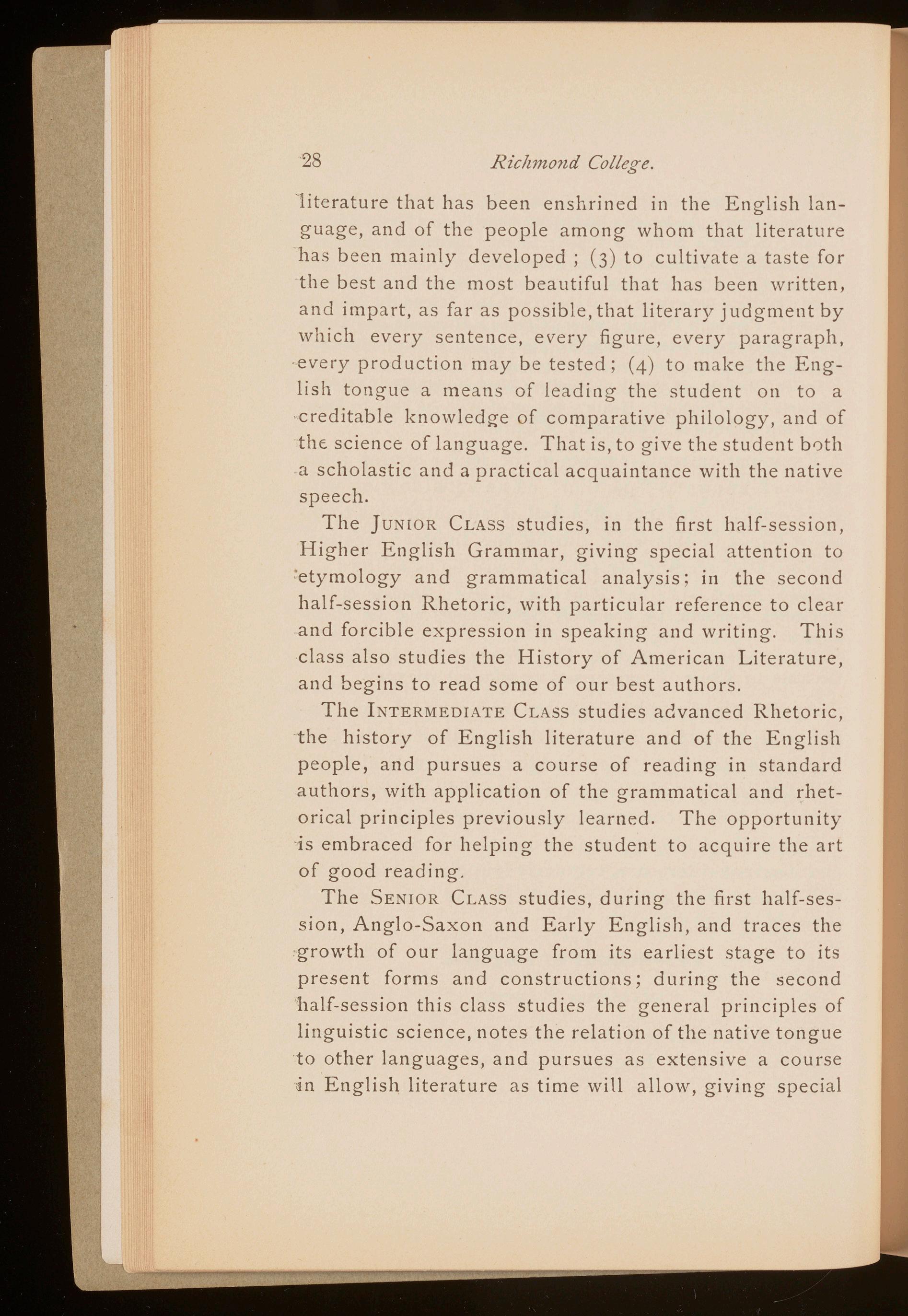
28 Ricltmond College.
literature that has been enshrined in the English language, and of the people among whom that literature has been mainly developed; (3) to cultivate a taste for the best and the most beautiful that has been written, and impart, as far as possible, that literary judgment by which every sentence, every figure, every paragraph, every production may be tested; (4) to make the English tongue a means of leading the student on to a creditable knowledge of comparative philology, and of the. science of language. That is, to give the student b0th a scholastic and a practical acquaintance with the native speech.
The JuNWR CLASS studies, in the first half-session, Higher English Grammar, giving special attention to etymology and grammatical analysis: in the second half-session Rhetoric, with particular reference to clear and forcible expression in speaking and writing. This class also studies the History of American Literature, and begins to read some of our best authors.
The INTERMEDIATECLASS studies advanced Rhetoric, the history of English literature and of the English people, and pursues a course of reading in standard authors, with application of the grammatical and rhetorical principles previously learned. The opportunity is embraced for helping the student to acquire the art of good reading.
The SENIOR CLASS studies, during the first half-session, Anglo-Saxon and Early English, and traces the growth of our language from its earliest stage to its present forms and constructions; during the second half-session this class studies the general principles of linguistic science, notes the relation of the native tongue to other languages, and pursues as extensive a course fo English literature as time will allow, giving special

29 attention to a comparative study of Macaulay and Carlyle.
In all classes written exercises are required, and also parallel reading.
Students are earnestly advised to take the whole English course. But if any insist on omitting a class or classes, they must show by examination, at the beginning of the session, that they are prepared for the class to which they wish to be admitted. Those wishing to enter the Intermediate Class, without attendance on the class below, must stand an examination on Higher English Grammar (Bain or Meiklejohn), includ~ ing analysis of sentences and English versification, and on elementary Rhetoric; and must be able to write a paper (correct in spelling, punctuation, capitals, and syntax) on some character in Scott's Marmion or in Irving's Sketch Book. Those wishing to enter the Senior Class, without attendance on classes below, must be able to stand the examination above outlined, and, in addition, stand examination on advanced Rhetoric (Bain or D. J. Hill), on the history of the English people and of English literature, and present a satisfactory paper on some character in the Merchant of Venice or in Julius Cesar.
TEXT-BOOKS.
Jwzior.-Meiklejohn's English Language; \,Vatkins's American Literature; \Villiams's Composition and Rhetoric; Scott's Lady of the Lake; Irving's Sketch Book; Goldsmith's Deserted Village and Vicar of Wakefield; and Tennyson's Enoch Arden.
Int ermediate.-Bain's Composition and Rhetoric; Montgomery's Leading Facts of English History, compared with Green's Short History of English People; Stopford Brooke's History of English Literature; Julius Ccesar, studied according to method of the professor's Shakesperean Tablet; Merchant of Venice, Richard III., Henry VIII.; and Ad d ison's Select Essays.
S enzor.-Lounsbury's History of English Language; Cook's First Book in Old English ; Morris's Chaucer; Whitney's Life and Growth
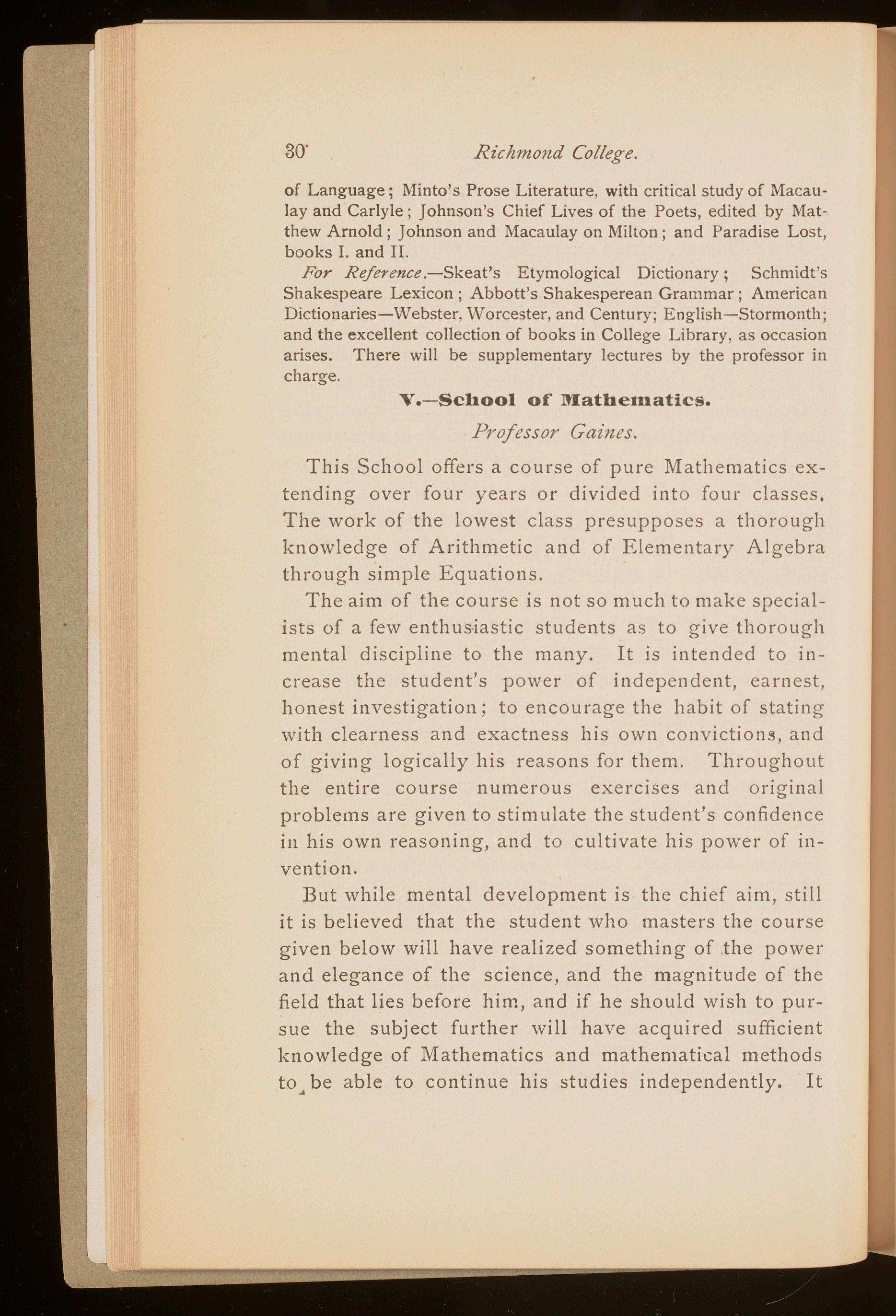
30"
Richmond College of Language; Minto's Prose Literature, with critical study of Macaulay and Carlyle; Johnson's Chief Lives of the Poets, edited by Matthew Arnold; Johnson and Macaulay on Milton; and Paradise Lost, books I. and II.
For Reference.-Skeat's Etymological Dictionary; Schmidt's Shakespeare Lexicon ; Abbott's Shakesperean Grammar; American Dictionaries-Webster, ·worcester, and Century; English-Stormonth; and the excellent collection of books in College Library, as occasion arises. There will be supplementary lectures by the professor in charge.
Professor Gaines.
This School offers a course of pure Mathematics extending over four years or divided into four classes, The work of the lowest class presupposes a thorough knowledge of Arithmetic and of Elementary Algebra through simple Equations.
The aim of the course is not so much to make specialists of a few enthusiastic students as to give thorough mental discipline to the many. It is intended to increase the student's power of independent, earnest, honest investigation; to encourage the habit of stating with clearness and exactness his own conviction!3, and of giving logically his reasons for them. Throughout the entire course numerous exercises and original problems are given to stimulate the student's confidence in his own reasoning, and to cultivate his power of invention.
But while mental development is the chief aim, still it is believed that the student who masters the course given below will have realized something of the power and elegance of the science, and the magnitude of the field that lies before him, and if he should wish to pursue the subject further will have acquired sufficient knowledge of Mathematics and mathematical methods to~ be able to continue his studies independently. It
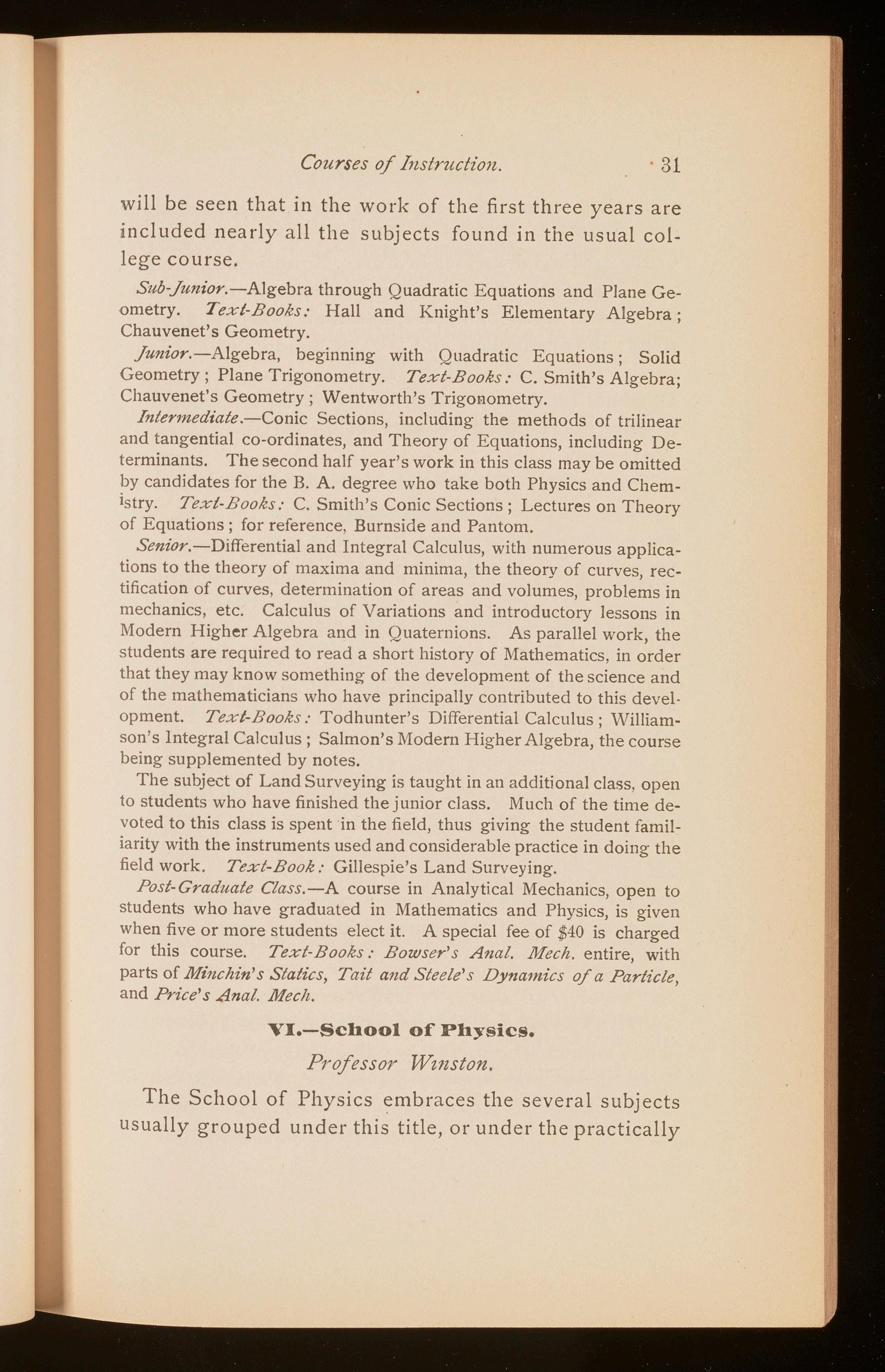
Courses o.f Instruction.
3 1 will be seen that in the work of the first three years are included nearly all the subjects found in the usual college course.
Sub-Junior.-Algebra through Quadratic Equations and Plane Geometry Text-Boo ks : Hall and Knight's Elementary Algebra; Chauvenet's Geometry.
Junior.-Algebra, beginning with Quadratic Equations; Solid Geometry; Plane Trigonometry. Text-Books: C. Smith's Algebra; Chauvenet's Geometry; Wentworth's Trigonometry.
Interinediate.-Conic Sections, including the methods of trilinear and tangential co-ordinates, and Theory of Equations, including Determinants. The second half year's work in this class may be omitted by candidates for the B. A. degree who take both Physics and Chemistry. Text-Books: C. Smith's Conic Sections; Lectures on Theory of Equations ; for reference , Burnside and Pantom.
Senior.-Differential and Integral Calculus, with numerous applications to the theory of maxima and minima, the theory of curves, rectification of curves , determination of areas and volumes, problems in mechanics, etc. Calculus of Variations and introductory lessons in Modern Higher Algebra and in Quaternions. As parallel work, the students are required to read a short history of Mathematics, in order that they may know something of the development of the science and of the mathematicians who have principally contributed to this development. Text-Books: Todhunter's Differential Calculus; Williamson's Integral Calculus; Salmon's Modern Higher Algebra, the course being supplemented by notes.
The subject of Land Surveying is taught in an additional class, open to students who have finished the junior class. Much of the time devoted to this class is spent in the field, thus giving the student familiarity with the instruments used and considerable practice in doing the field work. Text-Book: Gillespie's Land Surveying.
Post-Graduate Class.-A course in Analytical Mechanics, open to students who have graduated in Mathematics and Physics, is given when five or more students elect it. A special fee of $40 is charged for this course. Text-Books: Bowser's Anal. Mech. entire, with parts of Minchin' s Statics, Tait and Steele's Dynamics of a Particle, and Price's .Anal. Mec!t.
VI.-School oC Physics.
P1'0.fessor Winston.
The School of Physics embraces the several subjects usually grouped under this title, or under the practically
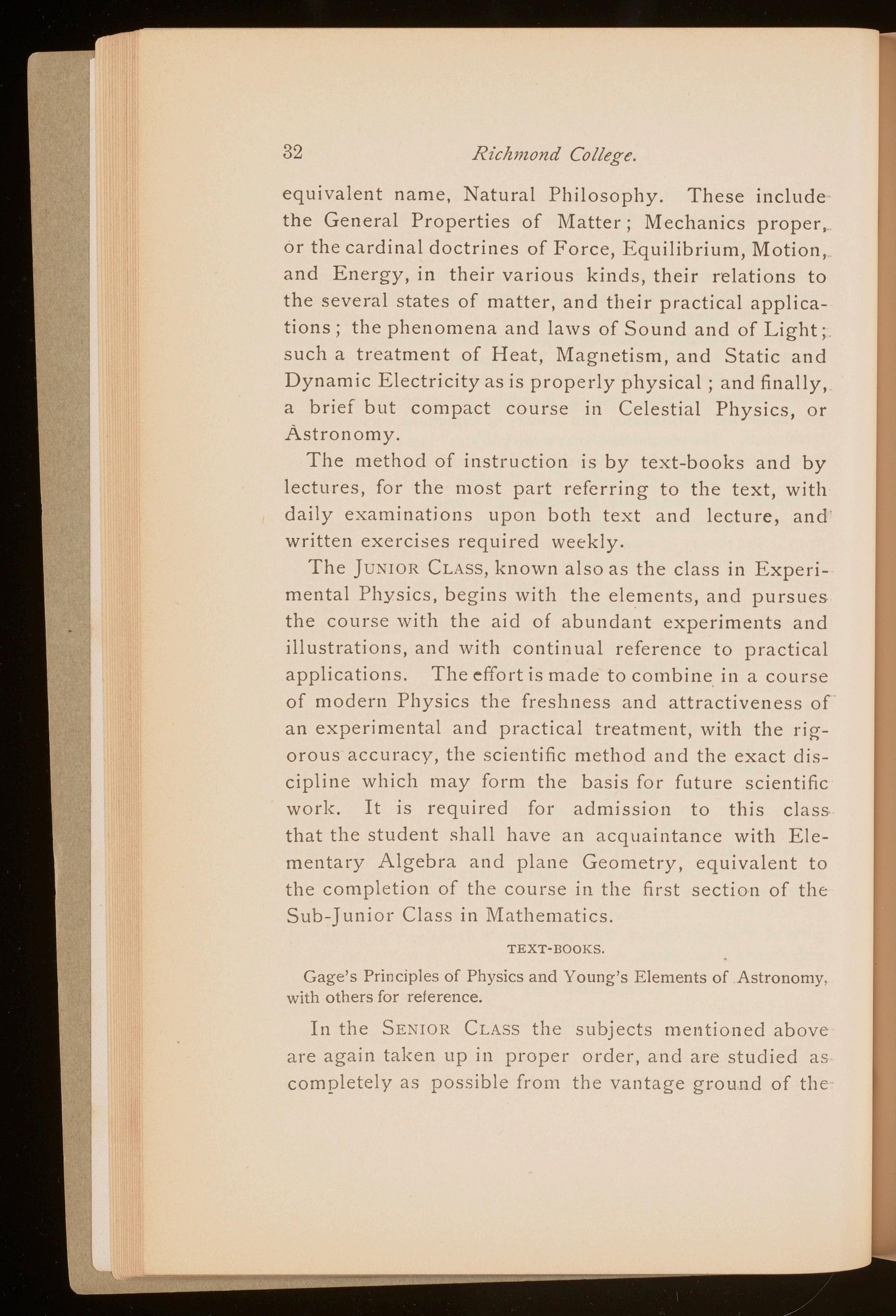
32 Richmond College. equivalent name, Natural Philosophy. These include the General Properties of Matter; Mechanics proper, or the cardinal doctrines of Force, Equilibrium, Motion, and Energy, in their various kinds, their relations to the several states of matter, and their practical applications; the phenomena and laws of Sound and of Light; such a treatment of Heat, Magnetism, and Static and Dynamic Electricity as is properly physical; and finally, a brief but compact course in Celestial Physics, or Astronomy.
The method of instruction is by text-books and by lectures, for the most part referring to the text, with daily examinations upon both text and lecture, and written exercises required weekly.
The JUNIOR CLASS,known also as the class in Experimental Physics, begins with the elements, and pursues the course with the aid of abundant experiments and illustrations, and with continual reference to practical applications. The effort is made to combine in a course of modern Physics the freshness and attractiveness of an experimental and practical treatment, with the rigorous accuracy, the scientific method and the exact discipline which may form the basis for future scientific work. It is required for admission to this class that the student shall have an acquaintance with Elementary Algebra and plane Geometry, equivalent to the completion of the course in the first section of the Sub-Junior Class in Mathematics.
TEXT-BOOKS.
Gage's Principles of Physics and Young's Elements of Astronomy , with others for reference.
In the SENIOR CLASS the subjects mentioned above are again taken up in proper order, and are studied as completely as possible from the vantage ground of th e
Courses ef Instruction.

33
knowledge already gained in the Junior Class, and with the additional aid to be found in the free use of mathematical principles. An acquaintance with advanced Mathematics, equivalent to the completion of the Intermediate Class, is necessary for admission to this class.
TEXT·BOOKS.
Barker's Advanced Physics, or Carhart's University Physics; and Newcomb and Holden's Astronomy, with reference to Daniell's Physics, Anthony and Brackett's Physics, and Young's General Astronomy.
VII.-Scbool of" Cbe111istry.
Professor Hunter.
The course offered in this School is designed to give the student a general knowledge of the important principles of Chemistry, the elements, and typical compounds. Beginning with oxygen, a somewhat detailed study of a few of the common elements is made, after which the elements are taken up systematically in accordance with the periodic system as suggested by Mendeleef.
Facts concerning their occurrence and association in nature, a~ well as their preparation and properties, are presented and explained, accompanied by experimental illustration rn class. Constant reference is made throughout the course to the more important application of chemical facts and principles to the various industries.
During the past year a well-lighted room was fitted up with desks, provided with water and gas, and in future each student will be required to devote four hours per week to the laboratory work, under the immediate supervision of the Professor, who will regularly examine and correct the notes taken on experiments performed, Qualitative analysis will receive sorne attention toward the latter part of the session.

34 Richmond College.
The ground covered by this course is approximately that laid down in Remsen's Chemistry, Briefer Course (Holt, N. Y.), supplemented by a brief course of lectures during April and May upon the chemistry of the compounds of carbon.
TEXT-BOOKS.
Remsen's Chemistry (Briefer Course). Books for reference: Remsen's Chemistry (Advanced Course); Richter's Chemi stry; Roscoe and Schorlemmer's Treatise on Chemistry ; Mendeleef's Principles of Chemistry; Roberts-Austin's Metallurgy; Remsen's Organic Chemistry.
The course offered in Mineralogy during the first quarter of the fall term of next session will be somewhat introductory to the course in Geology, which follows it immediately in point of time. Attention will be paid to the crystallography and the physical properties of minerals, and to the association, distribution, and history of mineral species. The class-room work will be supplemented by the practical examination and study of minerals in the laboratory.
The aim of the course in Geology, which will close at the end of the fall term, is to give the student an intelligent conception of the development of the earth's surface as we now find it, special attention being given to the various transforming agencies now at work. The course will be illustrated by various mineral species, rocks, and fossils. Outdoor excursions to points of interest in and around Richmond will be made from time to time.
Instruction in both subjects named above will b e partly by lecture.
Text-books will be announced later.
ORGANIC CIIEMJSTRY.
A course in the Chemistry of the Carbon Compound s
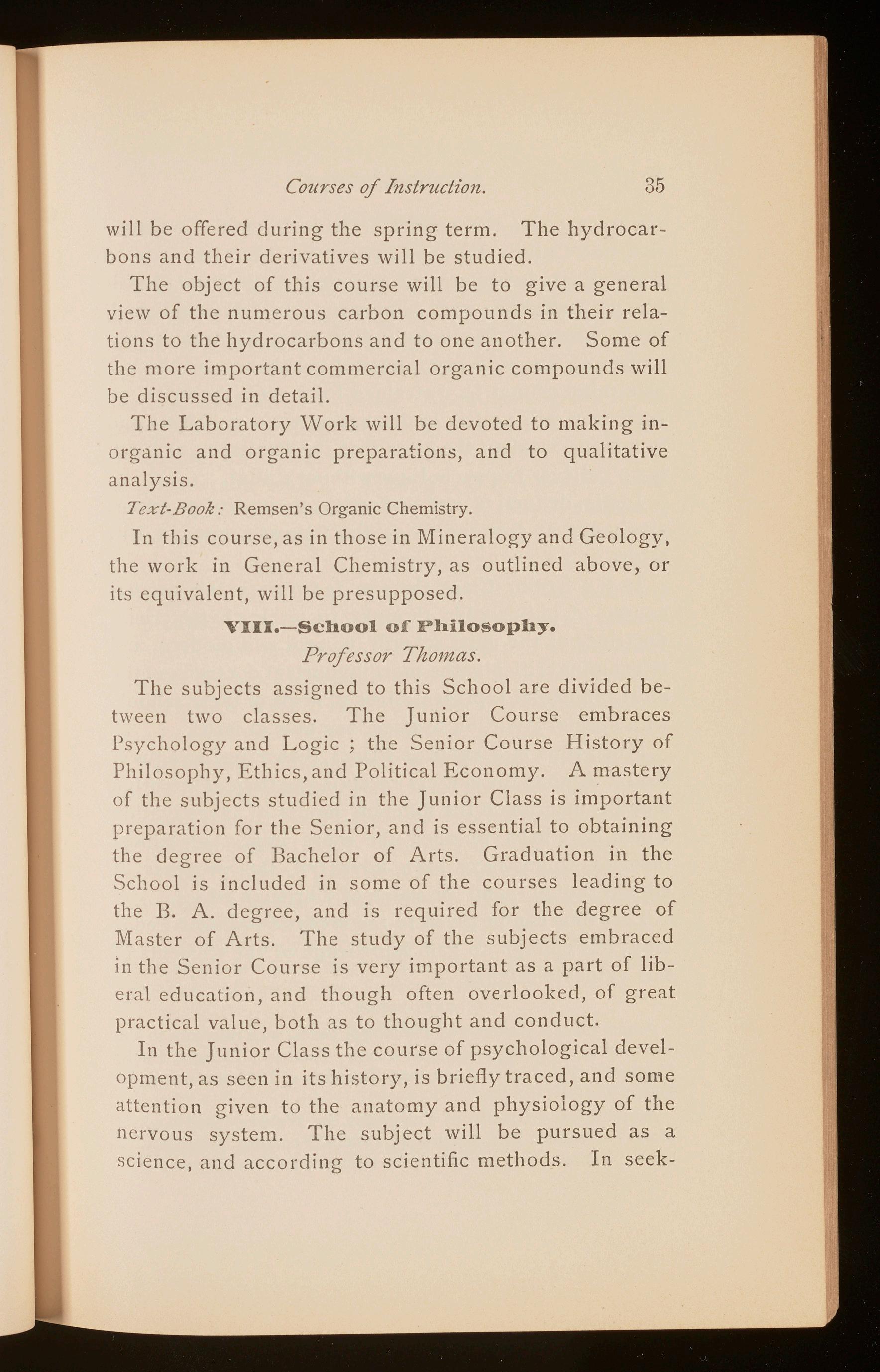
Courses o_fInstruction.
3.5 will be offered <luring the spring term. The hydrocarbons and their derivatives will be studied.
The object of this course will be to give a general view of the numerous carbon compounds in their relations to the hydrocarbons and to one another. Some of the more important commercial organic compounds will be discussed in detail.
The Laboratory Work will be devoted to making inorganic and organic preparations, and to qualitative analysis.
Text-Book: Remsen's Organic Chemistry.
In this course, as in those in Mineralogy and Geology, the work in General Chemistry, as outlined above, or its equivalent, will be presupposed.
VIII.-Scbool of Philosophy. Professor Tltomas.
The subjects assigned to this School are divided between two classes. The Junior Course embraces Psychology and Logic ; the Senior Course History of Philosophy, Ethics, and Political Economy. A mastery of the subjects studied in the Junior Class is important preparation for the Senior, and is essential to obtaining the degree of Bachelor of Arts. Graduation in the School is included in some of the courses leading to the B. A. degree, and is required for the degree of Master of Arts. The study of the subjects embraced in the Senior Course is very important as a part of liberal education, and though often overlooked, of great practical value, both as to thought and conduct.
In the Junior Class the course of psychological development, as seen in its history, is briefly traced, and some attention given to the anatomy and physiology of the nervous system. The subject will be pursued as a science, and according to scientific methods. In seek-

Richmond College.
ing to ascertain the results of Experimental, Comparative, and Child's Psychology, careful effort is made to discriminate between what is purely conjectural, possible, or probable, and what seems to be established. Since, however, Psychology, like other sciences, brings us face to face with metaphysical problems, and the human mind cannot be restrained from such inquiries, no hesitation will be felt in discussing these problems and in making clear to the class that the Professor, at least, is no believer in psychology without a soul.
Logic, deductive and inductive, is studied as extensively and as thoroughly as the time at command will allow.
In the Senior Class the aim is to trace the general course of philosophic thought, to mark characteristic doctrines of the chief schools, ancient and modern, and to examine critically the more important doctrines of the most influential representatives of some of these schools with special attention to questions now at issue.
Much time is devoterl to Ethics, theoretical and practical. Among the matters receiving particular attention may be mentioned the different modes of investigation which have been pursued, the more important ethical theories which have been advanced, the progress of ethical thought, and the value of Christian ethics.
Less time can be given to the study of Political Economy, but enough to gain knowledge of the elements of this valuable science.
TEXT-BOOKS.
Junior Class.-Elements of Psycology, Davis, with reference to the works of Sully, Ladd, James, and others; Theory of Thought, Davis; Elements of Deductive Logic and Elements of Inductive Logic, by Davis.
Senior Class.-History of Philosophy, by Weber; Hand-book of Moral Philosophy, by Calderwood; Political Economy, to be decided upon. Various other works used for reference and parallel reading.
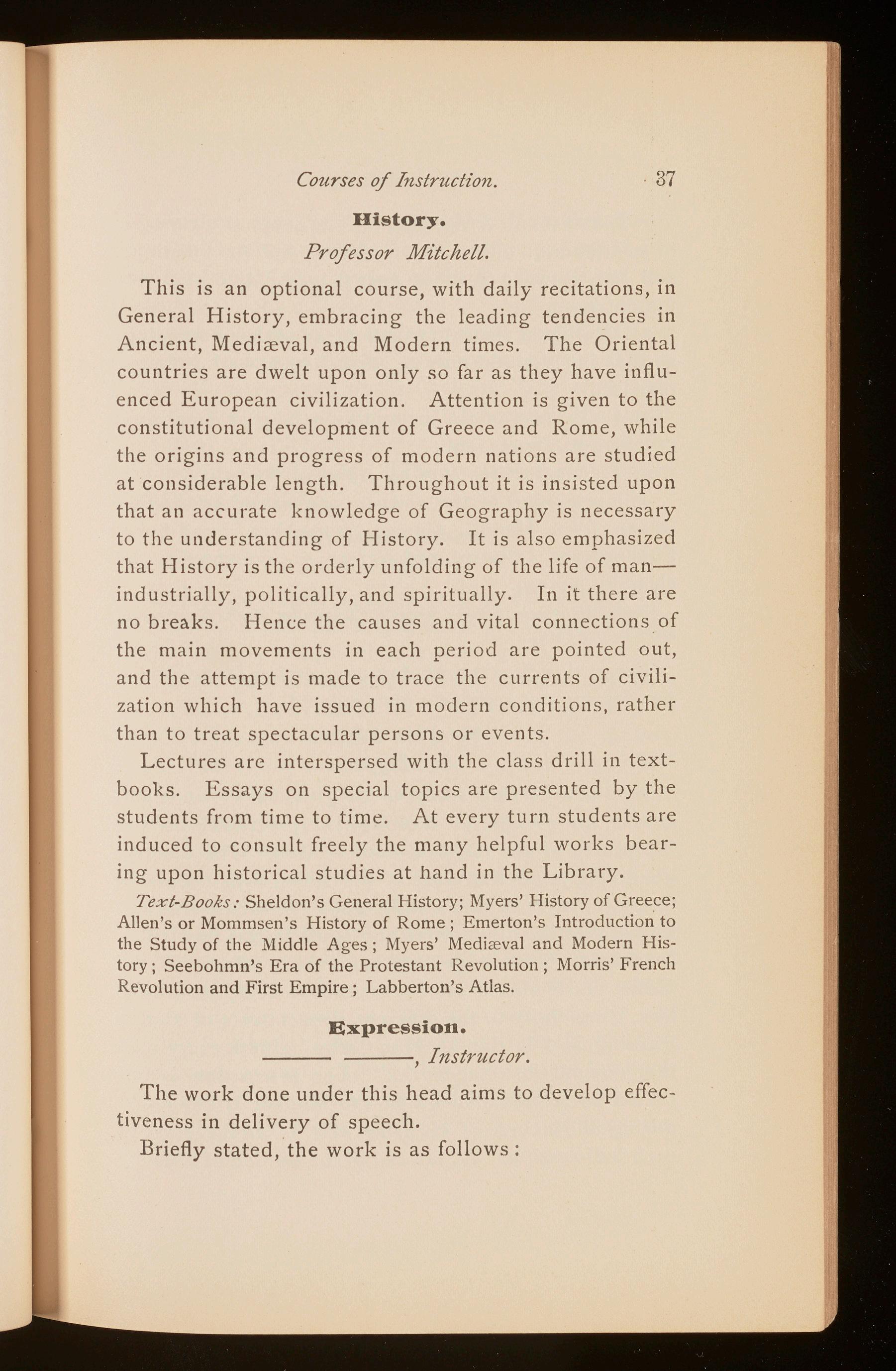
Courses o.f Instruction. · 37 History.
Professor Mitchell.
This is an optional course, with daily recitations, in General History, embracing the leading tendencies in Ancient, Mediceval, and Modern times. The Oriental countries are dwelt upon only so far as they have influenced European civilization. Attention is given to the constitutional development of Greece and Rome, while the origins and progress of modern nations are studied at considerable length. Throughout it is insisted upon that an accurate knowledge of Geography is necessary to the understanding of History. It is also emphasized that History is the orderly unfolding of the life of manindustrially, politically, and spiritually. In it there are no breaks. Hence the causes and vital connections of the main movements in each period are pointed out, and the attempt is made to trace the currents of civilization which have issued in modern conditions, rather than to treat spectacular persons or events.
Lectures arc interspersed with the class drill in textbooks. Essays on special topics are presented by the students from time to time. At every turn students are induced to consult freely the many helpful works bearing upon historical studies at hand in the Library.
Text-Books: Sheldon's General History; Myers' History of Greece; Allen's or Mommsen's History of Rome; Emerton's Introduction to the Study of the Middle Ages ; Myers' Medi<f!val and Modern History; Seebohmn's Era of the Protestant Revolution; Morris' French Revolution and First Empire; Labberton's Atlas.
Expression. ---, Instructor.
The work done under this head aims to develop effectiveness in delivery of speech.
Briefly stated, the work is as follows:
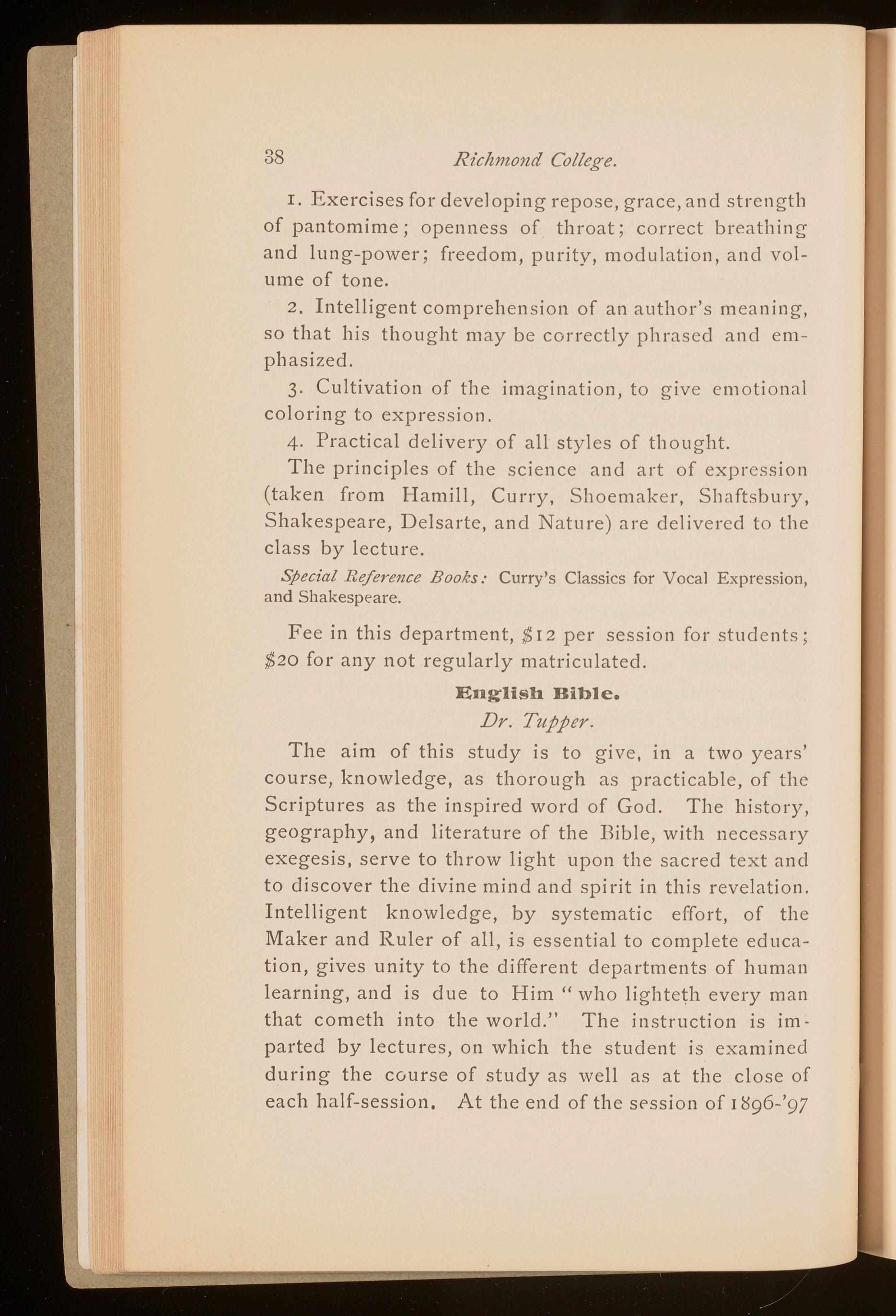
38 Richmond College.
r. Exercises for developing repose, grace, and strength of pantomime; openness of throat; correct breathing and lung-power; freedom, purity, modulation, and volume of tone.
2. Intelligent comprehension of an author's meaning, so that his thought may be correctly phrased and emphasized.
3. Cultivation of the imagination, to give emotional coloring to expression.
4. Practical delivery of all styles of thought. The principles of the science and art of expression (taken from Hamill, Curry, Shoemaker, Shaftsbury, Shakespeare, Delsarte, and Nature) are delivered to the class by lecture.
Special Reference Books: Curry's Classics for Vocal Expression, and Shakespeare.
Fee in this department, $ 12 per session for students; $20 for any not regularly matriculated. English Bible.
Dr. Tupper.
The a,m of this study is to give, in a two years' course, knowledge, as thorough as practicable, of the Scriptures as the inspired word of God. The history, geography, and literature of the Bible, with necessary exegesis, serve to throw light upon the sacred text and to discover the divine mind and spirit in this revelation. Intelligent knowledge, by systematic effort, of the Maker and Ruler of all, is essential to complete education, gives unity to the different departments of human learning, and is due to Him "who lighteth every man that cometh into the world." The instruction is imparted by lectures, on which the student is examined during the c0urse of study as well as at the close of each half-session, At the end of the Sf'ssion of 1 896-'97
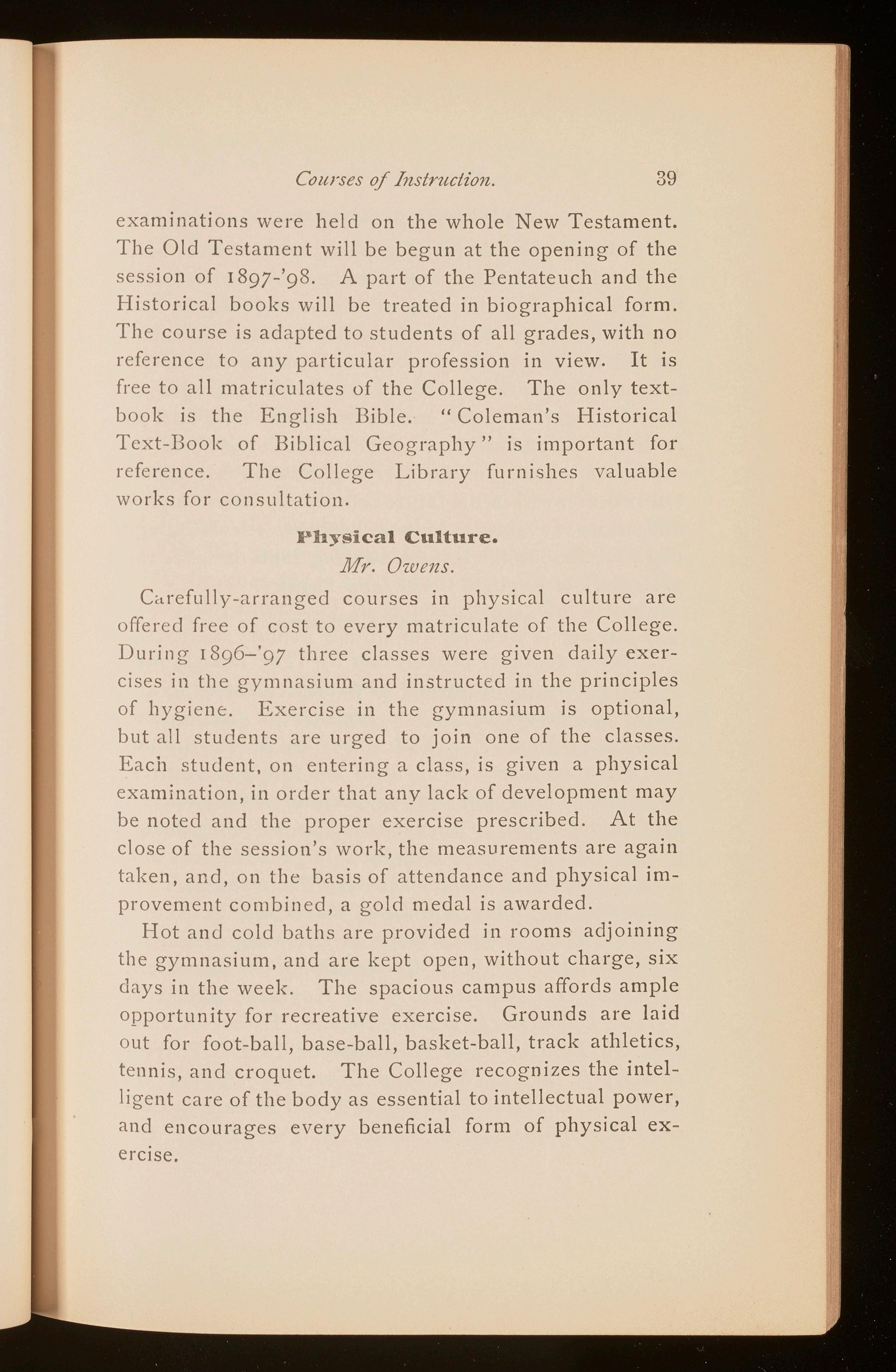
Courses of Instruction.
39 examinations were held on the whole New Testament. The Old Testament will be begun at the opening of the session of I 897-'98. A part of the Pentateuch and the Historical books will be treated in biographical form. The course is adapted to students of all grades, with no reference to any particular profession in view. It is free to all matriculates of the College. The only textbook is the English Bible. "Coleman's Historical Text-Book of Biblical Geography" is important for reference. The College Library furnishes valuable works for consultation.
Mr. Owens.
Ctrefully-arranged courses in physical culture are offered free of cost to every matriculate of the College. During 1896-'97 three classes were given daily exercises in the gymnasium and instructed in the principles of hygiene. Exercise in the gymnasium is optional, but all students are urged to join one of the classes. Each student, on entering a class, is given a physical examination, in order that any lack of development may be noted and the proper exercise prescribed. At the close of the session's work, the measurements are again taken, and, on the basis of attendance and physical improvement combined, a gold medal is awarded.
Hot and cold baths are provided in rooms adjoining the gymnasium, and are kept open, without charge, six days in the week. The spacious campus affords ample opportunity for recreative exercise. Grounds are laid out for foot-ball, base-ball, basket-ball, track athletics, tennis, and croquet. The College recognizes the intelligent care of the body as essential to intellectual power, and encourages every beneficial form of physical exercise.
40

Richmond College.
University Extension.
For many years series of popular lectures have been delivered in Richmond and elsewhere by professors in the College. In the spring of I 892 was given the first regular Extension course with syllabus, class-work, and guided reading. Other extension courses offered by the professors of Greek, Physics, and Modern Languages have been well attended, and have aroused fresh interest in literature and science. While the College has no organized department for carrying forward this important work, it will in the future continue to extend higher educational advantages to those unable to attend College classes. Among the lecturers during I 896-'97 were the professors of English, Greek, and Physics.
The Thomas Lectures.
These lectures are provided for by" The Thomas Museum Lecture Endowment" of $10,000, donated by his family in memory of the late President of the corporation, James Thomas, Jr., Esq. They are delivered annually by eminent men of our own and foreign countries, on Science, Philosophy, Art, or Literature, and by special provision are open to the public. The following distinguished scholars have delighted large audiences and greatly stimulated literary and scientific research.
Charles A. Young, Ph. D., of Princeton; H. Newell Martin, Ph. D., of Johns Hopkins University; William T. Harris, LL, D., U. S. Commissioner of Education; President D. C. Gilman, of Johns Hopkins; Robert T. Tyrrell, University of Dublin, Ireland; Horace H. Furness, Ph. D., LL. D., of Philadelphia; Prof. C. T. Winchester, A. M., of Wesleyan University; Albion w: Small, Ph. D., Head Professor of Social Science in Chicago_ University; and G. Stanley Hall, Ph. D., LL. D.,
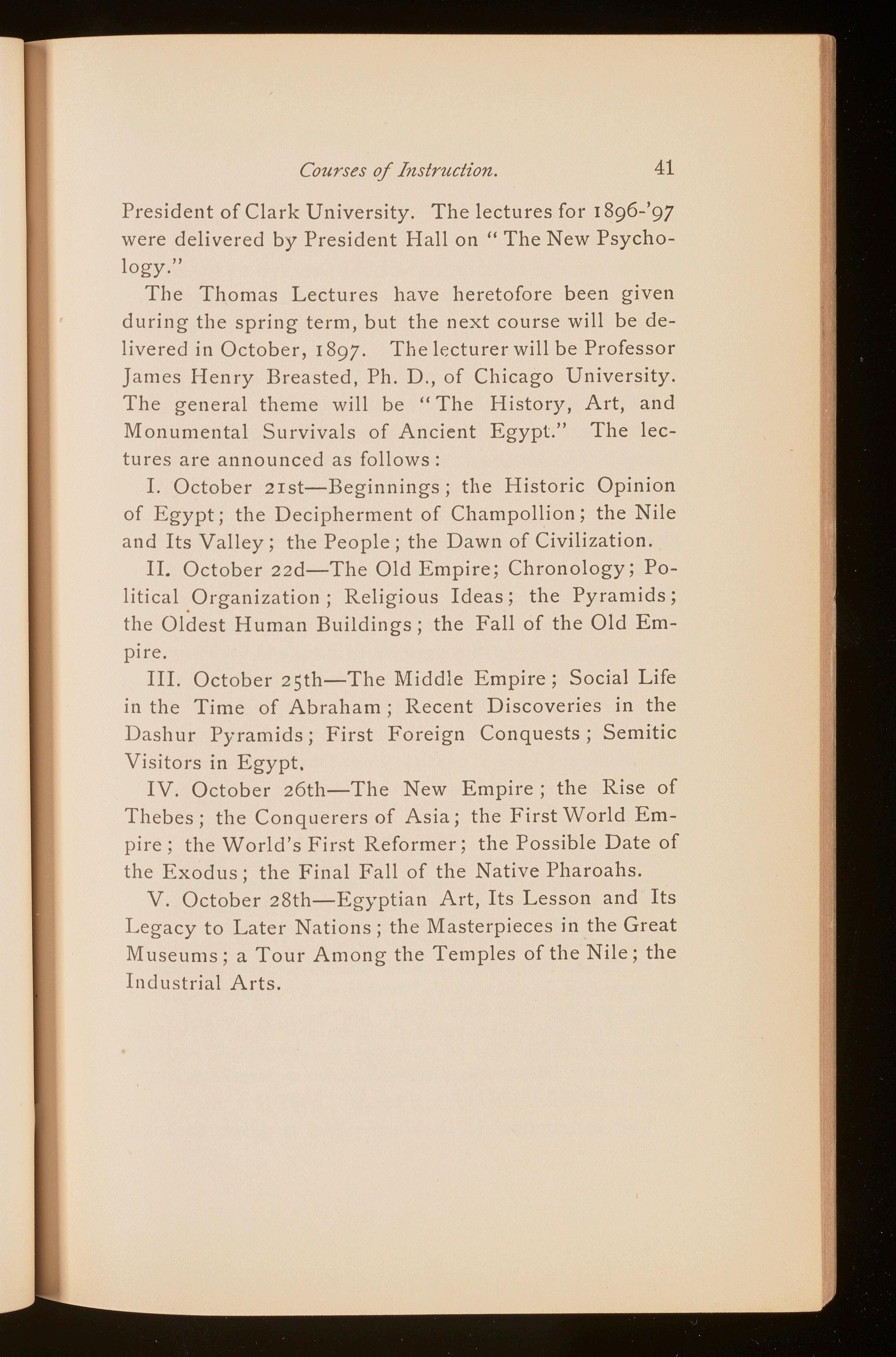
President of Clark University. The lectures for I 896-'97 were delivered by President Hall on "The New Psychology."
The Thomas Lectures have heretofore been given during the spring term, but the next course will be delivered in October, I 897. The lecturer will be Professor James Henry Breasted, Ph. D., of Chicago University. The general theme will be "The History, Art, and Monumental Survivals of Ancient Egypt." The lectures are announced as follows:
I. October 21st-Beginnings; the Historic Opinion of Egypt; the Decipherment of Champollion; the Nile and Its Valley; the People; the Dawn of Civilization.
II. October 22d-The Old Empire; Chronology; Political Organization; Religious Ideas; the Pyramids; the Oldest Human Buildings; the Fall of the Old Empire.
III. October 25th-The Middle Empire; Social Life in the Time of Abraham; Recent Discoveries in the Dashur Pyramids; First Foreign Conquests; Semitic Visitors in Egypt,
IV. October 26th-The New Empire; the Rise of Thebes; the Conquerers of Asia; the First World Empire; the World's First Reformer; the Possible Date of the Exodus; the Final Fall of the Native Pharoahs.
V. October 28th-Egyptian Art, Its Lesson and Its Legacy to Later Nations; the Masterpieces in the Great Museums; a Tour Among the Temples of the Nile; the Industrial Arts.
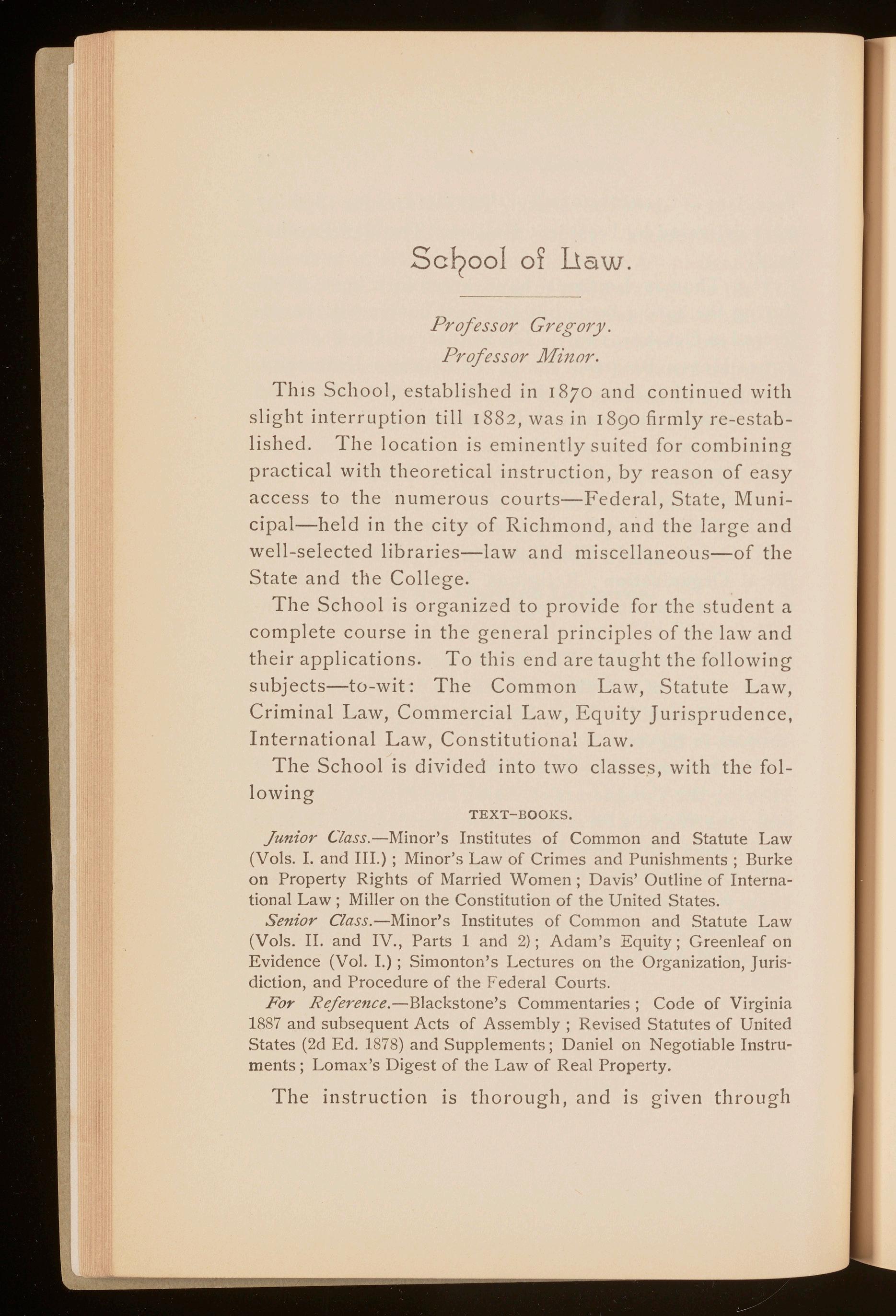
Professor Gregory.
Professor Minor.
This School, established in 1870 and continued with slight interruption till 1882, was in 1890 firmly re-established. The location is eminently suited for combining practical with theoretical instruction, by reason of easy access to the numerous courts-Federal, State, Municipal-held in the city of Richmond, and the large and well-selected libraries-law and miscellaneous-of the State and the College.
The School is organi2cd to provide for the student a complete course in the general principles of the law and their applications. To this end are taught the following subjects-to-wit: The Common Law, Statute Law, Criminal Law, Commercial Law, Equity Jurisprudence, International Law, Constitutional Law.
The School is divided into two classes, with the following
TEXT-BOOKS.
Junior Class.-Minor's Institutes of Common and Statute Law (Vols. I. and III.); Minor's Law of Crimes and Punishments; Burke on Property Rights of Married Women; Davis' Outline of International Law; Miller on the Constitution of the United States.
Senior Class.-Minor's Institutes of Common and Statute Law (Vols. II. and IV., Parts 1 and 2); Adam's Equity; Greenleaf on Evidence (Vol. I.); Simonton's Lectures on the Organization, Jurisdiction, and Procedure of the Federal Courts.
For Re.ference.-Blackstone's Commentaries; Code of Virginia 1887 and subsequent Acts of Assembly ; Revised Statutes of United States (2d Ed. 1878) and Supplements; Daniel on Negotiable Instruments; Lomax's Digest of the Law of Real Property.
The instruction is thorough, and is given through
School of Law.
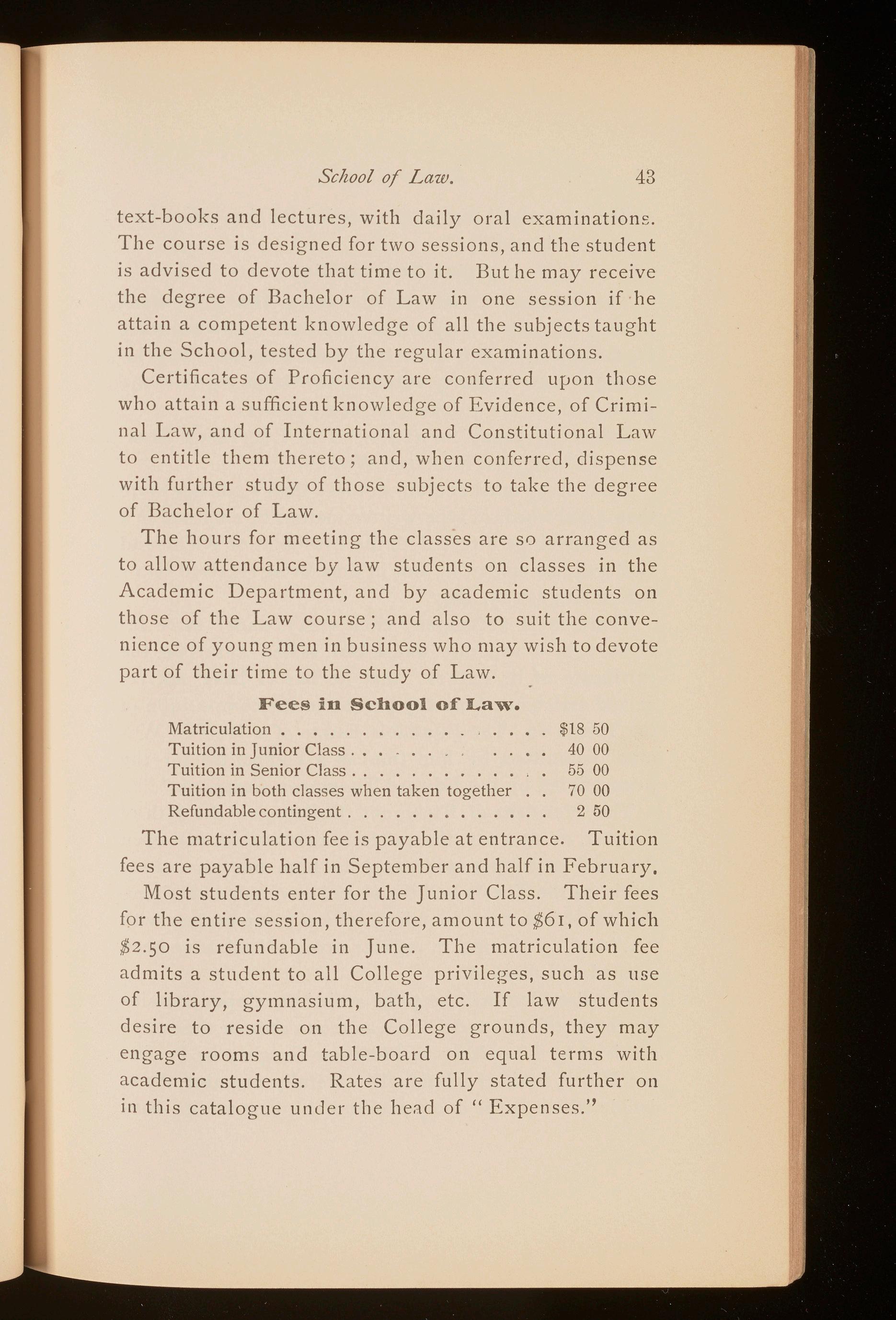
43
text-books and lectures, with daily oral examinations. The course is designed for two sessions, and the student is advised to devote that time to it. But he may receive the degree of Bachelor of Law in one session if he attain a competent knowledge of all the subjects taught in the School, tested by the regular examinations.
Certificates of Proficiency are conferred upon those who attain a sufficient knowledge of Evidence, of Criminal Law, and of International and Constitutional Law to entitle them thereto; and, when conferred, dispense with further study of those subjects to take the degree of Bachelor of Law.
The hours for meeting the classes are so arranged as to allow attendance by law students on classes in the Academic Department, and by academic students on those of the Law course; and also to suit the convenience of young men in business who may wish to devote part of their time to the study of Law.
Fees in School of' Law.
Matriculation
Tuition
The matriculation fee is payable at entrance. Tuition fees are payable half in September and half in February, Most students enter for the Junior Class. Their fees for the entire session, therefore, amount to $61, of which ,$2.50 is refundable in June. The matriculation fee admits a student to all College privileges, such as use of library, gymnasium, bath, etc. If law students desire to reside on the College grounds, they may engage rooms and table-board on equal terms with academic students. Rates are fully stated further on in this catalogue under the hec1d of "Expenses.''
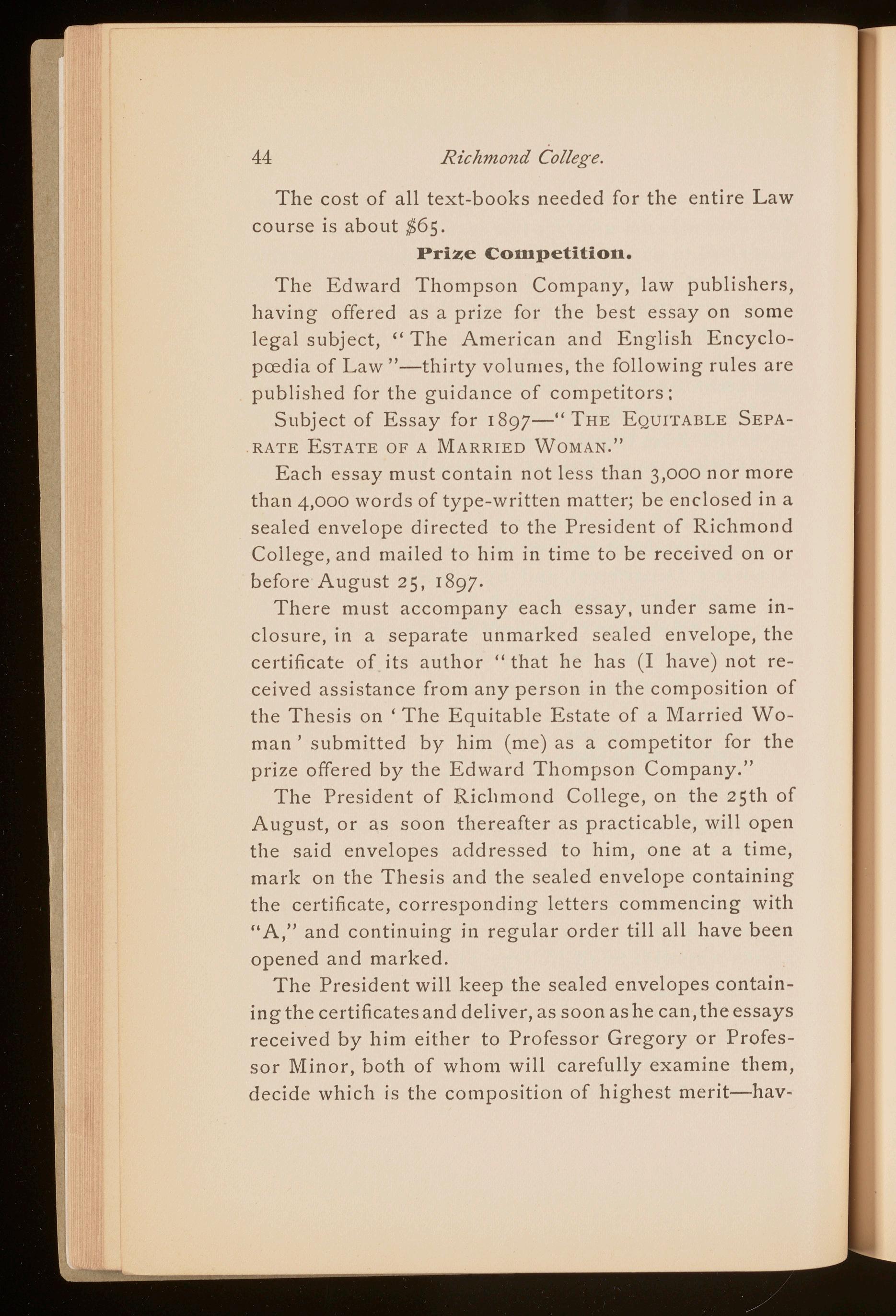
44 Richmond College.
The cost of all text-books needed for the entire Law course is about $65.
Prb;e Co111petition.
The Edward Thompson Company, law publishers, having offered as a prize for the best essay on some legal subject, "The American and English Encyclopcedia of Law "-thirty volumes, the following rules are published for the guidance of competitors: Subject of Essay for 1897-" THE EQUITABLE SEPARATE ESTATE OF A MARRIED WOMAN."
Each essay must contain not less than 3,000 nor more than 4,000 words of type-written matter; be enclosed in a sealed envelope directed to the President of Richmond College, and mailed to him in time to be received on or before August 25, 1897.
There must accompany each essay, under same inclosure, in a separate unmarked sealed envelope, the certificate of its author "that he has (I have) not received assistance from any person in the composition of the Thesis on 'The Equitable Estate of a Married Woman' submitted by him (me) as a competitor for the prize offered by the Edward Thompson Company."
The President of Richmond College, on the 25th of August, or as soon thereafter as practicable, will open the said envelopes addressed to him, one at a time, mark on the Thesis and the sealed envelope containing the certificate, corresponding letters commencing with "A," and continuing in regular order till all have been opened and marked.
The President will keep the sealed envelopes containing the certificates and deliver, as soon as he can, the essays received by him either to Professor Gregory or Professor Minor, both of whom will carefully examine them, decide which is the composition of highest merit-hav-
School of Law.
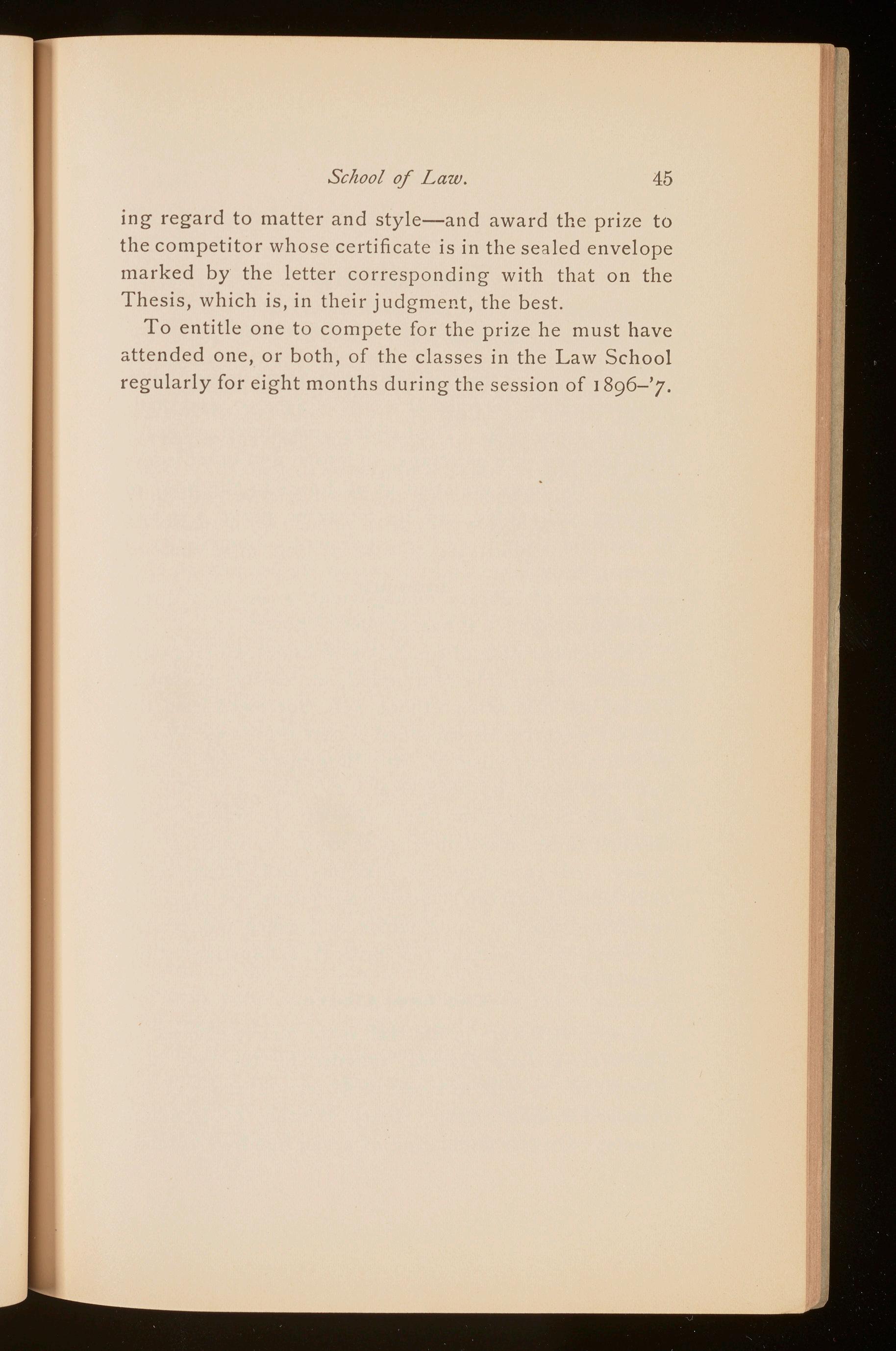
45
ing regard to matter and style-and award the prize to the competitor whose certificate is in the sealed envelope marked by the letter corresponding with that on the Thesis, which is, in their judgmeD.t, the best.
To entitle one to compete for the prize he must have attended one, or both, of the classes in the Law School regularly for eight months during the session of I 896-'7.
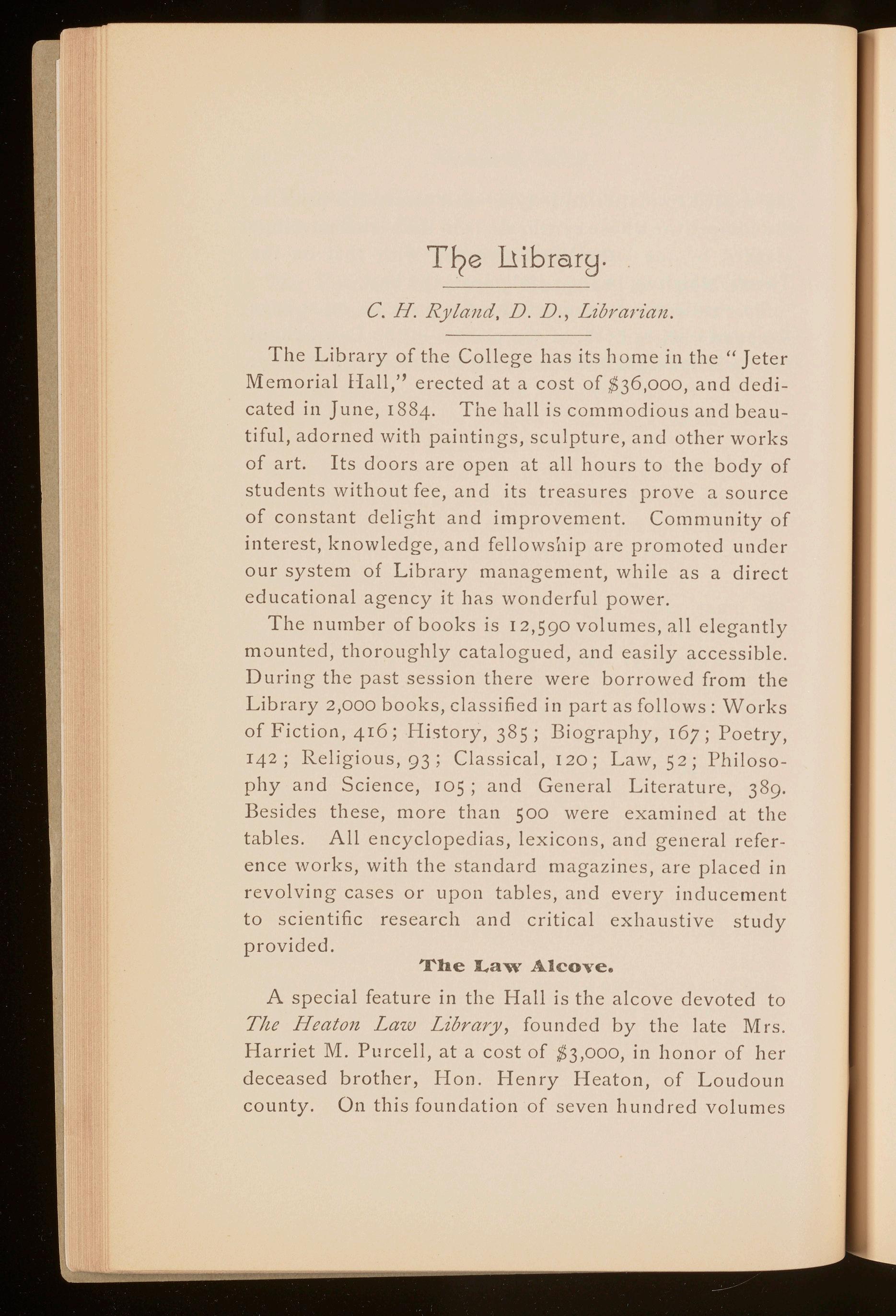
C.H. Ryland, D. D., Librarian.
The Library of the College has its home in the" Jeter Memorial Hall,'' erected at a cost of $36,000, and dedicated in June, 1884. The hall is commodious and beautiful, adorned with paintings, sculpture, an<l other works of art. Its doors are open at all hours to the body of students without fee, and its treasures prove a source of constant delight and improvement. Community of interest, knowledge, and fellowship are promoted under our system of Library management, while as a direct educational agency it has wonderful power.
The number of books is 12,59ovolumes,all elegantly mounted, thoroughly catalogued, and easily accessible. During the past session there were borrowed from the Library 2,000 books, classified in part as follows: Works of Fiction, 416; Hi-,tory, 385; Biography, 167; Poetry, 142; Religious, 93; Classical, 120; Law, 52; Philosophy and Science, 105; and General Literature, 389. Besides these, more than 500 were examined at the tables. All encyclopedias, lexicons, and general reference works, with the standard magazines, are placed in revolving cases or upon tables, and every inducement to scientific research and critical exhaustive study provided.
The Law Alcove.
A special feature in the Hall is the alcove devoted to T!te Heaton Law Library, founded by the late Mrs. Harriet M. Purcell, at a cost of $3,000, in honor of her deceased brother, Hon. Henry Heaton, of Loudoun county. On this foundation of seven hundred volumes
The Libra1y.

4.7
the College is building by yearly accessions of valuable Reports from the General and State Governments. Reading-Roont.
The Reading-Room is supplied with the best dailies, weeklies, and monthlies. Sixty magazines, and all leading newspapers, comprising the best literary, scientific, educational, and religious publications of America, are subscribed for regularly. To these are added all the college magazines and a number of French and German papers. Excellent provision is made for gathering and compiling missionary intelligence, while Bible study is encouraged by placing within the reach of all the most modern helps and the best commentaries. Museu1n.
The Trustees have dedicated a spacious and beautiful room 1oox45 feet, high pitched, well lighted, and finished in fresco and hard wood, to the memory of the late James Thomas, of Richmond. Preparation is being made to mount the growing Museum and Art Collection of the College in this apartment. Already valuable articles from our own and foreign lands, consisting of curios, paintings, statuary, with collections in the lines of Geology, Mineralogy, Ethnology, are displayed, awaiting final arrangement.
The largest gift during the year came from an Alumnus, Rev. Hugh P. McCormick, of Morelia, Mexico. This gift consists of a valuable collection of articles illustrating the social, political, and religious life of the Mexican people. The specimens have been gathered with great care, and are thoroughly representative.
Gifts are solicited from friends at home and abroad, that visitors may be attracted and students stimulated. The Librarian is curator, and all contributions should be forwarded to him.

48 Richmond College.
Portraits.
The Gallery of Paintings is being gradually enriched by poi:traits of the distinguished friends of the College. The Trustees gratefully acknowledge portraits of Rev. Edward Baptist, Professor H. H. Harris, and Mrs. Henry L. Schmelz.
The Trustees solicit gifts for the Library and its several departments. Books are gladly received. Perhaps nothing about the College so interests the visiting public as its collection of portraits, statuary, curios, and relics. It is within the power of Alumni and other friends greatly to enrich the present display, and their efforts in this direction will be appreciated.

Two literary societies, known as the Mu SIGMA RHo and PmLOLOGIAN, are maintained by the students, and arc recognized as agencies of great value in scholastic training. They are provided with elegant halls where they hold weekly meetings for declamation, debate, and other literary exercises. Besides the joint celebration at Commencement, each society arranges for at least one public debate during the session. The two societies unite in publishing the Messenger, a monthly magazine of about seventy-five pages. A generous rivalry is maintained between the two organizations by the joint offer of an orator's medal and a writer's medal, and among the individ11al members by the offer in each society of a medal for improvement in debate and for the best debater. The medallists for I 896-'97 were as follows :
Joint Orator's.-C. G. McDaniel, Philologian. joint Writer's.-James R. Stafford, Philologian. Mu SIGMA RHo.
Improvement.-James P. McCabe. Best Debater's.-B. Mercer Hartman. PHILOLOGIAN.
Improvement.-Sands Gale. Best Debater's.-Arthur J. Hall.
Geographical and Historical Society.
This Society was organized in I 891 for the purpose of cultivating more accurate acquaintance with the past

50 Richmond College. and present of the land we live in, and particularly for developing the habit of investigation from original sources. Papers of great interest and permanent value have been produced and published by active members of the Society, and a number of distinguished gentlemen have accepted honorary membership, and have favored the Society with addresses. Among those who Juve thus aided are Mr. R. A. Brock, Secretary of the Southern Historical Society; Dr. Daniel C. Gilman, President of Johns Hopkins University; Mr. Charles Poindexter, ex-State Librarian; Hon. J. L. M. Curry; Prof. O. T. Mason, of the Smithsonian Institution; President Lyo!1 G. Tyler; of William and Mary College, and J. Wiliiam Jones, D. D., of the Miller School. The seventh annual address will be delivered in October, l 897.
Trustees, professors, and students are equally entitled to membership, and all three classes are well represented. Meetings occur twice a month. A gold medal is offered for the best historical essay. The College bas granted a day in the spring to be known as Historical Day. The excursion for 1897 was to Mt. Vernon and Washington.
Law A!lsociation.
During the session of 1895-'96, the Richmond College Law Association was organized by students of the School of Law for the discussion of literary and legal que5tions. The Association supplies the place of a moot court, and is wider in its scope. Meetings are held every Saturday evening in the Philologian Hall.
The students maintain an active Young Men's Christian Association, whose object is to promote the spiritual and moral welfare of the College and to do religious
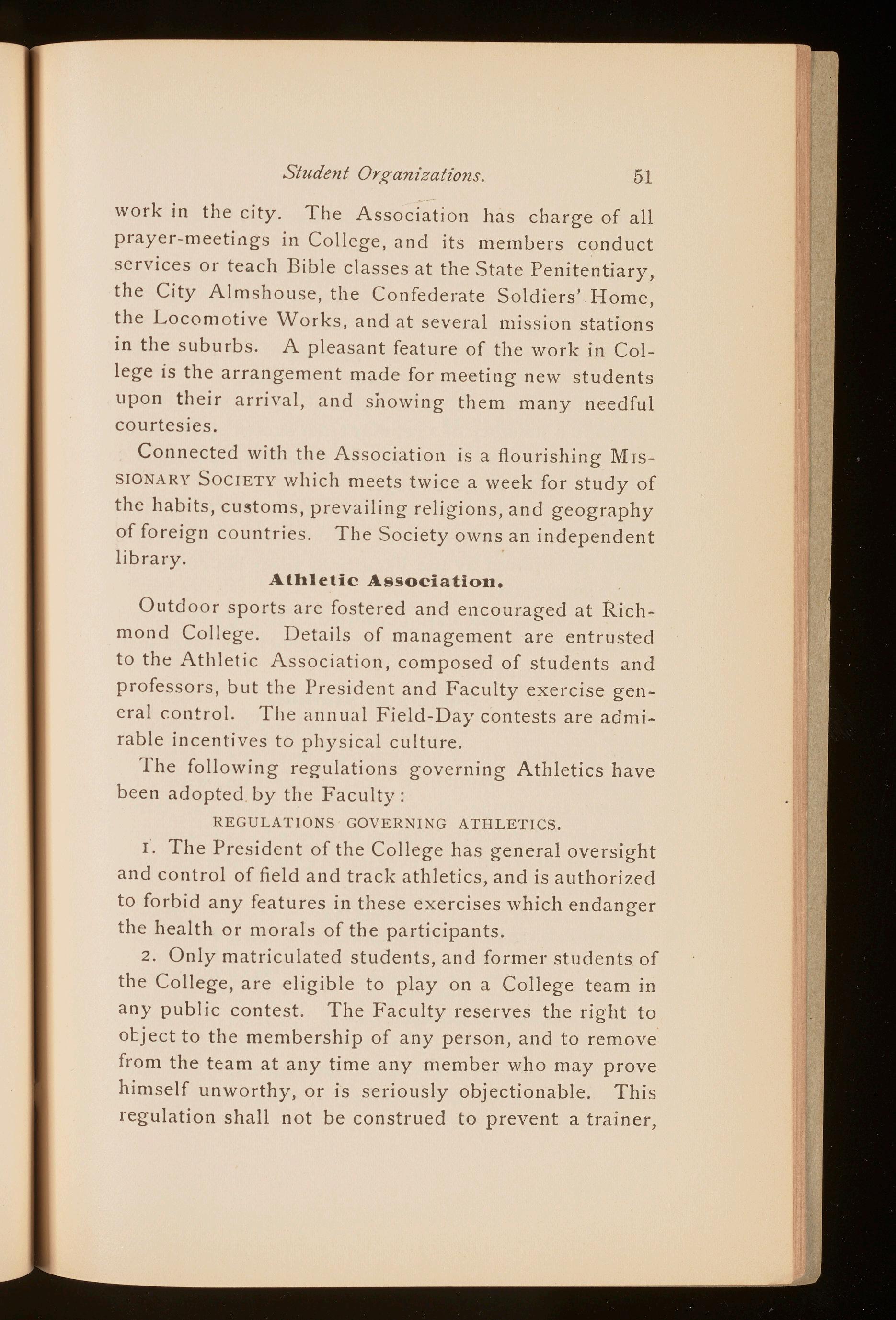
Student Organizations.
51 work in the city. The Association has charge of all prayer-meetiags in College, and its members conduct services or teach Bible classes at the State Penitentiary, the City Almshouse, the Confederate Soldiers' Home, the Locomotive Works, and at several mission stations in the suburbs. A pleasant feature of the work in College is the arrangement made for meeting new students upon their arrival, and snowing them many needful courtesies.
Connected with the Association is a flourishing MISSIONARY SOCIETY which meets twice a week for study of the habits, cu~toms, prevailing religions, and geography of foreign countries. The Society owns an independent library.
Athletic Association.
Outdoor sports are fostered and encouraged at Richmond College. Details of management are entrusted to the Athletic Association, composed of students and professors, but the President and Faculty exercise general control. The annual Field-Day contests are admirable incentives to physical culture.
The following regulations governing Athletics have been adopted by the Faculty: REGULATIONS GOVERNING ATHLETICS.
r. The President of the College has general oversight and control of field and track athletics, and is authorized to forbid any features in these exercises which endanger the health or morals of the participants.
2. Only matriculated students, and former students of the College, are eligible to play on a College team in any public contest. The Faculty reserves the right to ol::ject to the membership of any person, and to remove from the team at any time any member who may prove himself unworthy, or is seriously objectionable. This regulation shall not be construed to prevent a trainer,

52 Rz"chmond College. who has been approved by the Faculty, from playing with any team.
3. Each team is allowed four trips from College, provided that these four trips do not involve being away from College more than four school days. All proposed games must have the approval of the President of the College before engagements are made.
4. No student under 2 I years of age is permitted to become a member of a regular team except upon written permission from his parent or guardian, addressed to the President of the College.
5. Any member of an athletic team who is reported for neglect of his studies or non-atteudance on lectures may be required by the Faculty to sever his connection with such team.
6. Athletic teams are permitted to engage in contests away from Richmond only with teams from other institutions of learning.
Society o:f Alumni.
The Alumni of the College have long been organized into a society which holds annual meetings to renew old associations, maintain a close connection with Alma Mater, and further the cause of education and letters. For several years the custom has been to have an annual banquet on \,Vednesday evening of Commencement week. The officers of the Society are:
HON. J. ALSTON CABELL, Richmond, Va .....••.. President.
DR. W. P. MATHEWS, Manchester, Va .•... First Vice-President.
REV. JOHN W. MITCHELL, Portsmouth, Va Second Vice-President.
DR. J. E. TOMPKINS, Fredericksburg, Va. . . Third Vice-President.
S. LEE KELLY, EsQ., Richmond, Va ...•••..•.. Secretary.
DR. J. PAGE MASSIE, Richmond, Va .....•..... Treasurer.
Degree men are ex-officio members of the Society, and all former students are eligible for election. The initiation fee of $3 has been abolished, and an annual fee of $ r substituted therefor.
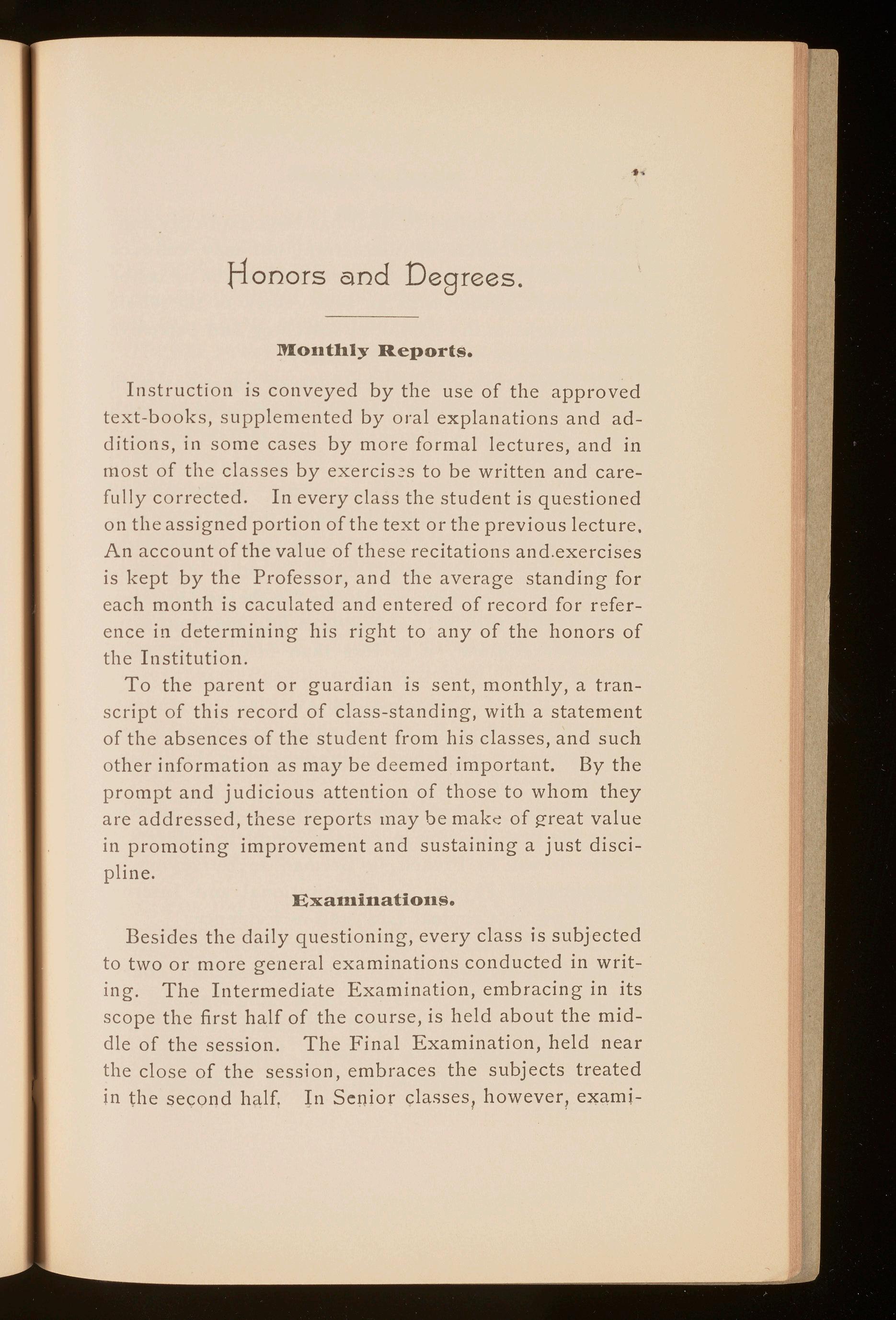
Instruction is conveyed by the use of the approved text-books, supplemented by oral explanations and additions, in some cases by more formal lectures, and in most of the classes by exercis::s to be written and carefully corrected. In every class the student is questioned on the assigned portion oft he text or the previous lecture. An account of the value of these recitations and .exercises is kept by the Professor, and the average standing for each month is caculated and entered of record for refere nce in determining his right to any of the honors of the Institution.
To the parent or guardian is sent, monthly, a trans cript of this record of class-standing, with a statement of the absences of the student from his classes, and such o ther information as may be d eemed important. By the prompt and judicious attention of those to whom they are addressed, these reports may be make of iueat value i n promoting improvement and sustaining a just discipline.
Besides the daily questioning, every class is subjected t o two or more general examinations conducted in writi ng. The Intermediate Examination, embracing in its scope the first half of the course, is held about the middle of the session. The Final Examination, held near t he close of the session, embraces the subjects treated i n the second half. ln Senior classes, however, exami-

54 Richmond College.
nations are not limited to what has been explicitly contained in the course of instruction, but may embrace passages or problems that have not been taken up in the class-room, together with an oral review of the whole course taught in the school, as searching and extensive as the Professor may deem necessary.
For these examinations a series of questions, with certc1in numerical values attached, is prepared for each class. The answers furnished by each student are carefully valued, and this valuation is equitably combined with the average of his class-standing. If the mark of a student, as thus ascertained, amount to eighty per centum in classes required for a Certificate of Proficiency, a School Diploma, or any Degree, in other classes to seventy-five per centum, he is r:rnked in the first division; if to less than this bLit not less than fifty per centum, in the second divz"sion ,· if to less than fifty, in the tltird dz"vision.
Certificates of Distinction are awarded to students who attain the first division at either examination, and their names are published or announced in the closing exercises of the session.
Certificates of Proficiency are conferred on all who attain the first division in certain complete subjects of study-to-wit, in French, in German, in Surveying, in Experimental Physics, in Constitutional and International Law, in Criminal Law, and in Evidence.
Sc/zoo! Diplomas are conferred on those who attain to the first division in the full undergraduate course taught in each school-to-wit, Latin Language and Literature, Greek Language and Literature, French a11d German Languages and Literature, English Language and Literature, Mathematics, Physics, Chemistry, and Philosophy.
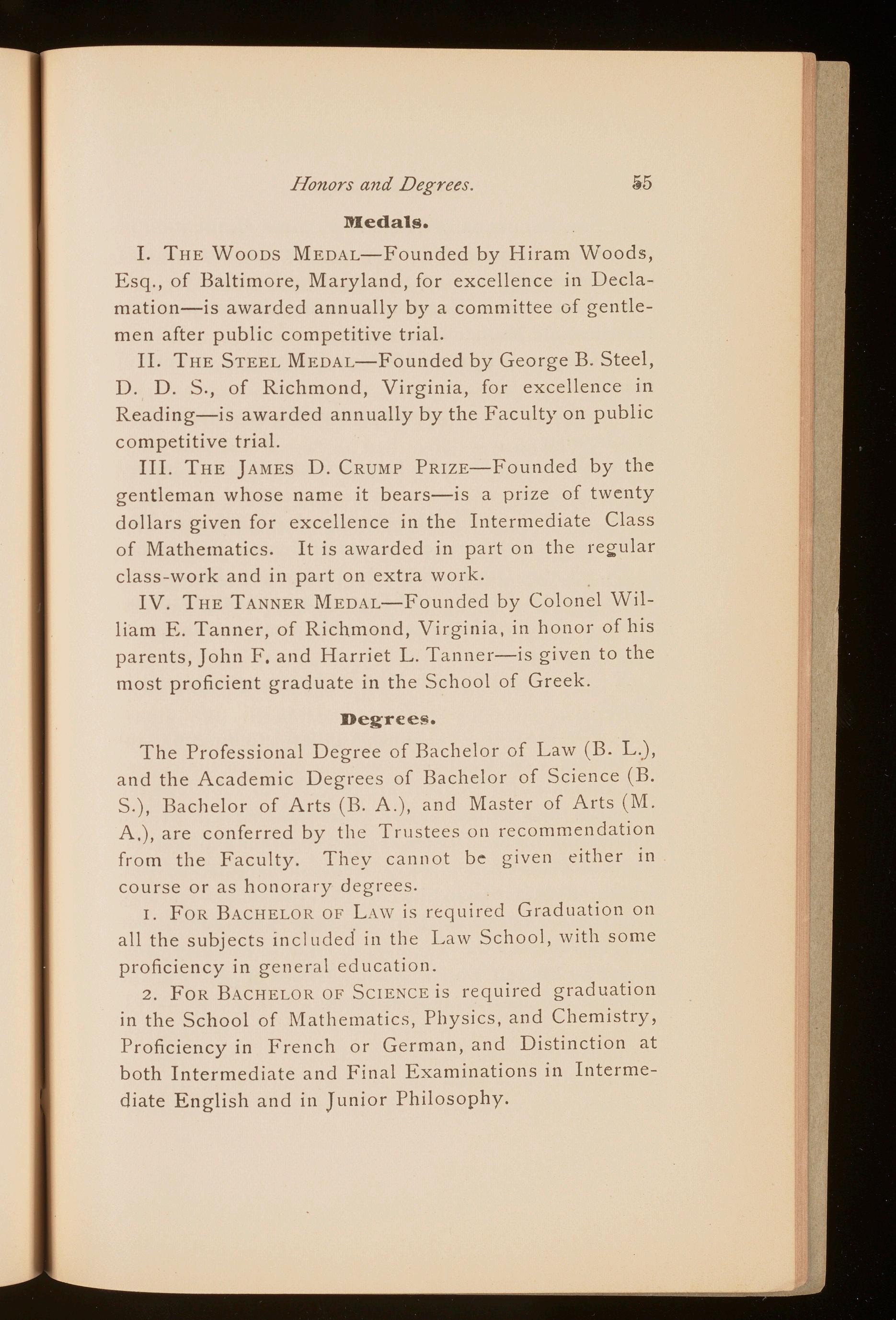
Honors and Degrees. Medals.
I. THE WooDs MEDAL-Founded by Hiram Woods, Esq., of Baltimore, Maryland, for excellence in Declamation-is awarded annually by a committee of gentlemen after public competitive trial.
II. THE STEEL MEDAL-Founded by George B. Steel, D. D. S., of Richmond, Virginia, for excellence in Reading-is awarded annually by the Faculty on public competitive trial.
III. THE JAMES D. CRUMP PRIZE-Founded by the gentleman whose name it bears-is a prize of twenty dollars given for excellence in the Intermediate Class of Mathematics. It is awarded in part on the re~ular class-work and in part on extra work.
IV. THE TANNER MEDAL-Founded by Colonel William E. Tanner, of Richmond, Virginia, in honor of his parents, John F. and Harriet L. Tanner-is given to the most proficient graduate in the School of Greek.
Degrees.
The Professional Degree of Bachelor of Law (B. L..), and the Academic Degrees of Bachelor of Science (B. S.), Bachelor of Arts (B. A .) , and Master of Arts ( M. A. ) , are conferred by the Trnstees on recommendation from the Faculty. They cannot be given either in course or as honorary degrees.
I. FoR BACHELOROF L.\W is required Graduation on all the subjects incluclec.i in the Law School, with some proficiency in general education.
2. FoR BACHELOROF SCIENCEis required graduation in the School of Mathematics, Physics, and Chemistry, Proficiency in French or German, and Distinction at both Intermediate and Final Examinations in Intermediate English and in Junior Philosophy.
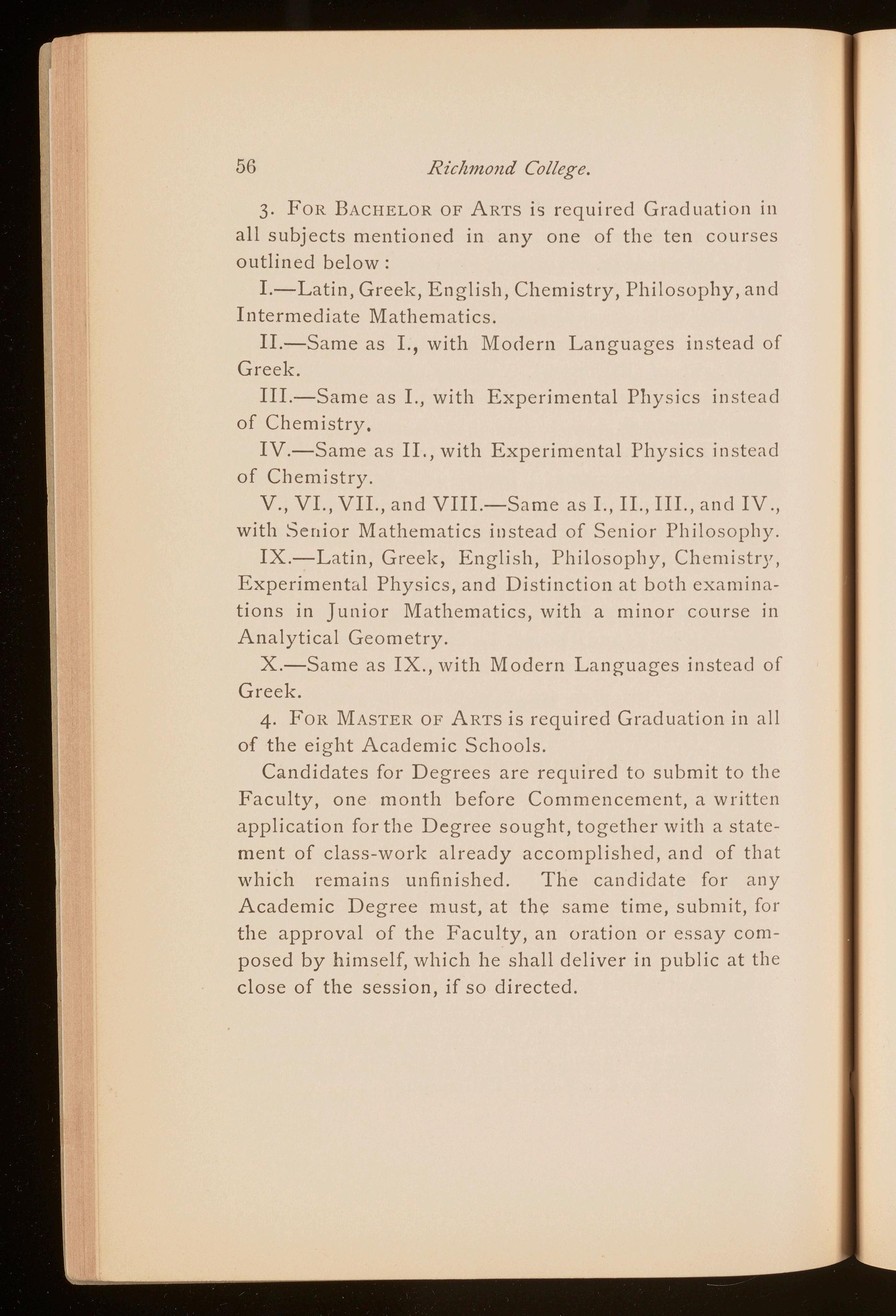
Richmond College.
3. FoR BACHELOROF ARTS is required Graduation in all subjects mentioned in any one of the ten courses outlined below:
!.-Latin, Greek, English, Chemistry, Philosophy, and Intermediate Mathematics.
II.-Same as I., with Modern Languages instead of Greek.
III.-Same as I., with Experimental Pl1ysics instead of Chemistry.
IV.-Same as II., with Experimental Physics instead of Chemistry.
V., VI., VII., and VIII.-Same as I., II., III., and IV., with Senior Mathematics instead of Senior Philosophy.
IX.-Latin, Greek, English, Philosophy, Chemistry, Experimental Physics, and Distinction at both examinations in Junior Mathematics, with a minor course in Analytical Geometry.
X .-Same as IX., with Modern Languages instead of Greek.
4. FOR MASTER OF ARTS is required Graduation in all of the eight Academic Schools.
Candidates for Degrees are required to submit to the Faculty, one month before Commencement, a written application for the Degree sought, together with a statement of class-work already accomplished, and of that which remains unfinished. The candidate for any Academic Degree must, at the same time, submit, for the approval of the Faculty, an oration or essay composed by himself, which he shall deliver in public at the close of the session, if so directed.
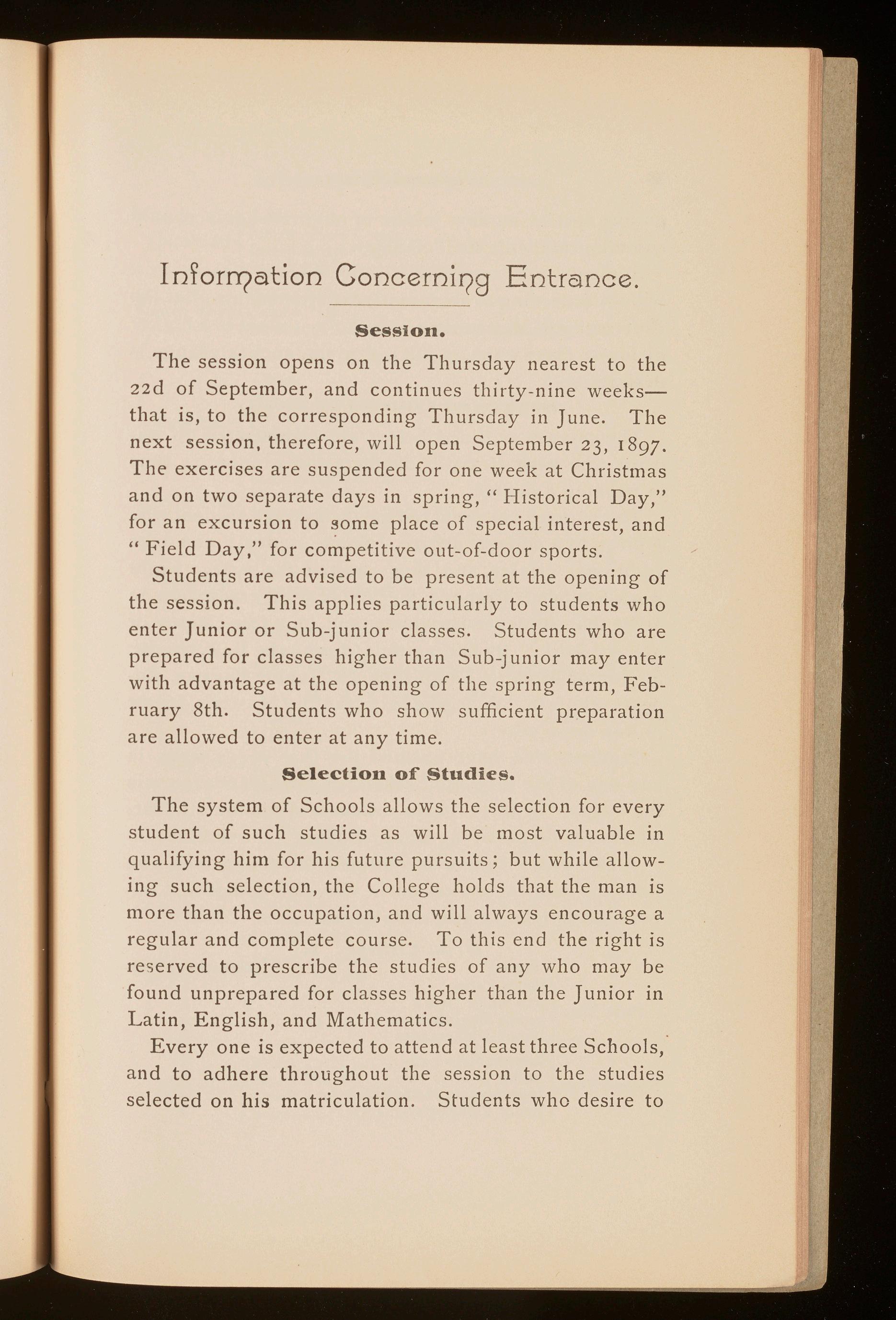
The session opens on the Thursday nearest to the 22d of September, and continues thirty-nine weeksthat is, to the corresponding Thursday in June. The next session, therefore, will open September 23, I 897. The exercises are suspended for one week at Christmas and on two separate days in spring," Historical Day," for an excursion to some place of special interest, and "Field Day," for competitive out-of-door sports.
Students are advised to be present at the opening of the session. This applies particularly to students who enter Junior or Sub-junior classes. Students who are prepared for classes higher than Sub-junior may enter with advantage at the opening of the spring term, February 8th. Students who show sufficient preparation are allowed to enter at any time.
The system of Schools allows the selection for every student of such studies as will be most valuable in qualifying him for his future pursuits; but while allowing such selection, the College holds that the man is more than the occupation, and will always encourage a regular and complete course. To this end the right is reserved to prescribe the studies of any who may be found unprepared for classes higher than the Junior in Latin, English, and Mathematics.
Every one is expected to attend at least three Schools," and to adhere throughout the session to the studies selected on his matriculation. Students who desire to

Riclmzond College.
pursue special studies in one or more Schools should communicate with the President.
Students are assigned to the several classes in a School according to their apparent attainments; but the Professor will, at any time, transfer a student to a higher or lower class when, in his judgment, such a change is desirable.
Suggested Courses oC Study.
The courses outlined below are commended to students who wish to avoid conflicts and economize time in winning a degree.
The courses are prepared for the average student who aspires to a college degree. Some students can take additional classes, and thus shorten the time. Light work has been arranged for the year of graduation in order that students may have time for extra classes or literary work. By finding time, during the B. A. course, for Junior Modern Languages and Junior Physics, students who win this degree may take the Master's degree in one more year.
Students who have finished the first year's work in any one of the suggested schedules may, of course, win the degree in three years. Course V. is for students who come prepared for Senior classes,
A two years' course is outlined for young men who have the medical profession in view and consider it impossible to take an academic degree.
B. A. Course. I. Classes. ( Junior Latin ..•.. F' t y Sub junior Gret k . . irs ear I Junior English .... LJunior Mathematics .• ( Intermediate Latin S
l

B, A. Course. II. Classes.
( Junior Latin ....•
First Year~ Jun!or French
1 Jumor English
LJunior Mathematics
( Intermediate Latin
Second Year J Senior F~ench : : Intermediate Maihtmat1cs
LJunior Philosophy
( Senior L<itin
Third Year~ Junior German Intermediate English
B. A. Course. III. Classes.
(Junior Latin
Fir t y j Junior French s ear") Junior English . . lJunior Mathematics .. rI_nte_rme?iate
l Intermediate Mathematics. lJ unior Physics, or Chemi,;try
rSenior Latin
Fourth Year Senior English Junior Philosophy ..
Tl . d y J Junior German . . Jir earl Senior Mathematics . l Intermediate English . 1 Senior German .
B. A. Course. IV. Clas,es.
(Junior Latin .
F " t y I Junior French irs ear i Junior English L

Third Year Intt;rmediate Mathemati~s { Junior German
Jumor Physics, or Chemistry Junior Philosophy .•...
Senior Latin
Fourth Year Sen!or Gern:ian ......•... Semor English
LSenior Philosophy, or Mathematics
B, A, Course. V. Classes.
1Senior Latin
Second Year~ <;he?1iS!ry
B, S, Course Classes.
1Junior French
First Year~ J un!or English
, Jumor Mathematics
Junior German
Second Year Intern:iediate Mathematics Chemistry .......
Junior Philosophy
Senior French, or Senior German .
Third Year Inte_rmediate Eng:Jish
Course Prelinlinary to Study of Medicine. Classes.
1Sub-junior Latin
First YearlJunjor English
Jumor Mathematics
1Junior Latin .
Second Year J Inter~ediate English
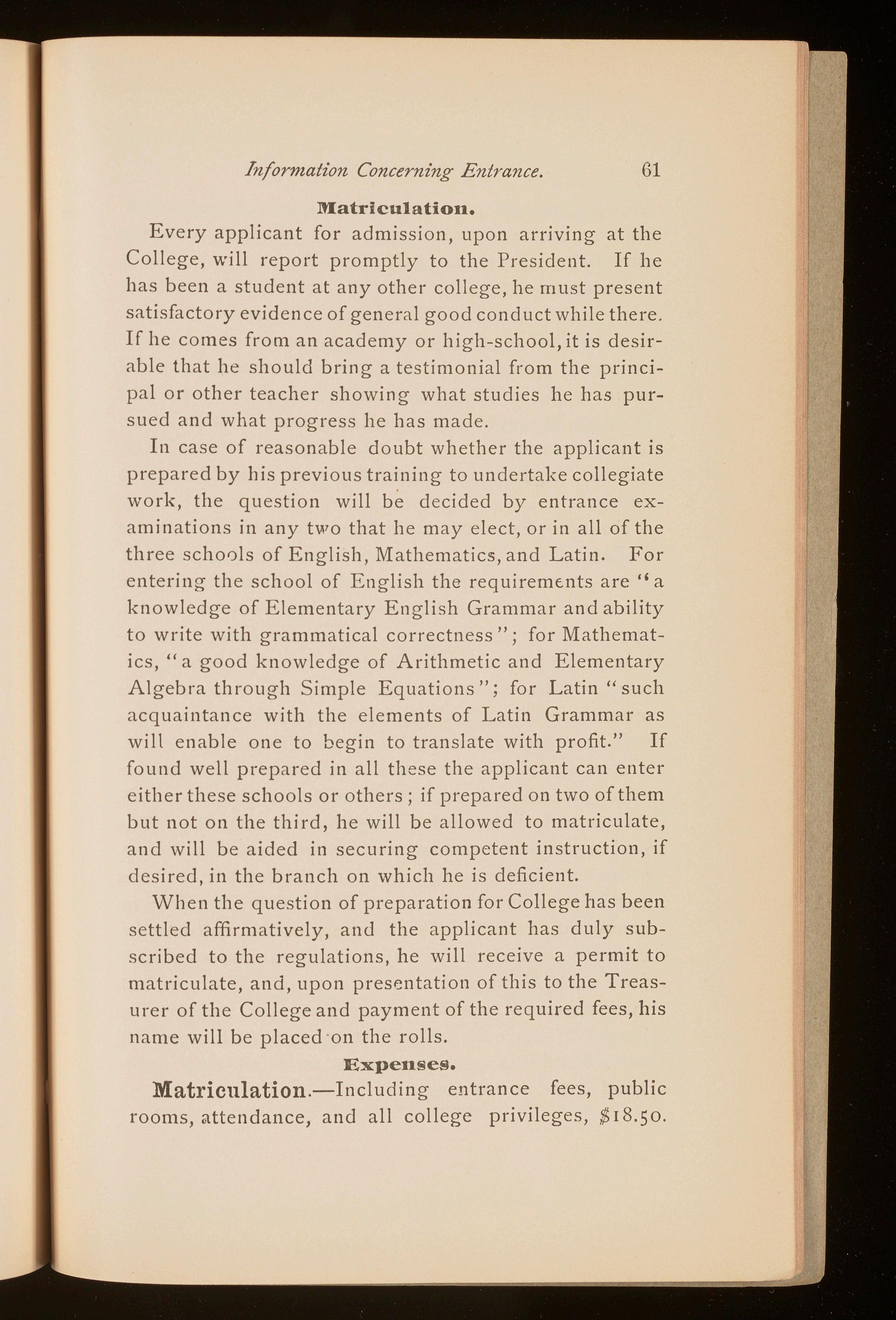
Every applicant for admission, upon arriving at the College, will report promptly to the President. If he has been a student at any other college, he must present satisfactory evidence of general good conduct while there. If he comes from an academy or high-school, it is desirable that he should bring a testimonial from the principal or other teacher showing what studies he has pursued and what progress he has made.
In case of reasonable doubt whether the applicant is prepared by his previous training to undertake collegiate work, the question will be decided by entrance examinations in any two that he may elect, or in all of the three scho0ls of English, Mathematics, and Latin. For entering the school of English the requiremc.nts are'' a knowledge of Elementary English Grammar and ability to write with grammatical correctness"; for Mathematics, "a good knowledge of Arithmetic and Elementary Algebra through Simple Equations"; for Latin "such acquaintance with the elements of Latin Grammar as will enable one to begin to translate with profit." If found well prepared in all these the applicant can enter either these schools or others; if prepared on two of them but not on the third, he will be allowed to matriculate, and will be aided in securing competent instruction, if desired, in the branch on which he is deficient.
When the question of preparation for College has been settled affirmatively, and the applicant has duly subscribed to the regulations, he will receive a permit to matriculate, and, upon presentation of this to the Treasurer of the College and payment of the required fees, his name will be placed ·on the rolls.
Expenses.
Matriculation.-Including entrance fees, public rooms, attendance, and all college privileges, $ I 8.50.
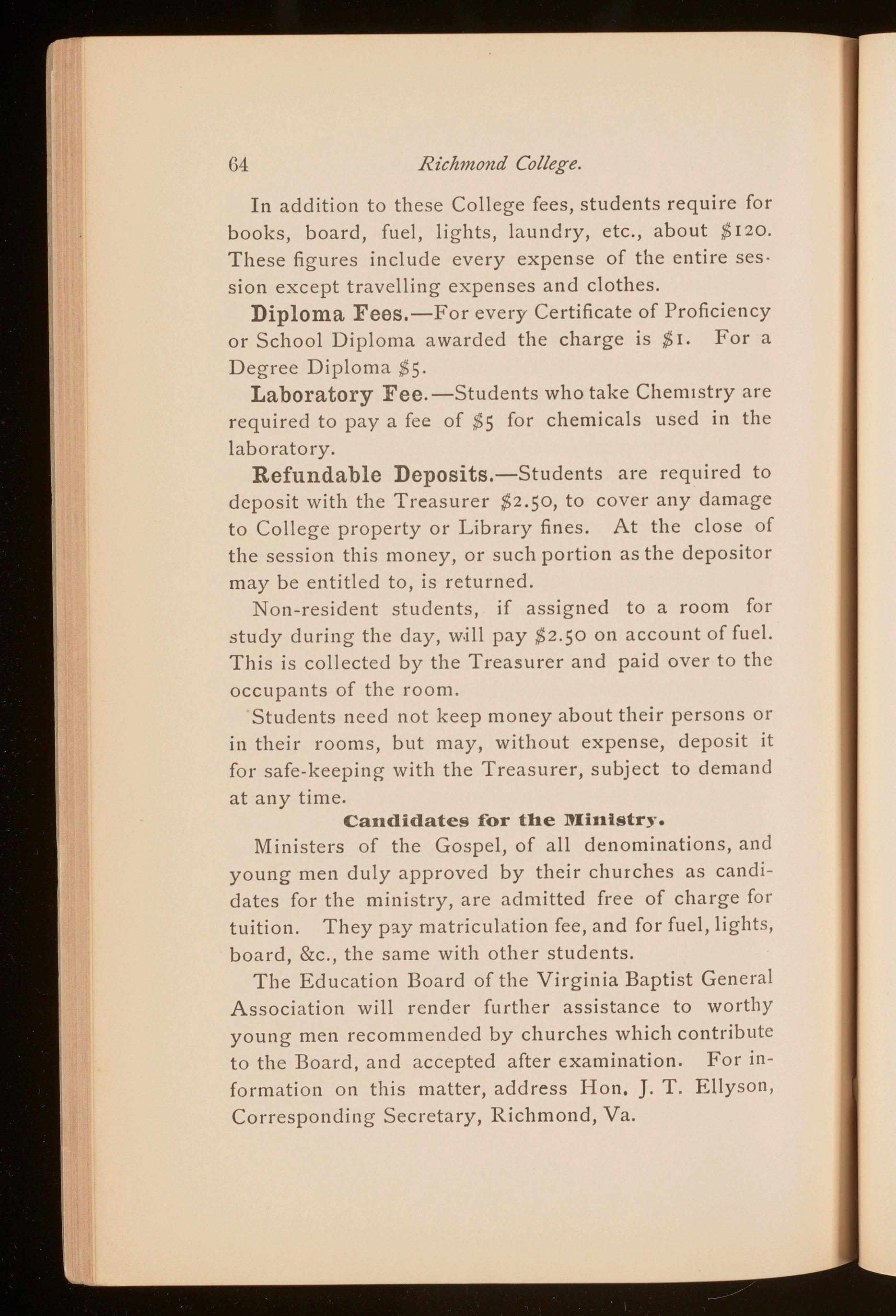
G4 Richmond College.
In addition to these College fees, students require for books, board, fuel, lights, laundry, etc., about $120. These figures include every expense of the entire session except travelling expenses and clothes.
Diploma Fees.-For every Certificate of Proficiency or School Diploma awarded the charge is $ I. For a Degree Diploma $5.
Laboratory Fee. -Students who take Chemistry are required to pay a fee of $5 for chemicals used in the laboratory.
Refundable Deposits.-Students are required to deposit with the Treasurer $2.50, to cover any damage to College property or Library fines. At the close of the session this money, or such portion as the depositor may be entitled to, is returned.
Non-resident students, if assigned to a room for study during the day, will pay $2.50 on account of fuel. This is collected by the Treasurer and paid over to the occupants of the room.
Students need not keep money about their persons or in their rooms, but may, without expense, deposit it for safe-keeping with the Treasurer, subject to demand at any time.
Candidates Cor the Ministry.
Ministers of the Gospel, of all denominations, and young men duly approved by their churches as candidates for the ministry, are admitted free of charge for tuition. They pay matriculation fee, and for fuel, lights, board, &c., the same with other students.
The Education Board of the Virginia Baptist General Association will render further assistance to worthy young men recommended by churches which contribute to the Board, and accepted after examination. For information on this matter, address Hon, J. T. Ellyson, Corresponding Secretary, Richmond, Va.

The Trustees have an invested fund, the income from which is devoted to the assistance of young men who have proved themselves worthy, or who may be properly recommended, but who are not financially able to pay all College charges.
The Trustees are anxious to increase this very helpful fund, and gifts are earnestly invited.
The Funds are Divided into Scholarships and Donations.
The Scholarships pay tuition; the Donations pay board. They are designed as follows:
The two Memorz'at Sc!tolarshi.ps, $ r,ooo each, founded by the Baptists of Virginia.
The Sclzolarsltz"p of tlte Fz'rst Baptist Church, Rich: mond, $1,000.
The Joseph E. Brown Scholarsliz'p, $ I ,ooo, founded by Senator Brown, of Georgia.
The Brunet Scholarslzz'p, $ I ,ooo, given by Mrs. Sarah A. Brunet, Norfolk, Va.
The Davidson Sclzolarslzz'p,$ I ,ooo, founded by Mrs. M. E. Davidson, Rockbridge county, Va.
The two West Sclzolarshi.ps, $2,000, by Geo. B. West, Newport News, Va.
The Fannie Lea Scholarshi.p, $ I ,ooo, by Mr. and Mrs. Lea, of North Carolina.
The A. M. Poindexter Haif-Sclzolarshz'p, $500, founded by the Dan River Baptist Association.
The Elizabeth Stetson Aid Fund, $5,000, given by John B. Stetson, in hop.or of his wife:
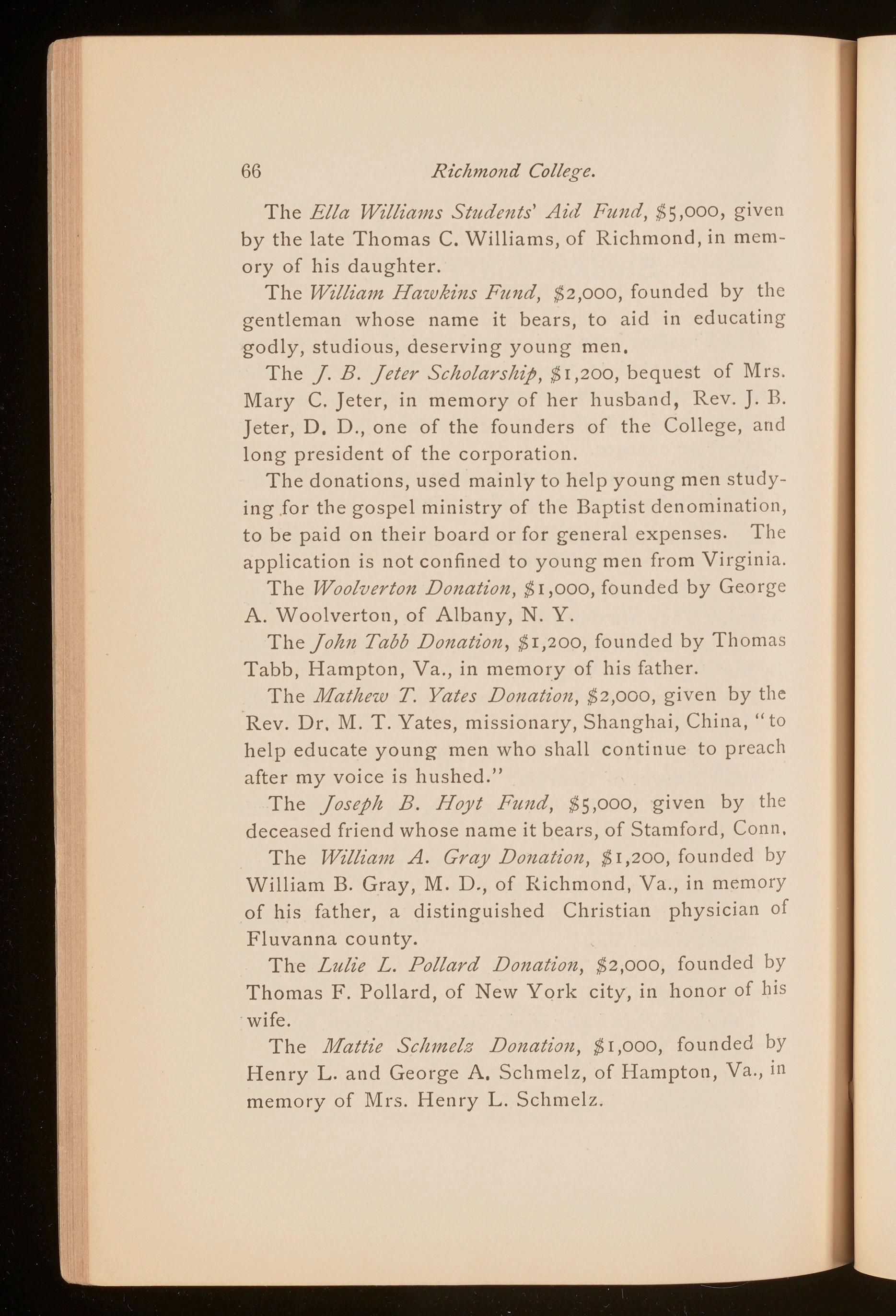
66 Richmond College.
The Ella Williams Students' Aid Fund, $5,000, given by the late Thomas C. Williams, of Richmond, in memory of his daughter.
The Willz"am Hawkins Fund, $2,000, founded by the gentleman whose name it bears, to aid in educating godly, studious, deserving young men,
The J. B. Jeter Scholarsltzp, $ r ,200, bequest of Mrs. Mary C. Jeter, in memory of her husband, Rev. J. B. Jeter, D, D., one of the founders of the College, and long president of the corporation.
The donations, used mainly to help young men studying for the gospel ministry of the Baptist denomination, to be paid on their board or for general expenses. The application is not confined to young men from Virginia.
The Woolverton Donation, $ I ,ooo, founded by George A. Woolverton, of Albany, N. Y.
The John Tabb Donatz"on, $1,200, founded by Thomas Tabb, Hampton, Va., in memory of his father.
The Mathew T. Yates Donation, $2,000, given by the Rev. Dr, M. T. Yates, missionary, Shanghai, China," to help educate young men who shall continue to preach after my voice is hushed."
The Joseph B. Hoyt Fund, $5,000, given by the deceased friend whose name it bears, of Stamford, Conn,
The William A. Gray Donation, ,Sr,200, founded by William B. Gray, M. D., of Richmond, Va., in memory of his father, a distinguished Christian physician of Fluvanna county.
The Lulie L. Pollard Donation, $2,000, founded by Thomas F. Pollard, of New York city, in honor of his wife.
The Mattie Sclzmelz Donation, $r,ooo, founded by Henry L. and George A, Schmelz, of Hampton, Va., in memory of Mrs. Henry L. Schmelz.

All of these donations have conditions attached, which are filed with the bonds, for the guidance of the Trustees.
The committee in charge have general instructions, in making their award of all Aid Funds, to give the preference-
First. To applicants already at College who have maintained a good standing both in character and study.
Secondly. To other applicants who shall present satisfactory testimonials from the school last attended, or from other persons who have had opportunity to judge, certifying to their health, attainments, habits of study, and moral character.
Tit£rdly. To those of either class who give reasonable assurance that they will complete a course of study leading to one of the degrees of the College.
The recipents of aid are expected to prove, as students, not only above censure in all respects, but actively helpful to the College by example and by earnest work.
The awards will be at all times subject to revision by the Trustees, who reserve the right to withdraw the privilege on account of neglect of duty, serious misconduct, or failure to maintain an average standing of at least seventy-five per cent. in three schools.
These Aid Funds are awarded annually by a committee of the Trustees, which meets the first week in July. Applications for aid should be made to the President of the College, who will send blank forms to be filled up and returned.

CL.ASS SC:E-:lEDULE, SESSION 1897•'98. 8:30 8:45 9:40 10:35 11:30 12:20 1:10 2:00
Phys., Jun. Latin, Int. Greek. Subj. English, Sen.
Math., Sen. Math., Jun.
Math., Subj. English, Jun. English, Int. Latin, Jun. Greek, Jun.
Greek, Sen. Chem. German, Sen. French, Jun. German, Jun Phil., Sen. English Bible. Math., Int. English Bible. ii
MONDAY ......... Latin, Subj. Phil., Jun.
English, Sen.
Phys., Sen. Greek, Subj. liJ
Math., Jun. Phys., Jun. Greek, Int.
Phil., Jun. l\Iath., Subj. English, Jun.
English, Int. Latin,Jun. '"' Greek, Jun.
TUESDAY ........ 11) Latin, Subj.
Latin, Sen. Geology. French, Sen. French, Jun. German, Jun. (,j History. Math., Int. liJ
Math., Jun. Phys., Jun. Latin, Int. Latin, Jun. Latin, Subj. Math., Subj. English, Jun. Greek, Subj. German, Jun.
Math., Sen.
Phys., Jun. Greek, Int. Greek, Subj. English, Sen.
Math., Jun.
Phys., Sen.
WEDNESDAY ..... Phil., Jun. English, Int. liJ Greek, Jun. Greek, Sen. Chem. German, Sen. French, Jun, Greek, Int. History . Phil., Sen. English Bible. English Bible. ..: < i
THURSDAY ...... 0 Latin, Subj. Phil., Jun. l\Iath., 8ubj . English, Jun. English, Int. Latin, Jun. .. Greek, Jun.
Latin, Sen. Geology. French, Sen. French, Jun. German, Jun.~ !-. History. Math., Int. 0 ,. Math., Sen.
Phys., Jun. Latin, Int. Greek, Subj. English, Sen. liJ Math., Jun.
FRIDAY ......... = Latin, Subj . Phil., Jun Math., Subj. English, Jnn. English, Int. Latin, Jun. ,11 Greek, Jun. Greek, Sen. Chem. German. Sen. French. Jun. German, Jun. History. Phil., Sen. English Bible. Math., Int. English Bible.
Phys., Sen. Latin, Sen. Phil., Sen. Greek, Int. Latin, Int. Geology. French, Sen, German, Sen . :NOTES.
I. Some of the smaller classes may be moved to suit special cases. II. Four hours a week additional will be assigned by Profossor of Chemistry for laboratory work. III. (;lasses in Law meet from 5 to 6 Rnrl from 6 to 7 in the afternoon. IV. The class in English Bible meets in two sections, the course being the same in each section.
SATURDAY .......
The intermediate examinations begin Monday, January 31st, and close Monday, February 7, 1898. The final examinations begin Saturday, June 1 Ith, and close Saturday, June 18, 1898. Recitations are suspended during the period of examinations. The dates in brackets indicate the time of the final examinations. Classes not here provided for will be assigned a suitable position in the schedule.
Monday, January 31 . [Saturday,June 11] .•
Tuesday, February 1 [Monday, June 13] ..
Wednesday, February 2 .. [Tuesday, June 14] ...
Thursday, February 3 .• [Wednesday, June 15] ..
Friday, February 4 .• [Thursday, June 16].
Saturday. February 5 . [Friday, June 17] ..
Monday, February 7 . [Saturday, June 18] ..
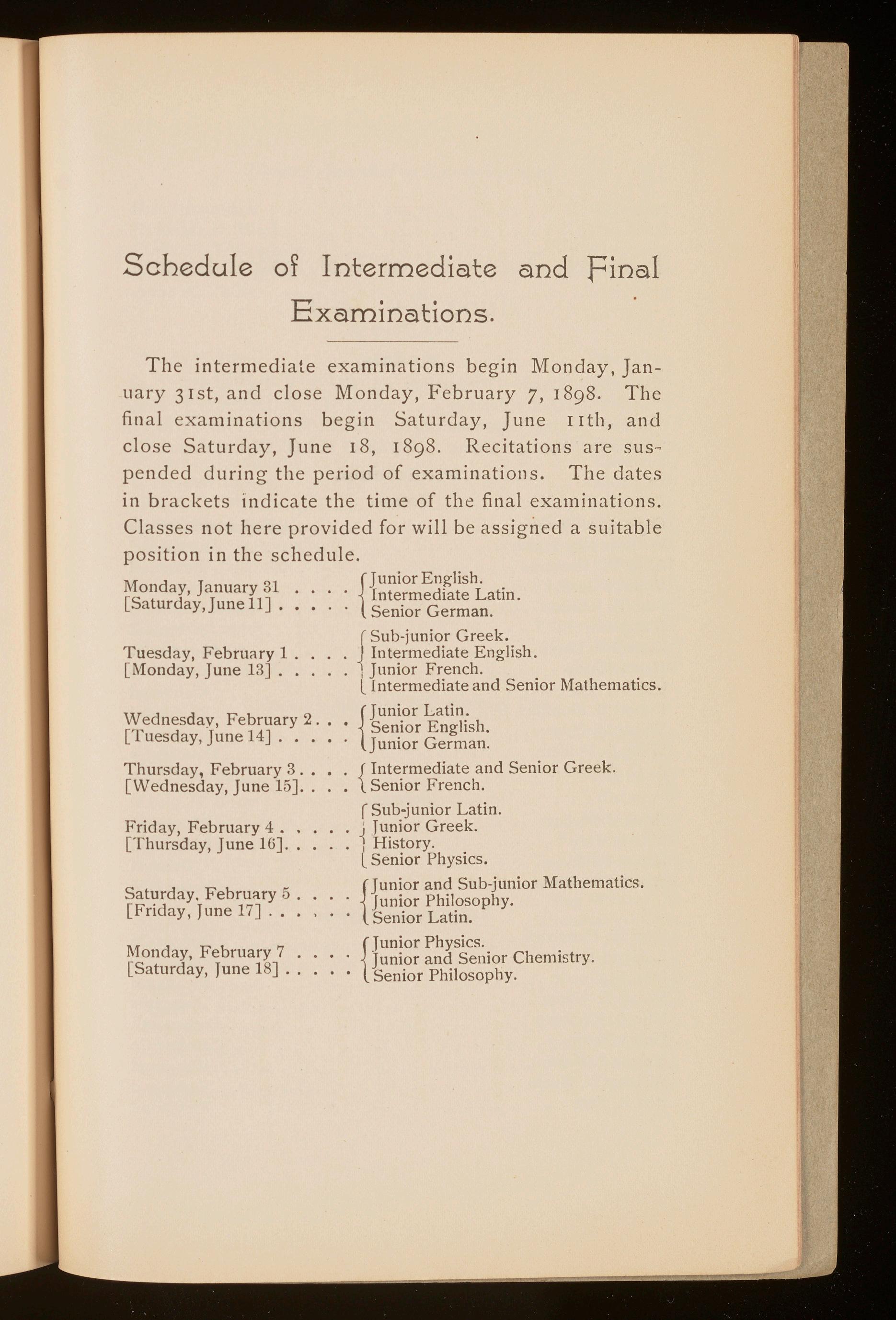
{ Junior English. Intermediate Latin. Senior German.
JSub-junior Greek. Intermediate English. Junior French.
l Intermediate and Senior Mathematics.
{ Junior Latin. Senior English. Junior German.
{ Intermediate and Senior Greek. Senior French.
rSub-junior Latin. Junior Greek.
, History.
LSenior Physics.
{ Junior and Sub-junior Mathematics. Junior Philosophy. Senior Latin.
{ Junior Physics. Junior and Senior Chemistry. Senior Philosophy.
Honors Awarded at CoIT?mencement, June 24, 1897. ltledals.
"WooDs" MEDAL-Declamation . SAMUEL P. DEVAULT, Tenn
"STEEL" l\IEDAL-Reading ..•• SAMUEL P. DEVAULT, Tenn
"CRUMP" PRIZE-Mathematics, B. 0. HUTCHISON, Prince Wm. Co
"TANNER" MEDAL-Greek .. ROBERT E. LOVING, Fluvanna Co Proficients. French.
Eugene L. Carroll . • Richmond College
W. Brownley Fo,ter • Richmond
Allan W. Freeman. . ... Richmond
Edward Garlick . . . . Richmond
John E. Johnson • • . Isle of Wight Co
J. Day Lee. . . . . . . ... Richmond
Lynton B. Lloyd .
Henry l\Iartin .
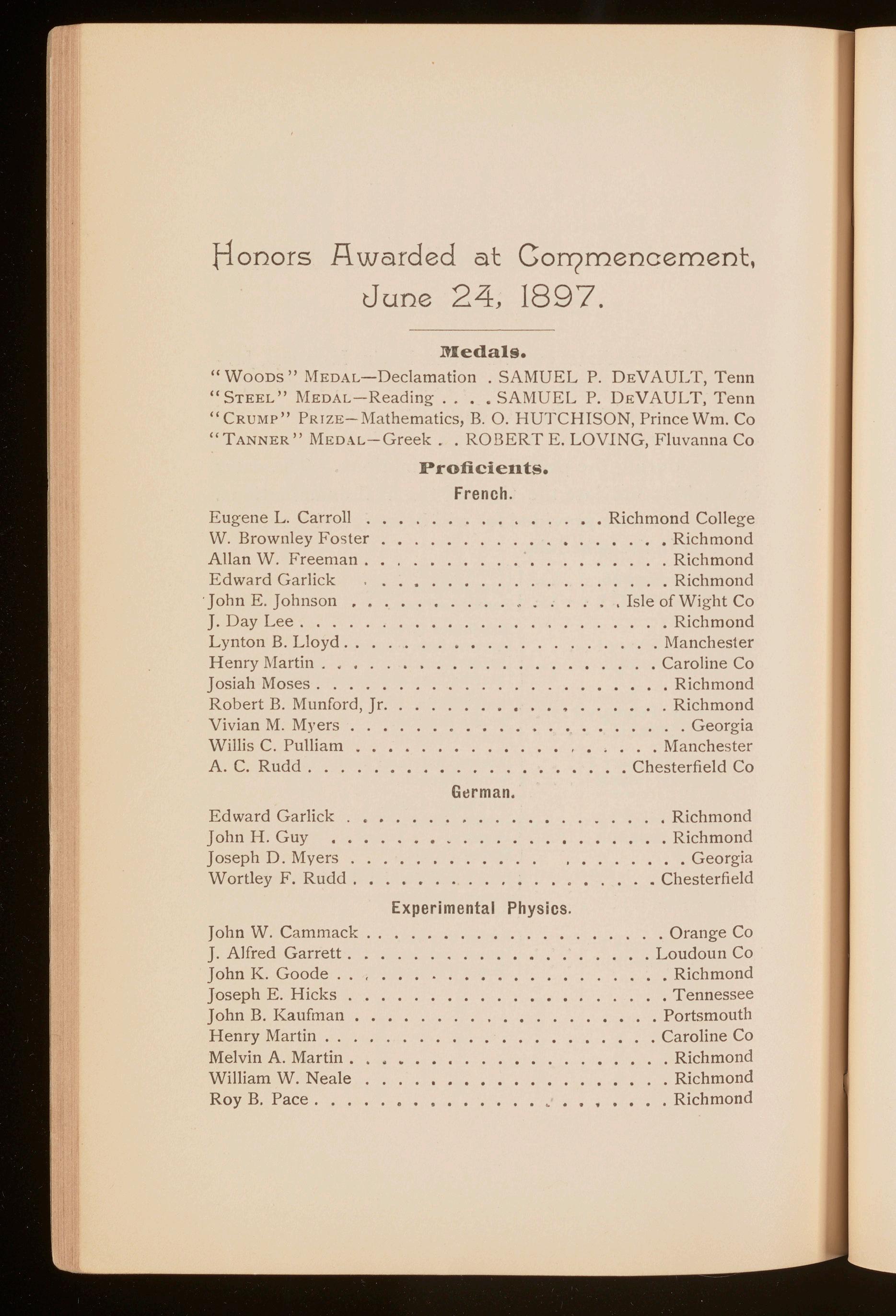
Manchester
Caroline Co
Josiah Moses. . . . . . Richmond
Robert B. Munford, Jr. ....... , .••...•.. Richmond
Vivian M. Myers .
Willis C. Pulliam
A. C. Rudd .
Edward Garlick .
John H. Guy
. Georgia
Manchester
Chesterfield Co German.
Joseph D. Myers . . .... .
Wortley F. Rudd ....•........•
Experimental Physics. . Richmond . Richmond . . Georgia . Chesterfield
John W. Cammack . . . .. Orange Co
J. Alfred Garrett. . Loudoun Co
John K. Goode .. , . . . .. Richmond
Joseph E. Hicks . . . . . .. Tennessee
John B. Kaufman • . . . . . . . . . •
Henry Martin . . .
. . . . •.. Portsmouth
Caroline Co
Melvin A. Martin • . Richmond
William W. Neale . Richmond
Roy B. Pace . . . . Richmond
Berry Stainback . . . .
Honors Awarded at Commenceme1d. 71 . Richmond
Benjamin H. West ...
Calder T. Willingham ..
William T. Wingfield . .

Richmond
Richmond
Adon A. Yoder . . . . Charlottesville ....... Lynchburg
Criminal Law.
Claude M. Dean . . .
..•. Petersburg
J. Murray Dill . Richmond
Leslie H. Drew .
Richmond
James T. Gatewood, Jr ..........••.. . Hanover Co
John R. L. Johnson ............. Nansemond Co
Alexander S. Lanier . . . . . . . . _ Richmond
J. Herbert Mercer. .•. Richmond
William T. Mooklar . • . . . King William Co
Herbert L. Norfleet. . Southampton Co
Malvern H. Omohundro Radford
George N. Skipwith . Richmond
George P. Stacy . • . . . Richmond
James R. Stafford . . Giles Co
Thomas Temple
Vollie Vaiden
Arthur B. Van Buren. •
Prince George Co
. King William Co
. Richmond
Constitutionaland International Law.
Albert 0. Boschen. . . . . . . . .... Henrico Co
Cary P. Carr
Claude M. Dean .
Leslie H. Drew
Richmond
Petersburg
. Richmond
James T. Gatewood, Jr ................. Hanover Co
John R. L. Johnson ............•... Nansemond Co
Charles P. Jones, Jr. . . Highland Co
Alexander S. Lanier . Richmond
William T. Mooklar . . •.....• King William Co
Herbert L. Norfleet. . Southampton Co
Malvern H. Omohundro Radford
George N. Skipwith • . . Richmond
George P. Stacy . . . Richmond
Jam es R. Stafford .
Thomas Temple
Vollie Vaiden
John C. Weckert
Abraham I. \Vein berg
. . .. Giles Co
. . . Prince Geor 6 e Co
King William Co
. ........ Henrico Co
Richmond
72 Richmond College. Evidence.
William E. Crawford . . Richmond
J. Murray Dill . . . Richmond
Leslie H. Drew . . . . . Richmond
William D. Gay . . . . Richmond
John R. L. Johnson ................ Nansemond Co
Alexander S. Lanier . . . Richmond
Herbert L. Norfleet . . . . Richmond
Malvern H. Omohundro .. Radford
George N. Skipwith . Richmond
George P. Stacy Richmond
James R. Stafford . . Giles Co
Thomas Temple . . . . . . . • Prince George Co
Graduates.
School of Lalin.
A. Paul Bagby • •
W. Gary Bidgood . . . . .
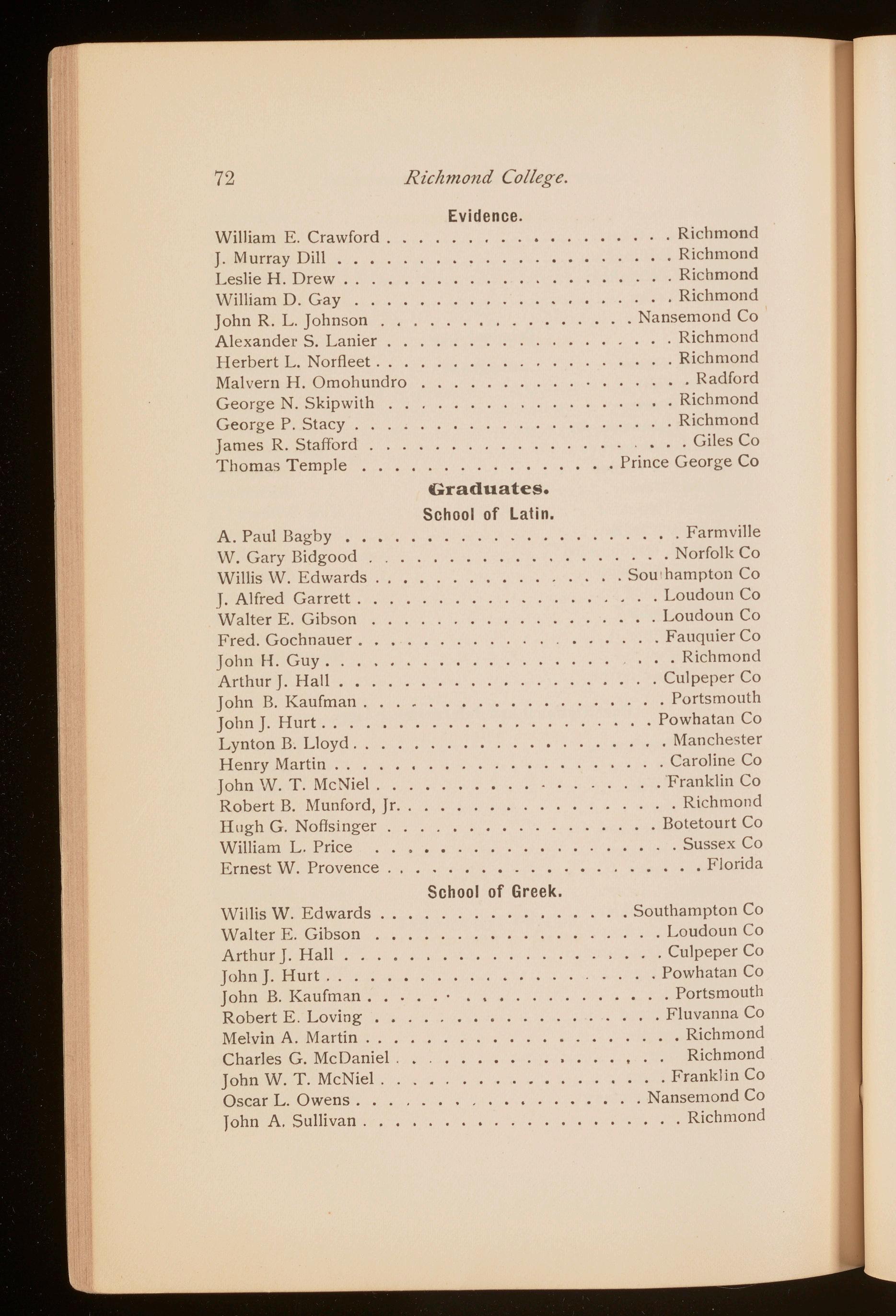
Farmville
Norfolk Co
Willis W. Edwards . Sou ,hampton Co
J. Alfred Garrett . . Loudoun Co
Walter E. Gibson . Loudoun Co
Fred. Gochnauer . . Fauquier Co
John H. Guy. . . . . Richmond
Arthur J. Hall . • . Culpeper Co
John B. Kaufman . . . Portsmouth
John J. Hurt . . . . . . . . Powhatan Co
Lynton B. Lloyd . . . . . . Manchester
Henry Martin . . . . • . . . . Caroline Co
John W. T. McNiel .......•.......... Franklin Co
Robert B. Munford, Jr. ..........•...... Richmond
Hugh G. Noffsinger . . . . • . . . . Botetourt Co
William L. Price •
. Sussex Co
Ernest W. Provence . ...... Florida
School of Greek.
Willis W. Edwards . . Southampton Co
Walter E. Gibson .
Arthur J. Hall . .
.. Loudoun Co
.. Culpeper Co
John J. Hurt . . . • . . . . . . . . . . ... Powhatan Co
John B. Kaufman ..... • .••.......•.. Portsmouth
Robert E. Loving . • . Fluvanna Co
Melvin A. Martin . . . . Richmond
Charles G. McDaniel. , ... , Richmond
John W. T. McNiel. Franklin Co
Oscar L. Owens .........••....... Nansemond Co
John A. Sullivan , ............ Richmond
Honors Awarded at Commencement. 73
School of Modern Languages.
W. Brownley Foster . . . • . . . Richmond
Edward Garlick . . . . • . . . . . . . . . . ..••. Richmond
Henry Martin
Josiah Moses . . ,
Robert B. Munford, Jr ........... .
W. Bonnie Daughtry .
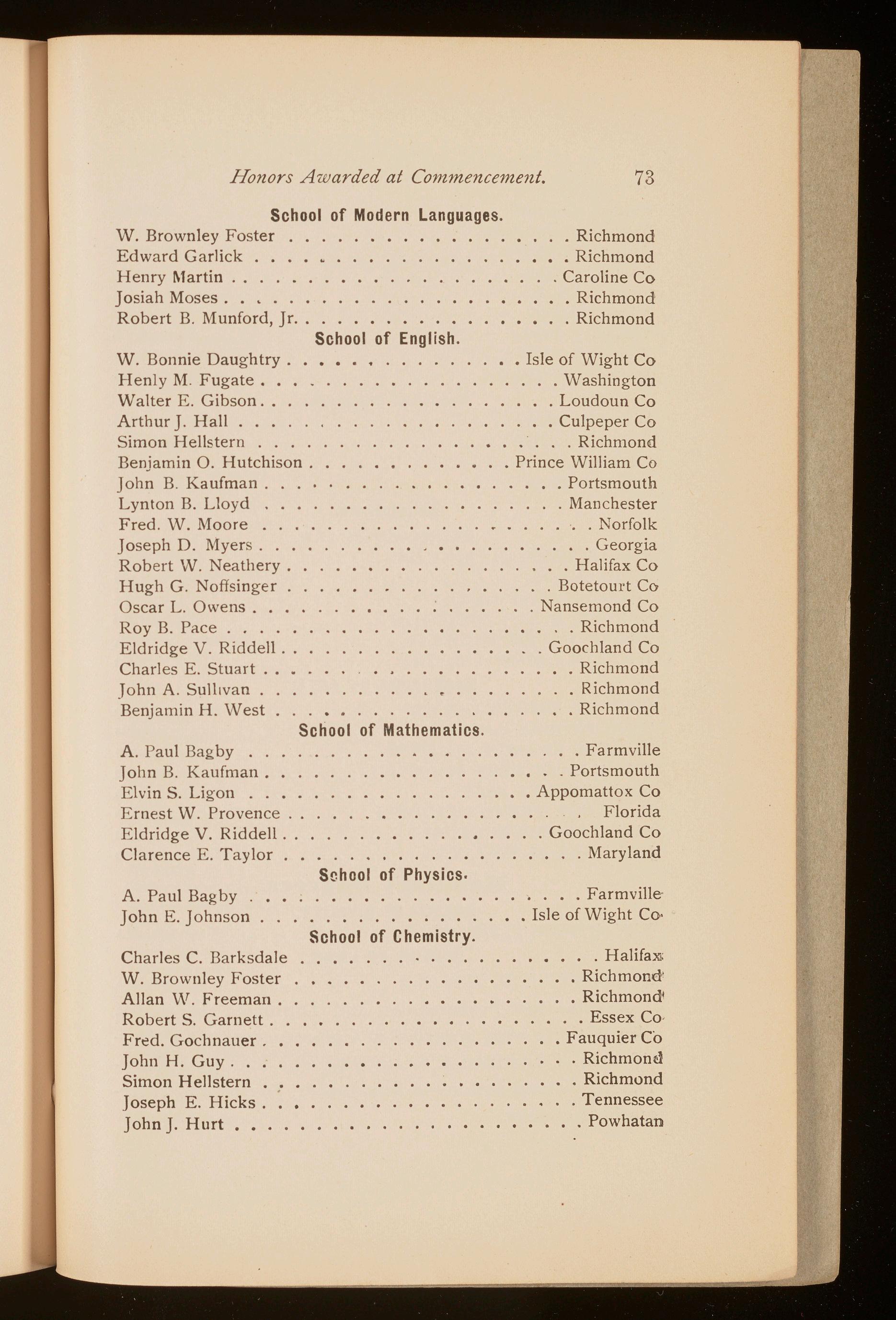
School of English. . . Caroline Co . Richmond • .. Richmond
Isle of Wight Co
Henly M. Fugate ....... Washington
Walter E. Gibson. . . Loudoun Co
Arthur J. Hall ... ................. Culpeper Co
Simon Hellstern . . . . . . . • . . . . Richmond
Benjamin 0. Hutchison .
. . • . ..••.. Prince William Co
John B. Kaufman . . Portsmouth
Lynton B. Lloyd
. . Manchester
Fred. W. Moore . . . • Norfolk
Joseph D. Myers .........•.••...•.... Georgia
Robert W. Neathery . . .. Halifax Co
Hugh G. Noffsinger ................. Botetourt Co
Oscar L. Owens .......•... : ...... Nansemond Co
Roy B. Pace Richmond
Eldridge V. Riddell. . Goochland Co
Charles E. Stuart . . . Richmond
John A. Sullivan . . Richmond
Benjamin H. West . . Richmond
School of Mathematics .
A. Paul Bagby . . . •. Farmville
John B. Kaufman. • .. Portsmouth
Elvin S. Ligon . . . Appomattox Co
Ernest W. Provence . . Florida
Eldridge V. Riddell . .
. . •.... Goochland Co
Clarence E. Taylor • . Maryland
School of Physics.
A. Paul Bagby . • . Farmville·
John E. Johnson .......•. Isle of Wight CoSchool of Chemistry.
Charles C. Barksdale .
W. Brownley Foster .
. Halifax.
.....•. Richmond ·
Allan Vil. Freeman .........•••.•..... Richmond'
Robert S. Garnett
Essex Co -
Fred. Gochnauer . . Fauquier Co
John H. Guy. . . . Richmond
Simon Hellstern • . Richmond
Joseph E. Hicks. . . Tennessee
JohnJ. Hurt . Powhatan
74 Richmond College.
Burnley Lankford
Thomas B. McAdams.
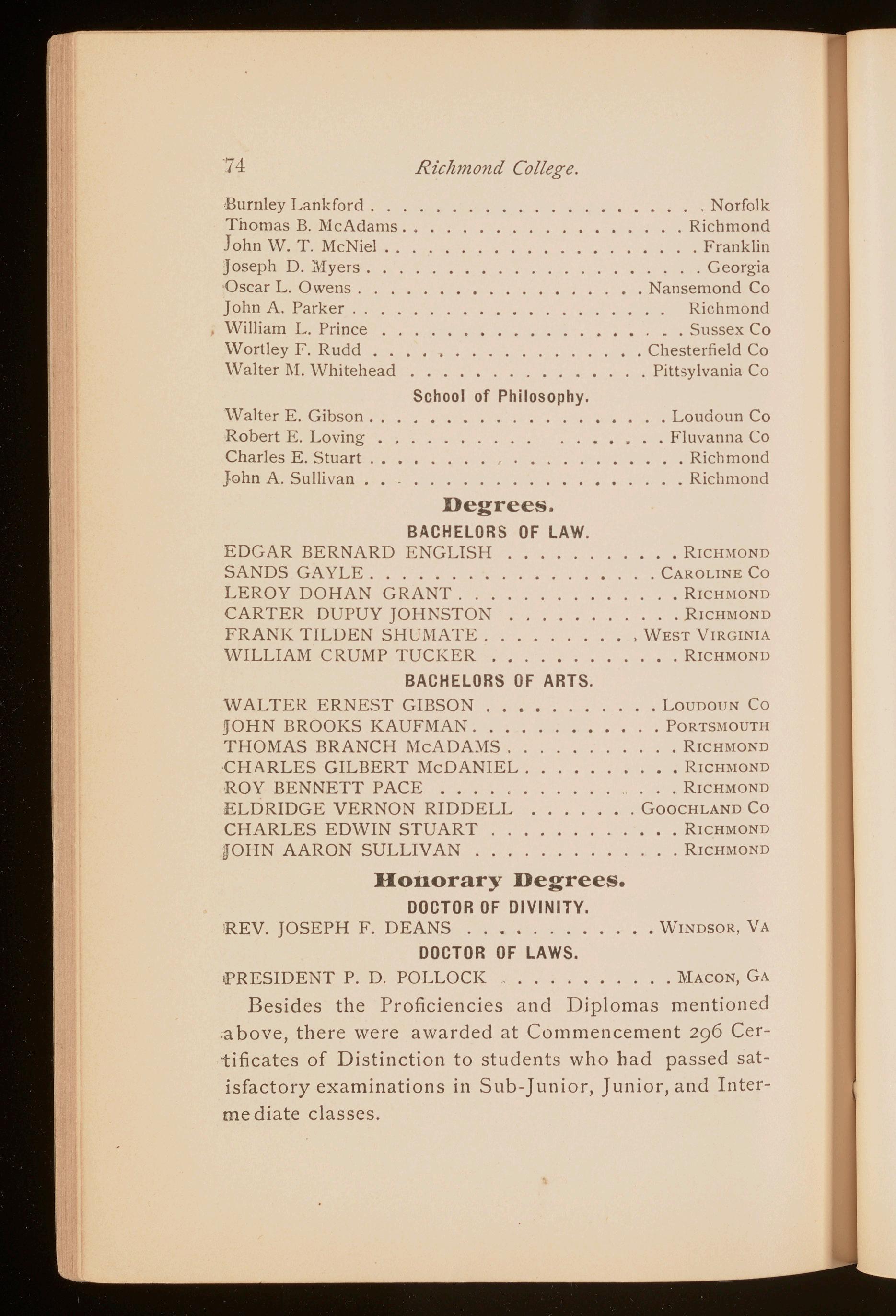
Norfolk
Richmond
John W. T. McNiel .................... Franklin
Joseph D. Myers ..................... Georgia
Oscar L. Owens
John A. Parker
William L. Prince
Nansemond Co
Richmond
Sussex Co
Wortley F. Rudd ...............•. Chesterfield Co
Walter 1\1.Whitehead
Walter E. Gibson ...
Robert E. Loving . ,
Charles E. Stuart ..
John A. Sullivan .•
School of Philosophy. Degrees.
Pittsylvania Co
BACHELORS OF LAW. Loudoun Co .. Fluvanna Co Richmond • .... Richmond
EDGAR BERNARD ENGLISH
SANDS GAYLE .
. . .. RICHMOND
CAROLINE Co
LEROY DOHAN GRANT .............. RICHMOND
CARTER DUPUY JOHNSTON ........... RICHMOND
FRANK TILDEN SHUi\[ATE
WILLIAM CRUMP TUCKER .
BACHELORS OF ARTS.
. WEST VIRGINIA
RICHMOND
WALTER ERNEST GIBSON .•••....... LOUDOUN Co
JOHN BROOKS KAUFMAN. . ..
THOMAS BRANCH McADAMS . .
·CHARLES GILBERT McDANIEL .
ROY BENNETT PACE .
. . PORTSMOUTH . RICHMOND •• RICHMOND . . RICHMOND
ELDRIDGE VERNON RIDDELL ....... GoocHLAND Co
CHARLES EDWIN STUART ........ . RICHMOND
JOHN AARON SULLIVAN
DOCTOROF DIVINITY.
RICHMOND
IREV. JOSEPH F. DEANS . . • • . . . . . WINDSOR, VA
DOCTOR OF LAWS.
,PRESIDENT P. D. POLLOCK . . . . . . . . MACON, GA
Besides the Proficiencies and Diplomas mentioned above, there were awarded at Commencement 296 Certificates of Distinction to students who had passed satisfactory examinations in Sub-Junior, Junior, and Intermediate classes.
Admission, Terms of. 6l
Aid Funds .
Alumni, Society of. . 52 Astronomy, Course in 32 Athletic Association. 51-52
Bequest, Form of. 5 Bible Study
38 Boarding Arrangements. 62-63 Calendar
Chemistry, School of. 33-35 Commencement ............................... 10, 70-74
Tr\}stees
of
of
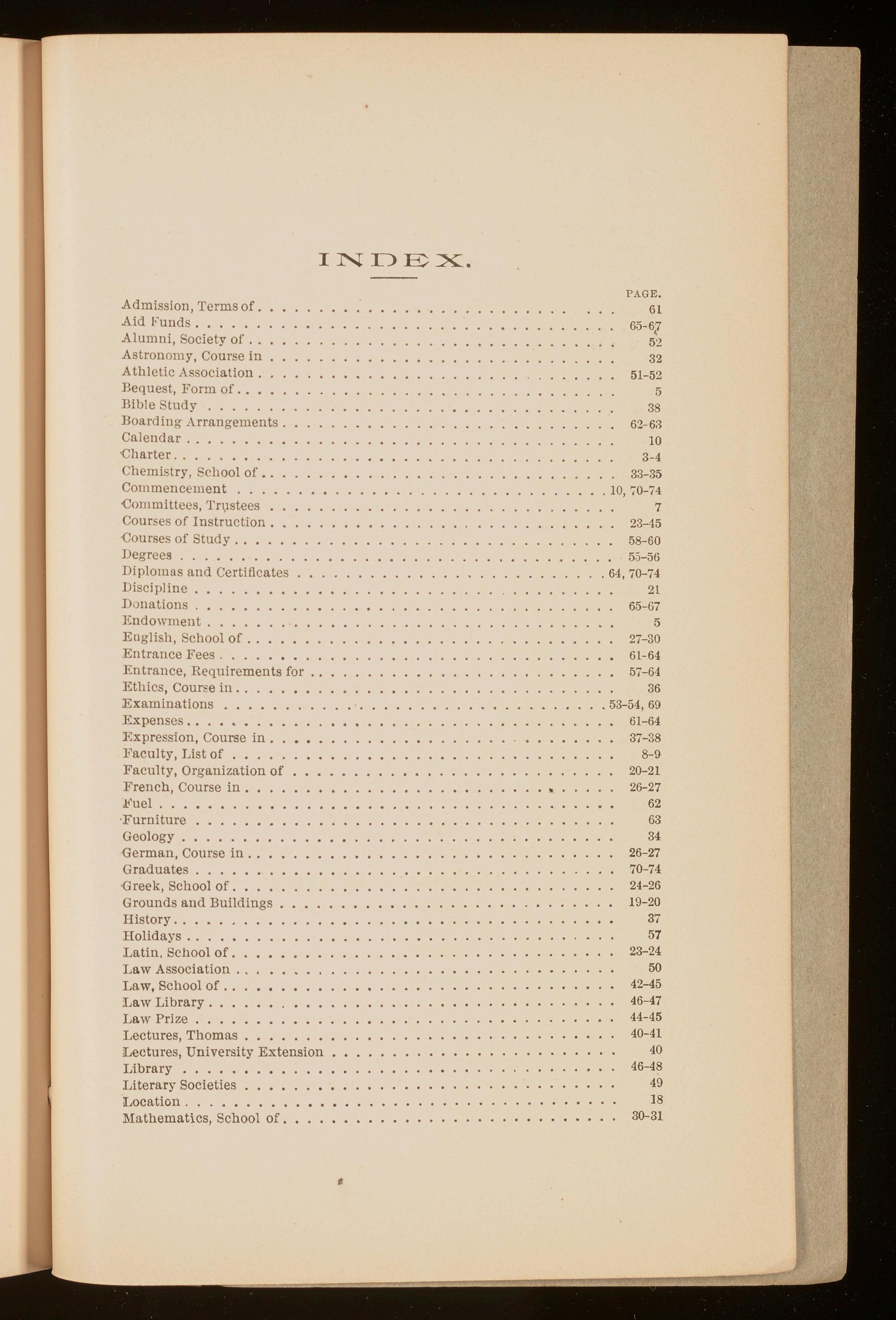
·Furniture ....
Geology
German, Course in Graduates ...•..
-Greek, School of ... Grounds and Buildings
History
Ilolidays ....•.
Latin, School of Law Association
Law, School of .. Law Library
Law Prize ...
Lectures, Thomas Lectures, University Extension Library ..... Literary Societies

Richmond College.
Mathematics , Post Graduate .•.•
Matriculation . .
Mechanics, Analytica.J, Course in . Medals •
Medallists, Society . . ..•
Mineralogy ....... .
Ministers and Candidates . Modern Languages, School of. Museum
Organization. . . . . . .
Philosophy, School of.
Physical Culture Physics, School of. . . . . :Political Economy, Course in. Portraits ....... .
Psychology, Course in . . .
Reading-Room .
Recitations Schedule of ..
Religious Exercises Reports ........ . Rooms .........
Schedule of Recitations . Schedule of Examinations Scholarships . . . Selection of Studies . Session
Societies, Literary .. Society, Geographical and Historical . Society, Mu Sigma Rho. Society, Philologian .. Society, Alumni ..... Student Aid J'unds ..•
Student Organizations .. Students, Ministerial .. Students, Recapitulation of. Students, Roll of .. Thomas Lectures . . .
Trustees ....... .
Truste es' Committee .. Tuition ...... . University Extension Y.M C.A ...•
THE CRE~T TRUNK LINE
••. BETWEEN ••• Virginia., The Sou. th pj-"'Sou. th -uuest.
PEERLESS SERVICE. SCHEDULES UNSURPASSED. , .. OPERATING
!he Most Magnificent and Elegantly-Equipped Trains, Composed of Pullman's Handsomest and Latest Compartment, Drawing-Room Sleepers, and Southern Railway Dining Cars, ,o.---=lil Wasbln!!:tnn & soutbwestern LIMITED.
Daily between New York, Virginia Cities, Florida, New Orleans, Asheville, "Land of the Sky," and Chattanooga ..
Carries Through Sleeper New York to Nashville, Tenn., where the Tennessee Centennial will take place May to October, 1891.
The Through Car Line to Nashville.
viz.: @t~ The ShortLine to Florida, Aikenand Augusta.
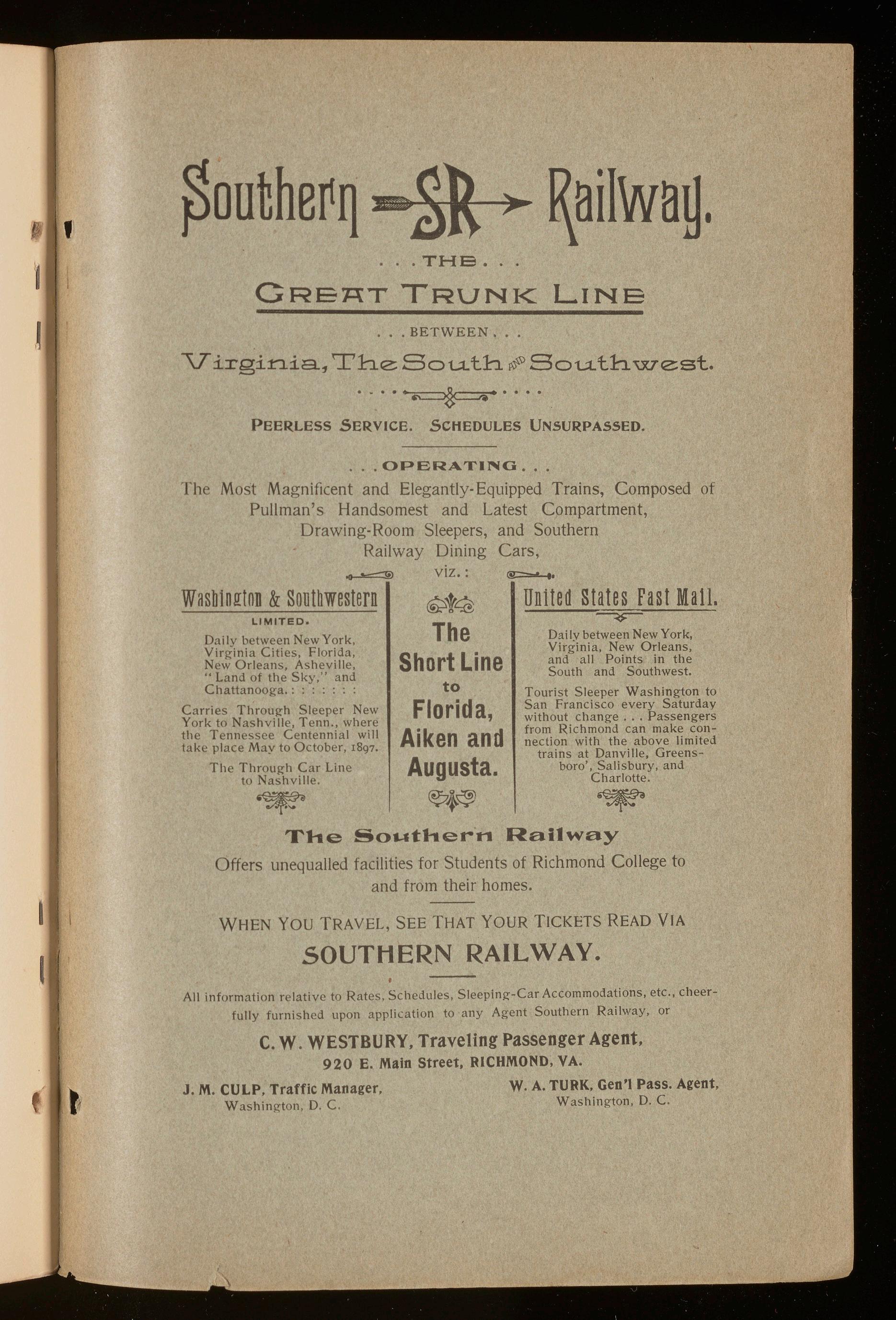
Daily between New York, Virginia, New Orleans, and all Points in the South and Southwest.
Tourist Sleeper Washington to San Francisco every Saturday without change ... Passengers from Richmond can make connection with the above limited trains at Danville, Greensboro', Salisbury, and Charlotte.
The so ....thern Railway Offers unequalled facilities for Students of Richmond College to and from their homes.
WHEN YOU TRAVEL, SEE THAT YOUR TICKETS READ VIA SOUTHERN RAILWAY.
All information relative to Rates, Schedules, Sleeping-Car Accommodations, etc., cheerfully furnished upon application to any Agent Southern Railway, or C.w. WESTBURY,Traveling PassengerAgent, 920 E. Main Street, RICHMOND, VA.
J.M. CULP, Traffic Manager, Washington , D. C W, A. TURK, Gen'I Pass. Agent, Washington, D. C
